In Nomine Superiors 3: Hope and Prophecy by Mors Rattus
Blandine
Original SA post Superiors 3: Hope and Prophecy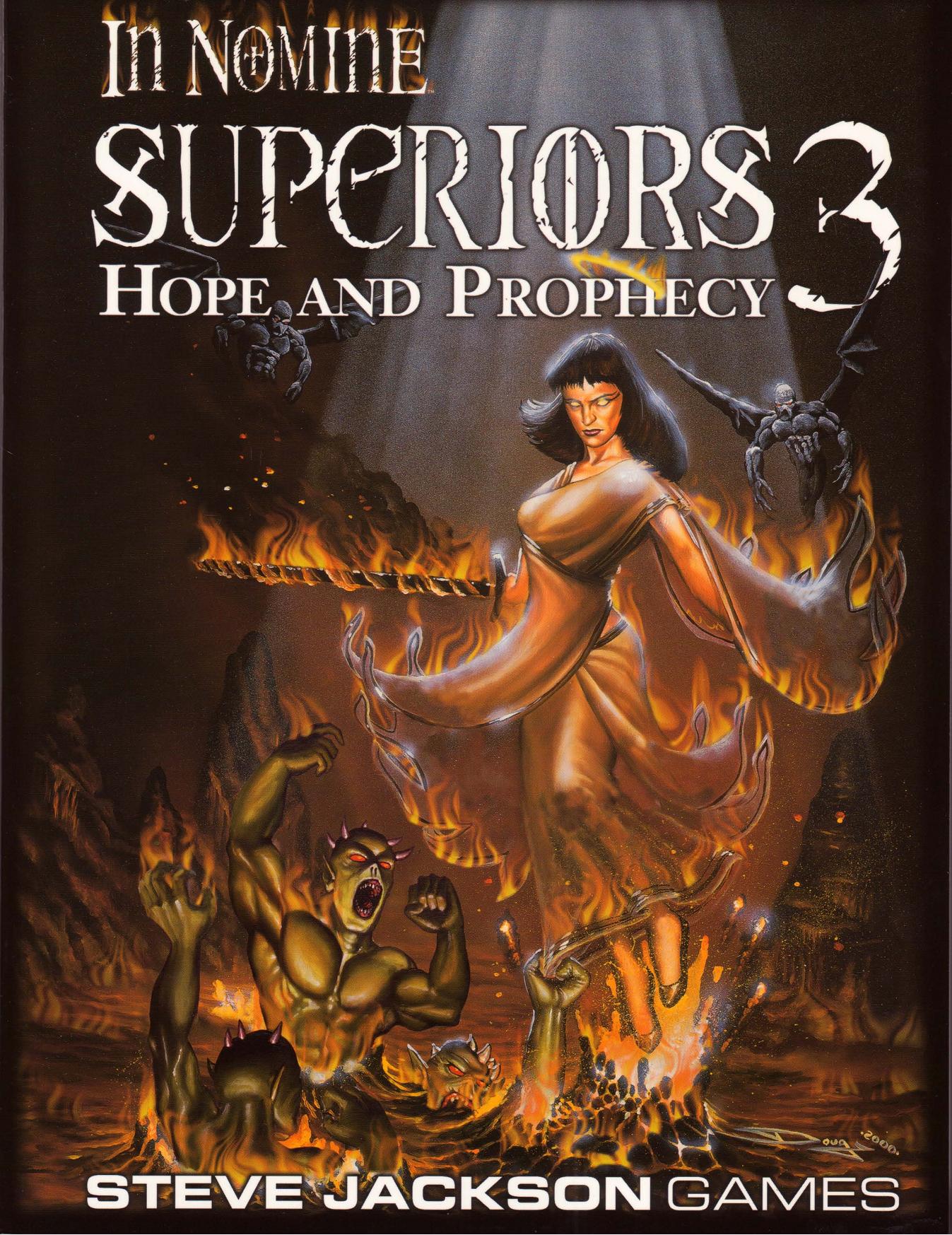
Superiors 3 covers those Heavenly Words that seem most insubstantial. While their methods differ, Hope, Fire, Faith and Destiny are all very important. Also, to note for Blandine: celestials can sleep while on Earth, as a reminder, in their vessels. This sends them to the Marches without them having to take on celestial form on Earth. Very handy.
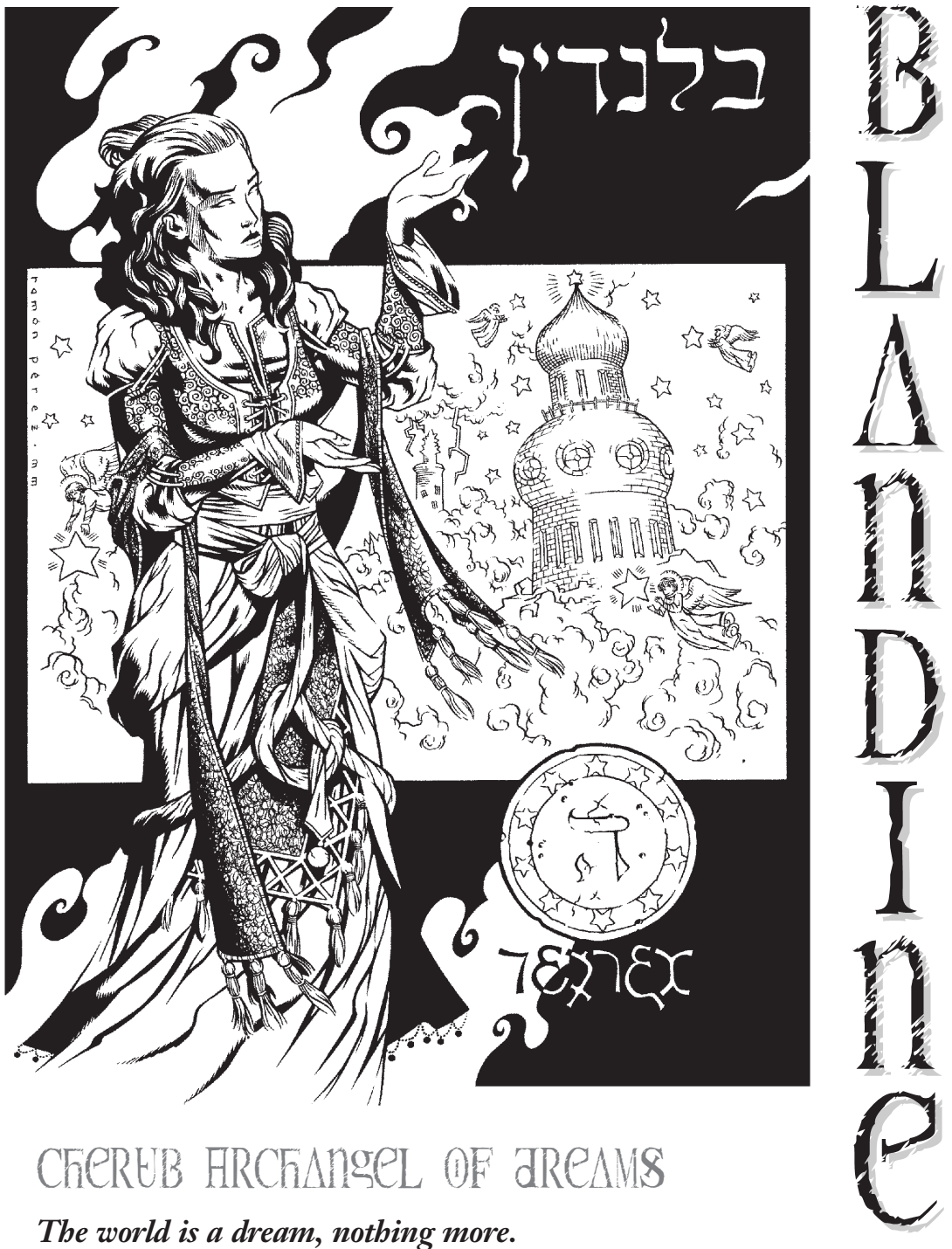
Blandine is the Archangel of Dreams, the protector of human dreamers and guardian of the Marches.
Menunum of Dreams can cause anyone they can see to have a momentary uplifting daydream at will. Menunum are a minor Choir created by Blandine, more on which later.
Bright Lilim of Dreams automatically successfully use their resonance to detect Needs on anyone in the Marches that they see, with CD of (Ethereal Forces). They may roll to improve the CD. If Blandine has redeemed any Lilim on top of the one she Redeems in the Revelations Cycle, she treats them as individuals who have denies all they knew to chase an impossible hope. If they want to work on Earth, however dangerous to their Redemption it is, they'll get it. They may not last long, but they receive fulfilling duties and while Blandine will grieve any losses, she never regrets the hopes they may have realized in her service or the hopes they passed on to others.
Bounded in a Nutshell is a Servitor attunement that allows you to spend 2 Essence to temporarily strength the barriers between corporeal and ethereal for one person they can see, for (Forces) hours. During this time, your target's attempts to make a Will roll to enter or leave the Marches has a penalty of (Ethereal Forces), though you may lift this at any time before the duration ends with a Precision roll. This does not apply in any situation in which a Will roll would not be made, except in the case of mortal dreamers, who must make a Will roll to wake up.
Dreambook is a Servitor attunement letting you create a recording of a dreamer's experiences. You must have a blank book and be physically touching them as they sleep. a record of the dream will appear on the pages of the book in the dreamer's handwriting, written in a style depending on the nature of dreamer and dream. It can also be used to record dreams onto video or other recording media, but audio or visual dreambooks can only be seen for what they are by the Symphonically aware. Normal humans will see only a video of the sleeping dreamer or a tape of soft snoring.
Dream Sight is a Servitor attunement that lets you touch a dreamer in the physical world to get a mental image of the dreamscape they're in. The GM may also allow brief glimpses at a waking dreamer's daydreams. If you are in a Tether that leads to the Marches from any realm, such as Blandine's tower or an Ethereal Tether, you can glimpse the locus of the Tether in the Marches. ?Using this attunement in any way requires all your attention, preventing any action but concentration on the vision.
Lucidity is a Servitor attunement that lets you touch a sleeping dreamer (or be in their dreamscape) and, for 3 Essence, give them lucidity for the length of a single dream. A lucid dreamer controls their own dream, needing no roll to do anything in it. Rather, success and failure is determined by their self-image. A Lucid dreamer may eject anyone in their dream at will.
Blandine's higher Distinctions grant no powers, but often come with Words.
Sentinels are responsible for intensive work. All are Wordbound angels of power, dedicated to protecting certain kinds of dreams. The most favored of these currently is the Sentinel of Dreams of Peace, who holds that Word.
Wardens of the Marches are any angels who are at least Masters and who have been given responsibility to guard a certain stretch of the Marches, keeping the peace there, finding other celestials and driving out rogue ethereals, as well as defending against demons. The Wardens of the Four Quarters are most senior, though the four cardinal directions have little relative meaning in the Marches.
Blandine can also teach the Songs of Dreams, Harmony, Sleep and Daydreams.
Expanded Rites:
1. Tell a story to a group of 10 children.
2. For 3 Essence, defeat a demon in ethereal combat and eject it from the Marches.
3. Spend 4 hours daydreaming.
4. Talk down a potential suicide.
5. For 3 Essence, enable someone to overcome their greatest fear.
6. Destroy an ethereal's vessel.
Common Dream Malakite Oaths:
1. I will serve Blandine with perfect obedience to her commands.
2. I will spend at least 6 hours a night patrolling the Marches.
3. I will honor the Sabbath Day as a day of rest, and keep it holy.
4. I will rescue those lost in nightmares.
5. I will destroy ethereals on Earth wherever I find them.
6. I will not lose my temper when there are ladies present.
7. I will not allow an enemy to escape me by fleeing into the Marches.
8. Under no provocation will I forget my manners.
9. I will spend at least 1 hour a week teaching mortals to overcome their fears.
Blandine is the most regal and aristocratic Archangel. Her voice is always sweet, grave and calm. Her sadness never leaves her, and she prefers to appear to her angels by projection, as a pale image against a dark background or a reflection in a mirror or puddle. She may also appear in dreams or in the Marches. For less urgent communication, she sends one of the Menunim. She is polite but reserved with other angels, treating them respectfully but expecting them to humbly accept their orders. Her favored vessel is a young woman, but she can appear as a woman of any race or age. She is always radiant, even in a vessel, with a sense of hope that has never gone away. She often appears to be only paying partial attention. Her angels often call her the White Lady, the Guardian of the Marches, the Queen of the Night and the Keeper of the Flame.
Dreams has two facets, as a Word. The first is literal - the trips sleepers take in the dreamscapes. The second is usually a bit more metaphorical. Hopes, aspirations and goals are all Dreams as wlel. Blandine is not judgmental - the selfish dreams of humanity must be protected as much as their selfless and noble dreams, so long as those dreams are their own and not caused by demons. The power ot manipulate human dreams is great, and Blandine refuses to see it used casually. If the War is to be won, it must be won by letting humans exercise their free will. This tends to receive mixed response from the Seraphim Council. While most Archangels agree that humans must make their own path and all agree that demonic manipulation must be stopped, some disagree strongly about selfish dreams, seeing the Host as a means to punish humans as well as shepherd them. Still, most Archangels are happy to leave Blandine to her work.
Blandine is patron to all dreamers, and she interprets Dreams to include all manner of art and creativity, as dreams given physical shape. Few humans have their own personal dream guardians, but those hwo make their deams open to others are given special priority, and most artists have an angel of Dreams watching over them. Blandine also favors the ambitious madmen of Earth. Any human that dreams of building an empire, making a nation or toppling a nation probably has an angelic dream guardian. This isn't about personal taste - these people are capable of making vital changes on Earth by inspiring others, and demons often stalk them, so her angels must keep watch.
When the universe was newly made, Blandine and Beleth were among the first angels made, and the first to love each other so deeply. God loved His creations, but they were the first to love one another, and the Host followed their example. It wwas a good time, until Lucifer led his rebellion. He believed that angels were too glorious to be mere servile tools while humans were allowed to find their own paths. His charisma and logic seperated the lovers, who had in many ways come to symbolize selfless devotion. Beleth, then Angel of Fear, worked alongside Blandine to mold humans of great potential and help them advance. Their work, Fear and Dreams, seemed a single thing in two aspects. At first, Blandine didn't even suspect Lucifer. She watched from a distance, but nothing seemed wrong. Beleth listened to him, and had always been the less aggressive and more pessimistic of the pair, more fragile and insecure in her understanding of Fear. Blandine lacked the sense of failure Beleth provided her, and Beleth needed her reminder of the possibility of success. Lucifer used this against her.
Lucifer told Beleth that her fear came from wielding her Word incorrectly, that she was too soft and influenced by Blandine. Blandine envied her, Lucifer said, which is why humans they worked with overcame their fears. Lucifer inspired Beleth to hate humans and resent her lover. Blandine tried to convince Beleth she was being manipulated, but Beleth took it all as jealousy, and in many ways it was. By the time Blandine approached other angels for help, the Rebellion had begun and Beleth was out of reach. The Fall was a millenia ago, but Blandine feels the pain and frustration of the loss as if it happened the morning before. Beleth's tower, visible across the Marches, is a constant reminder of her loss.
It is said that on the first Sabbath, all of Creation rested, and the first dreamscapes appeared in the Marches. To those angels preferring Biblical literalism, this is when Blandine was given her Word.
After the fall, it is said that Blandine walked from her tower to Gabriel's Cathedral - the first time she'd left it since Beleth's final assault and challenge, when she had refused to exit and fight. In the Citadel of Fire, she rubbed her face and arms with ashes, mourning and begging Gabriel to loan her a spark from the heart of Fire. When asked what use she'd have with it, she said simply that Beleth and a third of the Host had turned to darkness. When they wanted to return, they would need a light to guide them home across the Marches. Gabriel gave her the flame, and Blandine carried back to her Tower, setting it in the great lamp that shines from its peak even now. Others say that Gabriel even gave her his own Heart to use as the source of the Tower's light.
Blandine was responsible, it is known, for the first Redemption, though she claims God showed what must be done. All of the ancient Archangels remember the time she brought this new Cherub to the Council, demanding silence that he might recount his own tale. Even Michael admits that this was the moment when the Archangels realized that the Fallen were not lost forever. This is when any Peace Faction of Heaven was formed, and while Blandine played no part in politics that followed, she admitted to her closest allies that she had asked God to tell her if all her hopes were in vain. In that same day, Oresto, the first demon to be Redeemed, collapsed at the base of her tower.
It has long been suspected that, despite her assurances, the Archangel of Dreams accepts the service of a few ethereals, those friendly to humans willing to aid Heaven, and even allows them on Earth. Some say these allies included unicorns, minor gods converted to Christianity or Islam and even a dragon, who is said to be the greatest living dragonslayer of all time.
Those that work with Blandine rarely deal with her directly. She is solitary, keeping herself engrossed in hopes and dreams. Most see her as well-versed in her power, which is true, and humble, which is also true, but also busy in order to keep herself from thinking about her own feelings. She is too genteel to show her pain publically, and has instead closed herself up and become aloof. Despite her lingering pain, Blandine remains optimistic about humanity and takes her part in the War seriously. Her moods can be contradictory, running from Pollyanna to grim self-absorption. She is determined to help every human she can experience their dreams to the fullest, finding their potential and true happiness, but she herself smiles only rarely and never deeply. Blandine believes that human dreams are the key to everything, that their hearts carry the solution to all problems. How she will behave toward anyone is determined by her closeness to them. To her angels, she is kind but brief, giving more commands than compliments, though when she does give rewards, they are great ones. To her few friends, she is warmer, allowing both her optimism and weariness to show.
Next time: Dreams of Dreams
Every second of the night, I live another life
Original SA post Superiors 3: Every second of the night, I live another lifeDespite having seen the Fall and the war in Heaven, Blandine still believes. She knows th the War will not last forever, the Evil will be defeated, that the Fallen will return, that light will win over darkness. Even if these ideals seem delusional or futile, she cannot let go of hope. If no one hoped, the War would be over before it began. If even one person dares to dream of better things, then anything is possible. Even Beleth's return.
Blandine's top priority is to protect the six billion human souls that come to her by night. She is among the most ancient Archangels, and she's out to end the War and return humanity to pursuing its dreams without interference. She heads one of the largest networks of angels out there, and one of the least visible, plus her human servants and soldiers. She guards the border with the Marches, as well, to keep the ethereals still angry over the Purity Crusade from attacking either Heaven or invading Earth. Every night, he angels work to exhaustion to war with the demons of Nightmares in the dreams of humanity. Usually this has been a subtle and strategic conflict with little direct battle...until recently, when Beleth has been attacking directly. Blandine believes that Beleth is trying to force her to a more militaristic bent, but she won't take the bait, despite her heavy losses from it. Instead, she is working twice as hard to influence dreams., It's a tricky battle, and if either side could gain significant advantage, it might tip the balance of the whole War. Currently, though, Dreams and Nightmares hold each other in check.
Blandine is one of the oldest angels, and despite the Fall and all since, she cannot bring herself to hate God. She loves God and would do anything to help His plans for the world, even if it put her soul on the line. Night after night after night, she does exactly that. No other Archangel, either, hates Lucifer so coldly, stubbornly or personally as Blandine. Lucifer stole Beleth from her and turned the two against each other solely for politics. He betrayed his own dreams and those of mortals yet unborn. Blandine is beyond jealousy now, but her hatred endures.
Humans are closer to Blandine than anyone could grasp. She knows the millions who dream of food in their starvation. She knows the hopes and fears of the children who die in the gutter. She knows the ideals of those in high places and the selfishness of lovers. She knows the hopes that allow humans to rise above themselves, and each of them is a tiny prayer with the potential to bring them closer to God. In dreams, she knows, is the hope for everything. She doesn't see all mortals as equals, however. Some are more important, particularly the artists, writers and idealists who can communicate their dreams to others. Humanity is a vast tapestry, and the brightest and most talented dreamers shine within it, illuminating the rest. She focuses her efforts on these mortals. However, Blandine also opposes any intervention in mortal affairs. Celestials should not interfere on Earth, she believes, save to fight infernal forces. Yes, there are many places and times where you want to prevent pain and suffering but that isn't your job. Mortals have to live their own lives, and only by night, in dreams, can the angels of Dreams act, warning their charges, helping them, healing those sick in the spirit, but even then, their mortal charges must live for themselves.
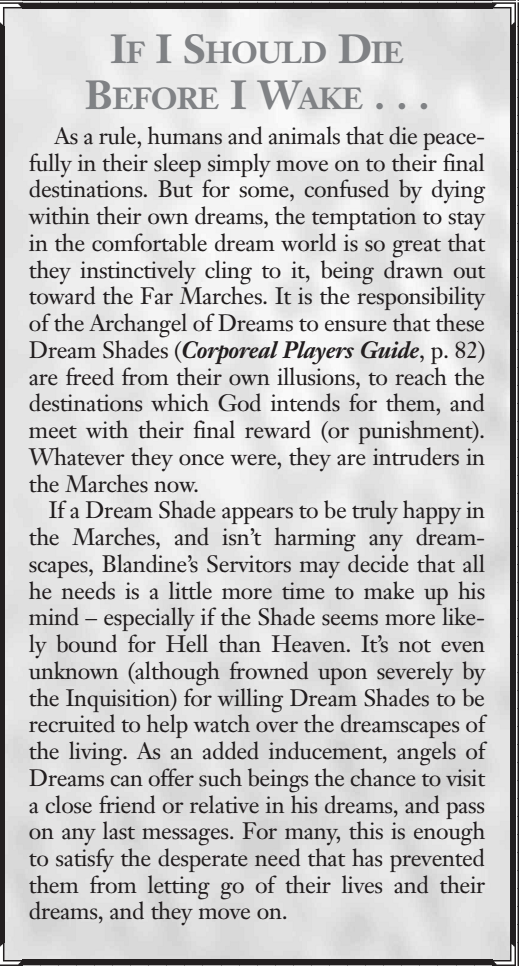
Blandine hates fighting, but she believes the War is a moral imperative. The moral part of the War is at least as important as the results of most minor battles, because it is human hearts and souls that are the battleground of the true War. She is determined not to fail and to protect humanity from the evils promoted by Hell. More and more, the Earthly War is just an abstraction for her. Her fight with Beleth is her world, and she hates the conflicts that directly interfere with humanity, disapproving of the unsubtle tactics of most of the more warlike Archangels.
Before the Purity Crusade, some ethereals were almost friendly with Blandine. Now, only a very, very few are. More hide in the Far Marches or in Beleth's side of the Vale of Dreams, resenting humans and the angels that guard them. Blandine despises those ethereals who stalk the mortal world for malice or mischief, and she acts as needed to protect her Merches from them, as she would any intruder. Humans were not meant to interact with dreams made flesh, even if the ethereals have no intention of stealing Essence, perverting true believers or treating humans as toys. Blandine understands more than any other the harm they can accidentally cause.
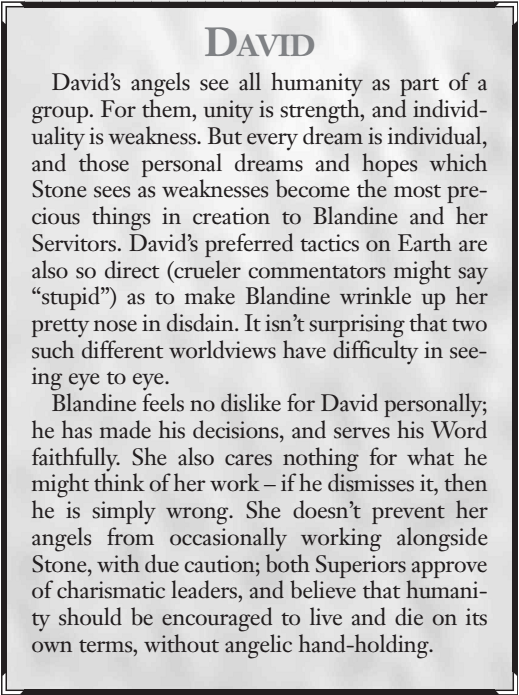
Blandine is one of the least political of all angels on the Council, keeping her methods and plans to herself. She will very rarely take action or speak out against the more violent factions of Heaven, particularly Michael, but she she normally stays silent and vigilant in the Marches.
Superior Opinions posted:
David: I fear that the pain of Beleth's loss sometimes clouds her perceptions. Her hostility toward me has not yet exhausted my patienced. After all, some trials take years to work through, and some take eons.
He is brave and strong, but there is so much more to life than strength and bravery. His dreams are as dull and barren as any stone.
Dominic: Innocence and guilt bubble up in the surface of the dreamscapes; I make regular visits to the Marches. Blandine serves her station with skill and dedicated concern. Her judgment is sharp, and her methods effective.
Dominic amuses me. He has spun his political webs for so long that he has become like a fat little spider waiting for flies, instead of a shining angel of Heaven.
Eli: Hey, she's great. No, really. She stays out of the bickering. She dedicates herself to helping humanity bridge the gap between what they want to be and who they are . And who they want to be with. That's an important dream, the best. Her Word embodies a point that a lot of angels miss... It's okay to be motivated by what feels good. It's a damned shame about Beleth.
I have learned a lot from Eli, and he is a good friend. He sees something wonderful in every part of Creation; and he understands that it's necessary to rest and take stock, and take pleasure in the glorious things that God has made.
Gabriel: I liked her, I think. I think she has visited me recently, in another guise. She sparks fires, and fans embers to flame. Yes, I'm sure I liked her...
She has a great Dream, but I fear that it has consumed her...I've tried reaching out to her, but don't know if I ever penetrated her madness to the hope I know lies within. She can be destructive, dangerous, insane. Still - every child fears the dark, and she does bring Light...
Janus: Her Word is so unreal...I love it, the power it has. In the Marches, the humans are free to fly from truth to truth and splip through walls and over mountains in the blink of an eye. She does a good job.
His nature can be very close to mine. He "inspires" quite literally, acting as the breath of God, scouring away the old and heralding the new. He understands that we must indulge wild flights of fancy, for who knows where they might lead?
Jean: She gives a little too much, a little too quickly, to those who send her their entreaties... And she encourages a kind of false optimism, I think. She is valuable to us, but in a way that is so far afield of my own work that it's probably best that she keeps her distance from us the way she does.
Jean sees life as a linear progression from A to B, and will trample over anything which stands in his projected path. While he persists in trying to direct the human heart instead of understanding it, he iwll always be fighting a losing battle to hold back the tide. He meddles too much.
Jordi: Animals dream too... And Blandine doesn't ignore them; she tends to them as vigilantly as to the humans. I've seen her bring peace to beasts in pain, even if it had nothing to do with the War in a way that the Council recognizes.
The dreams of animals are pure and honest. Jordi is always true to his own nature, and the trust that has been placed in him. His animals remind us all that the humblest insect is as much a triumph of God's creation as we.
Laurence: She is the general on the broadest beach-head of the human soul. I let her do what she does best; she always. always comes through for us. Sometimes we fail her , and I regret those times deeply.
His influences on men shapes more dreamscapes than he knows. Some of them aren't on my side of the Marches, but Yves trusts him, and I trust Yves. I prefer him to Uriel.
Marc: Well, people are going to dream about money whether Blandine is overseeing the Marches or not. She keeps Beleth in check, and that's about all.
He has taken his Word and turned it into greedy bean-counting; and because the mortals seem to enjoy this, it is apparently a great success . But the War is not a balance sheet, and we are fighting for greater things than the bottom line.
Michael: Is it really a good idea to quell the fears of mankind in a world of false imagery? How does that prepare them? I often wonder if Nightmares aren't better for our cause; I'd like to see Blandine take the initiative to control the entire realm of Dreams. Contentment isn't an attribute of a good soldier.
So many humans dream about a warrior or champion to protect them. This is Michael's role, and I must admit he serves it well, though he often acts in a more brutal manner than I find appropriate.
Novalis: She's a friend, a good one. She's one of the few that really gets it - that violence isn't the way to win hearts, and that it's hearts we're trying to win. We don't see each other as often as we used to, but whenever I get a chance to visit her, she always makes me feel welcome.
A dear heart, and a gentle soul. I used to speak with her ofteni n the past. We agree about so many things, but I fear that humans would become complacent if all their needs were attended to by angels.
Yves: When the trouble with Beleth came, Blandine, dear friend that she is, was angry with me for not warning her. But I had, in so many ways. In every way that I could . That was a brief flash, though; she was sitll quite young, and she has since accepted the complexities of her destiny with elegance. She is one of our brightest, and I miss the days when we could talk more often.
Kind, sweet old Yves... When I was younger and understood less, I was foolish enough to be angry with him. Never since. He is a mentor and a friend, and does as much to bring the bright dreams of mankind to reality as I do.
Andrealphus: Blandine, the first proof of the folly and pain of love. I like to think that I do my little bit to make her life easier, and make some people's dreams sweeter. There are no dreams like the dreams of desire.
Because he failed Love doesn't mean that the rest of us need to. His dreams can be disturbing to mortals, either because they're nightmares or because they cause them to grow obsessive for more and more sensation.
Asmodeus: Dreams are nothing but foolish, distracting delusions. If I catch any demons wasting time in dreaming there will be Hell to pay!
He is nothing to me; there are no rules that can restrict the human spirit.
Baal: I wouldn't take her on her own home ground, but she's almost defenseless anywhere else. At least she keeps Beleth occupied, and once Nightmares gets their act together, the Marches will be the most direct line of assault for us into Heaven.
He still dreams of glory and conquest, and refuses to see that his allies are anything but glorious. But how many more mortals must suffer to satisfy his pride?
Beleth: Bitch. She's always wanted everything that I've ever had, or ever been - but those dreamers are mine . She's a weakling, who could never face any facts she didn't like. I'll see her crushed and mewling in terror at my feet, begging me for a moment's respite. And then I'll walk away, and lock her alone in the dark forever.
Oh my love, once we were like two wings on one bird, two horns on one deer, two eyes in one head. And now I am half of what I was. Everywhere I see footsteps in the sand, imprints from times which are so long ago that only you and I remmeber, and one day those shared memories will bring you back...for I will not come to you, my love.
Belial: I often dream of flames. Crackling, hissing, burning down the world. What I'd like to do is set fire to the Marches. All of it, Beleth and Blandine alike...then everyone would dream of burning. Forever.
I know the misery that he causes, echoed through the dreamscapes of those who suffer and burn. But simply being destructive in the corporeal realm does not win souls from Heaven.
Haagenti: Fluffy. Useful. People dream of stuff they want, they dream of eating more. My kind of Archangel.
Dreaming of what one hopes for is one thing, but dreams of nothing but hunger is wrong. He limits all the humans he touches. While not the most openly corruptive, he must be prevented from expanding further.
Kobal: How noble, how grand. Blandine offers more potential for cruel irony than she realizes. I hope she never does.
Scorn, mockery, ridicule. These are not the things of dreams; they belong more to Beleth than me. Kobal does not understand what his Word does to humanity and for that I cannot forgive him.
Kronos: As much as Yves, she is the true enemy. Foolish dreams have stood between more than one mortal and his fate. But her futile hopes, and the strength she gives Heaven, are draining away like water in the desert.
I hear his voice sometimes, whispering like dry dust. His dreams involve the quiet destruction of all other dreams, and the death of all hopes. He is a reminder of why we must not fail.
Lilith: I know what she Needs, but I can't give it to her. Her Needs scream at me. Maybe that's why she isolates herself in the Marches.
She is a Princess; what more need be said? It is a pity that such a noble Word is twisted to infernal use. But oh, she can be tempting.
Malphas: In their dreams, humans are most utterly alone, and separated from others. Blandine is also very distant from her allies, and becoming more so.
He is neither gross nor violent in the way of some of the other Princes. But he is intelligent, and utterly dedicated. I find him dull.
Nybbas: She's a living chick movie. I can sell that syrupy hope crap to dull-witted housewives, but you wouldn't catch me watching it. My dreams are much more entertaining than what plays in her theaters.
He corrutps people's dreams, making them cheap and tawdry, and ultimately empty. His influence rots away at people's souls a little bit at a time, until they have nothing left, and they don't even notice whath e took from them.
Saminga: Dreams aren't alive. Who cares if humans dream about death? Better if they just die.
That which is dead does not dream, and death is all he has. He is disgusting, and accomplishes nothing of any importance.
Valefor: Blandine, ice queen - I should take up poetry if I ever get bored of this Demon Prince business. Joking aside, stealing dreams takes a very light touch and no small degree of skill. Did you know that htere's a backdoor entrance into Heaven through her Tower?
Behind his bluster, there is nothing but a hunger for attention, and a desire to ruin anything that isn't his. But given the attention, he can be very charming and very polite.
Vapula: All beings should dream of the technological glories to come! How dar she oppose me?
Technology has turned so many dreams into nightmares. Pity the mortals who fall under Vapula's influence.
Ethereals: Fragments of dreaming given a semblance of life. If they have a place, it is in the Marches. Still, I miss those I once knew - and perhaps I should have intervened sooner when they were hunted. Those who steal Essence or harm the mortals must be stopped.
Soldiers of God: We should be gentle with those who dedicate themselves to help our cause. Our Soldiers also have lives of their own, and as far as we can, we should not interfere with that.
Sorcerers and Hellsworn: Poor defrauded fools who have sold their souls to Hell for a few minor powers. But if they endanger the dreams of others, they may meet their infernal masters sooner than they had expected.
Humans: The dreamers. I have never seen a dreamscape that did not contain something of beauty, and something of hope. If our pain, our battles, and our dedication are not to be pointless, then we must not fail them. For if this War is ever to be won, it will be ultimately won by them.
Undead: Their existence is in opposition to God's laws of life and death. Only the living have dreams, and belong on Earth. The dead should move on to the celestial realms.
Variations! Blandine the Insufferable is...Pollyanna, pure and simple. She doesn't understand Earth, but she knows all you need is to think happy thoughts and everything will be fine. Her servants are encouraged to think happy thoughts and be disgustingly upbeat little bundles of joy in the lives of all they touch. Dreams influencedb y her angels are easily spotted by the fluffy animals, butterflies and uplifting songs. If bad things happen to them, they are to look on the bright side, or else Blandine might pout. Blandine the Distant is an angel broken by her grief and retreated into herself. She is rarely seen, even by her own angels, and no one is sure if she's in her Tower or out wandering the Marches alone. She takes little interest in her work, and even when present, she is lost and confused, with no grasp of current events or time in general. Her smile is sweet but deluded, and her angels perform her duties as she is no longer competent. If she still has a reputation for calm and competence, it is a reflection on her lieutenants, who cover for her. Blandine Who Must Be Obeyed is a Blandine that has become bitter and mistrustful. She never descends from her Tower and believes Heaven cares nothing for her pain, so she doesn't care for them. She is the absolute monarch of her half of the Vale, disdaining Earth unless work there directly increases her power. Her angels arrest any angels they find in the Marches, treating them little better than they would demons. To her own angels, she is adored and feared. Insubordination is forbidden, and loyalty to anyone, even God, over her is treasonous. It is said that she is falling into the same heresies as the ethereals of old, encouraging mortals to worship her directly. She already controls more ethereal power than any other Archangel and might be building her own hidden army of angels and ethereals.
Blandine's Tower is on the edge of Heaven, more than just a landmark. It is a symbol of Hope and aspiration. It casts no shadow, but instead glows with gentle light. It is a physical promise of protection to all beneath it, and while it may appear to be fragile, it is anything but. It is guarded heavily, and its mistress never sleeps. A dazzlingly bright light hangs from the top parapet, colored like the dawn, and it is this light that shines across the Marches as a beacon towards Heaven. Angels suspect that human dreams help raise the Tower higher, as each lends strength to it. Unfortunately, Beleth's Tower always keeps pace.
Originally, Blandine and Beleth built their towers together, one in the Marches and one Cathedral in Heaven. They lvoed when the two towers twined together and a Tether between them flourished. It was as if the universe itself wanted to reflect their love. Before the Fall, it was breathtaking in its beauty, terror and fragility. It had no need for defenses, for there was nothing to defend against. During the Rebellion, however, Beleth kileld the first Seneschal of the Tower and ordered her own angels into the Marches, terrorizing those that would not obey her freely. Many angels of Dreams who worked alongside angels of Fear were included in this. From the Marches, they laid siege to the tower, learning to hate. When the fighting was over, the Tower in the Marches was ruined. Blandine wept in the ruins, comforted by the angels that had fled, fought for her or hidden. She had lost almost half her angels. Many dreamscapes drifted toward the broken tower, their dreamers having felt the aching loss, and tried to heal it. With their help, the Tower was remade stronger than it had been, and some say it is even more beautiful now, touched with sorrow.
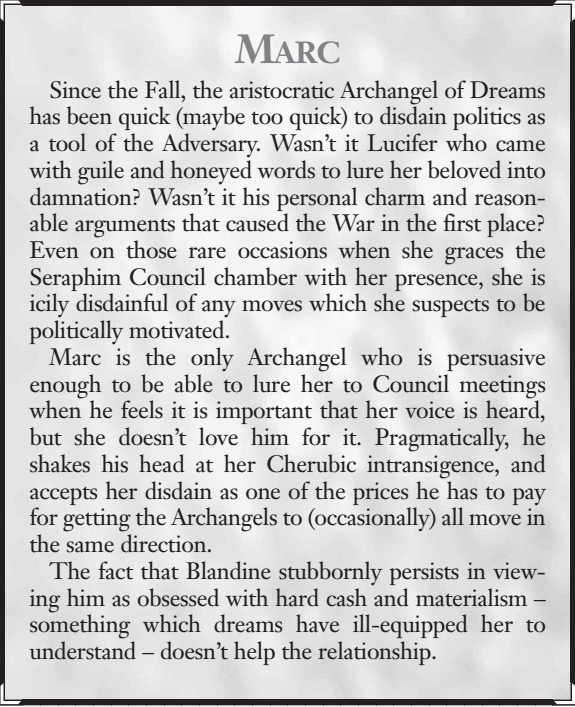
Next time: Spare a little candle, save some light for me
Every moment I'm awake, the further I'm away
Original SA post Superiors 3: Every moment I'm awake, the further I'm away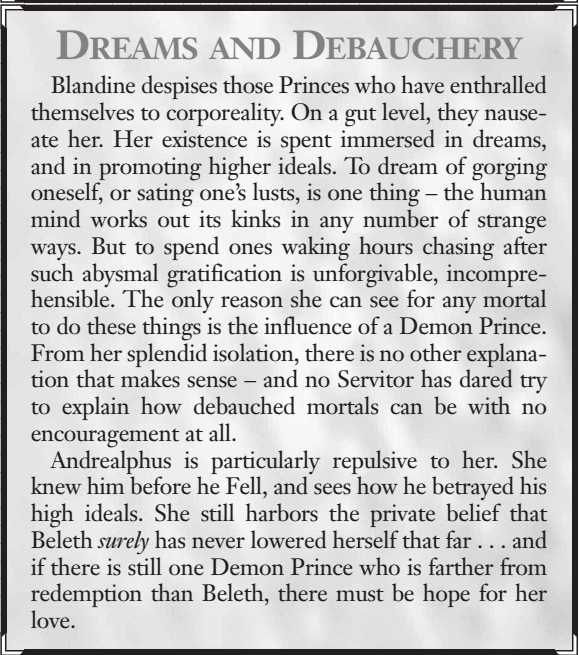
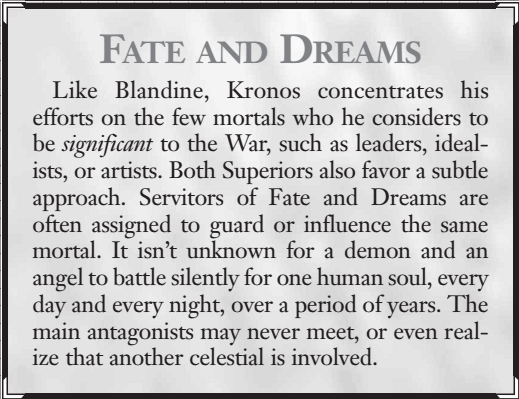
The Seneschal of the Tower, known as the Castellan, is responsible for managing day to day life iwthin it, with help from his staff of angels and relievers. He directs visitors, handles Blandine's schedule and takes reports. The staff is spread out between the ethereal and celestial sides of the Tower's Tether. On the ethereal side are most of the planning and debriefing rooms for the battles with Nightmares. On the celestial side, angels report incidents to their fellows and then ehad for the quiet rooms, where any may come to rest and lose themselves in dream.
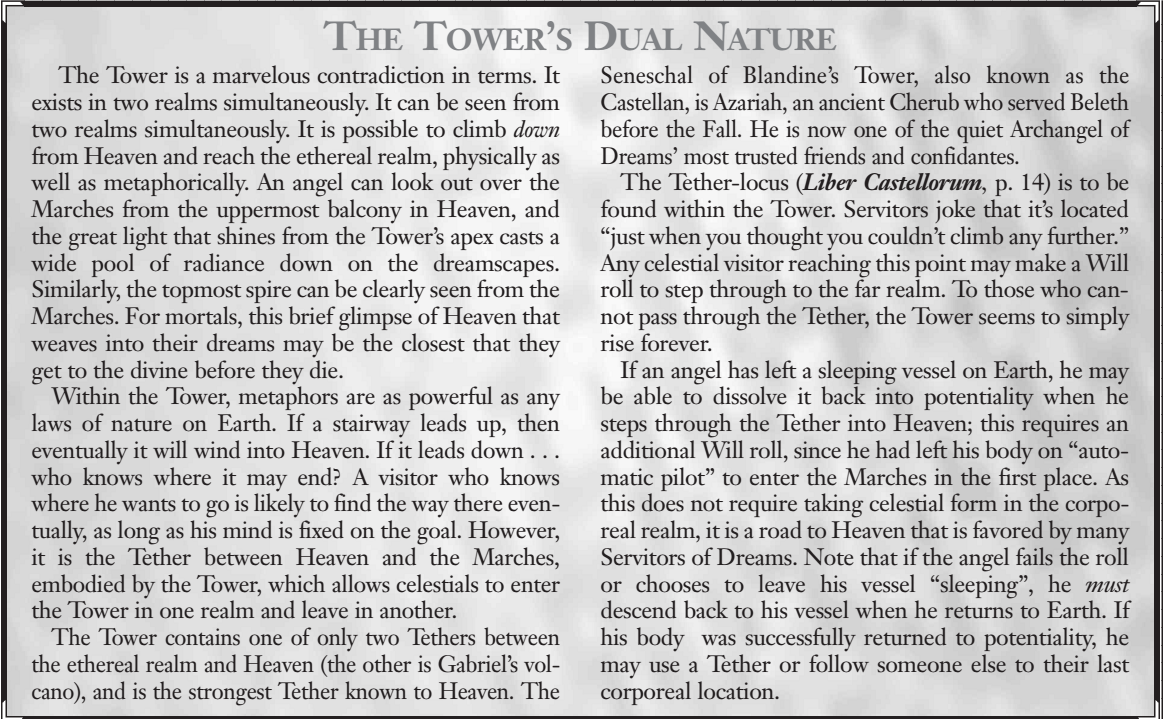
The Encyclopedia Somniorum was given to Blandine as a gift by Uriel, to aid in hunting Ethereals.
Blandine hates fighting, but she believes the War is a moral imperative. The moral part of the War is at least as important as the results of most minor battles, because it is human hearts and souls that are the battleground of the true War. She is determined not to fail and to protect humanity from the evils promoted by Hell. More and more, the Earthly War is just an abstraction for her. Her fight with Beleth is her world, and she hates the conflicts that directly interfere with humanity, disapproving of the unsubtle tactics of most of the more warlike Archangels.
Before the Purity Crusade, some ethereals were almost friendly with Blandine. Now, only a very, very few are. More hide in the Far Marches or in Beleth's side of the Vale of Dreams, resenting humans and the angels that guard them. Blandine despises those ethereals who stalk the mortal world for malice or mischief, and she acts as needed to protect her Merches from them, as she would any intruder. Humans were not meant to interact with dreams made flesh, even if the ethereals have no intention of stealing Essence, perverting true believers or treating humans as toys. Blandine understands more than any other the harm they can accidentally cause.

Blandine is one of the least political of all angels on the Council, keeping her methods and plans to herself. She will very rarely take action or speak out against the more violent factions of Heaven, particularly Michael, but she she normally stays silent and vigilant in the Marches. It was a bit of bad taste, but she took it and put it on a carved ice podium in a simple room overlooking the Marches. The book contains descriptions of all ethereals known to the angels. It is a large, silverbound volume, and it isn't made of paper. Each page is made from a portion of the ethereal it describes. Over the years, some angels have left candles, flowers and other tokens to commemorate the daead. The Cherub that guards the book is good at tactfully looking away for those who want to leave tributes indicating sympathy with the victims of the Crusade.
The Ephemera, meanwhile, is both library and gallery, containing all works of art ever dreamed or imagined by humans but never made. It takes up several floors, and it never ends. Sculptures and paintings cram into eavery inch of space, showing vague dream-images of what might have been and might be. It does link to Yves' Library, and when a writer finishes a book they had dreamed of, the book is dutifully sent over from the Tower to be reclassified. The angels of Dreams are terrible librarians, so Yves has sent some shared angels to put the shelves into order...though they still spend much more time sharing the dreams then they do cataloging or helping patrons. At the highest point of hte Tower is an open balcony with a parapet. It is known that Blandine spends much of her time there, and it is high over the mists of the Vale. From its edge, it is possible to see Beleth's Tower on the horizon. All angels are brought to the balcony when they fledge, to be shown the enemy.
The Near Marches, known as the Vale, are the part of the ethereal realm closest to human dreams. They stretch between the two Towers, and it's easy to spend an entire night just patrolling the Vale and never see another celestial. This also means it's easy for ethereals to sneak into dreams without being spotted. Dreamscapes can be seen as bubbles drifting between the Towers. They can't be herded or captured - the only way to control one is to enter and influence it. Over the millenia, Blandine's influence has made her half of the Vale bright and peaceful. The dream fields, planted with ethereal poppies, have areas set aside for angels to rest after a night's work. There are always tired angels found in these fields. Any angel that has seen a rough day or too many atrocities is welcome to rest among the poppies and regain hope, though anyone that breaks the tranquility will be asked to leave, politely.
The peaceful sleep Blandine offers gives solace to the mentally ill. A small hill, some ways from the tower, is set aside for the Asylum. It lies inside the hill, a place of healing for those angels driven mad by the sress. All angels can be sent htere, where carefully selected Dreamers try to help them. Some of these treatments can be a bit exotic. Some say that the Asylum, also called Eternity, is used by Blandine as a private prison and interrogation facility, but none have ver proved it. Those released from Eternity only ever say good things about it. If a fleeing inmate is considered a danger to themselves or others, emergency powers are given to the Cherub in charge to fetch them before they can do any damage.
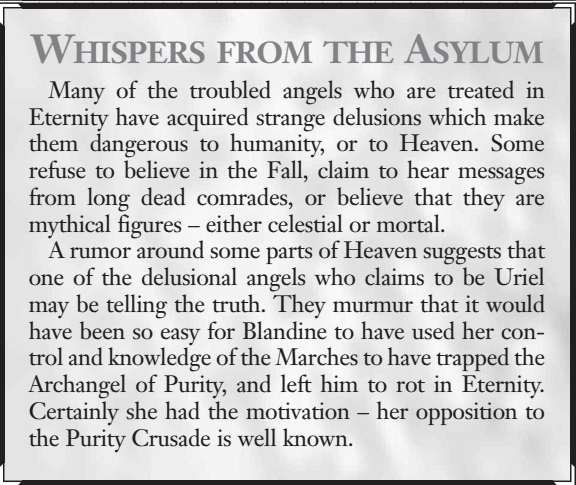
The ruins of the first Tower of Dreams remain in some parts of the Vale. Despite rumors that they may still hold powerful relics, they are usually avoided. Is is known that some are close to burial grounds, where surviving angels of Dreams buried the shattered Hearts of their former comrades. The best known of the ruins is a broken statue named And Thou Shalt Walk in the Terror of the Lord, which once stop atop the first Tower. Malakim of Dreams still take the long trip out to that ruin alone to swear their vows when newly fledged.
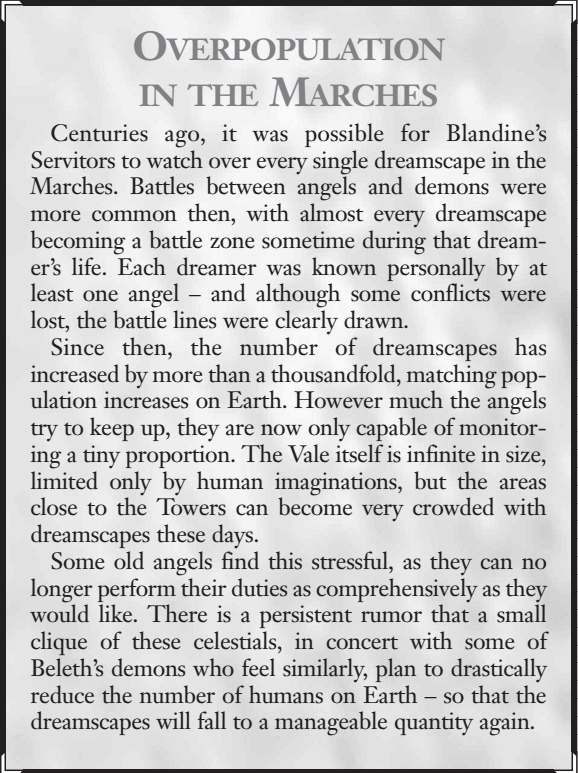
Dreamscapes are the real battlefield between Dreams and Nightmares. Every living creature can contain entire worlds in their imagination, which come to life as dreamscapes. These, to many angels of Dreams, are the most miraculous part of the world. Using Dream Walking or the Corporeal Song of Dreams, a celestial can enter a dreamscape and become part of it brieflyy. While in a dreamscape, angels can encourage a dreamer away from nightmares by altering parts of the dream with a Will roll or use of the Celestial Song of Dreams. They may also work to heal the effects of trauma or anguish, or use the dream to speak to a dreamer directly. In dreams, humans accept many things they'd not accpet while awake. If a demon or ethereal is already in there, however, you're in a combat situation on roughly equal terms. Reality itself becomes the weapon and the defense. The object of dream combat for Dreamers is to nudge the dreamscape towards Blandine's Tower and aware from belethers, as well as to eject the enemy. Soldiers of Dreams are told to imagine themselves as sheepdogs, herding and protecting the flock.
Dreamscapes can be quite dangerous to the unsuspecting. Humans can dream of disasters of all kinds, and these can cause ethereal damage. Destroying any part of a dream is dangerous to the mortal, as all elements are tied to the dreamer. Cherubim have even been known to take dissonance if significant parts of their charge's dreams are destroyed by anyone but the dreamer. If a dreamscape turns nasty, angels are expected not to fight back, but to help the dreamer fight back themselves, or to use their own dream shaping skills to modify or negate the threat. Likewise, it is possible for an angel to use willpower to alter their own appearance to blend in, but fitting in too well can be dangerous. An angel in that state can, rumor has it, forget their own existence, becoming part of the dreamer's mind, which is not normally possible. If an angel is lost in this state and goes unrescued, they will not live until the dreamer dies and they are thrown into Trauma.
Next time: Is it cloak and dagger, could it be spring or fall
I walk without a cut through a stained glass wall
Original SA post Superiors 3: I walk without a cut through a stained glass wall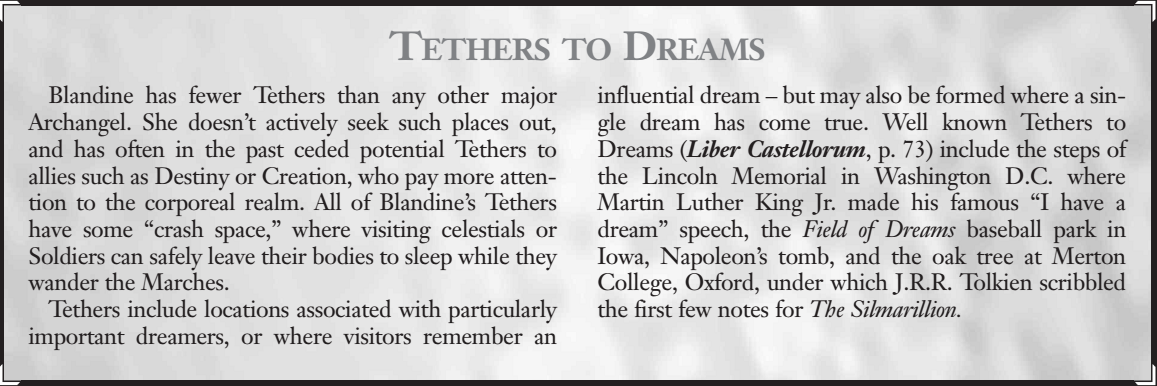
Blandine doesn't foster Tethers much, as her work is in the Marches. However, some places just feel of Dreams so strongly that they are precious. These include concert halls, teathers and art galleries, as well as the coffee shops and restaurants where students and revolutionaries meet to discuss their ideals, and the parks and playgrounds made sacred by generations of children. In modern times, some younger angels have taken it as a challenge to prove that dreams can be fostered anywhere, overseeing unlikely places like old housing projects or ad agencies. While most will never become Tethers and Blandine ignores most of them, these angels continue the grand Dreamer tradition of fighting to nurture all that is best in humanity.
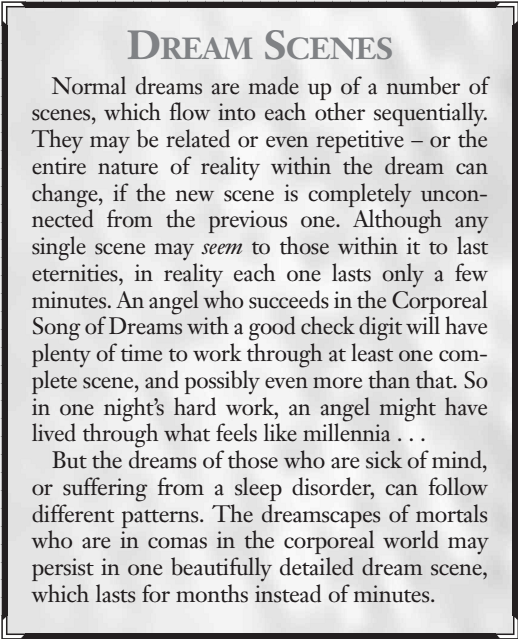
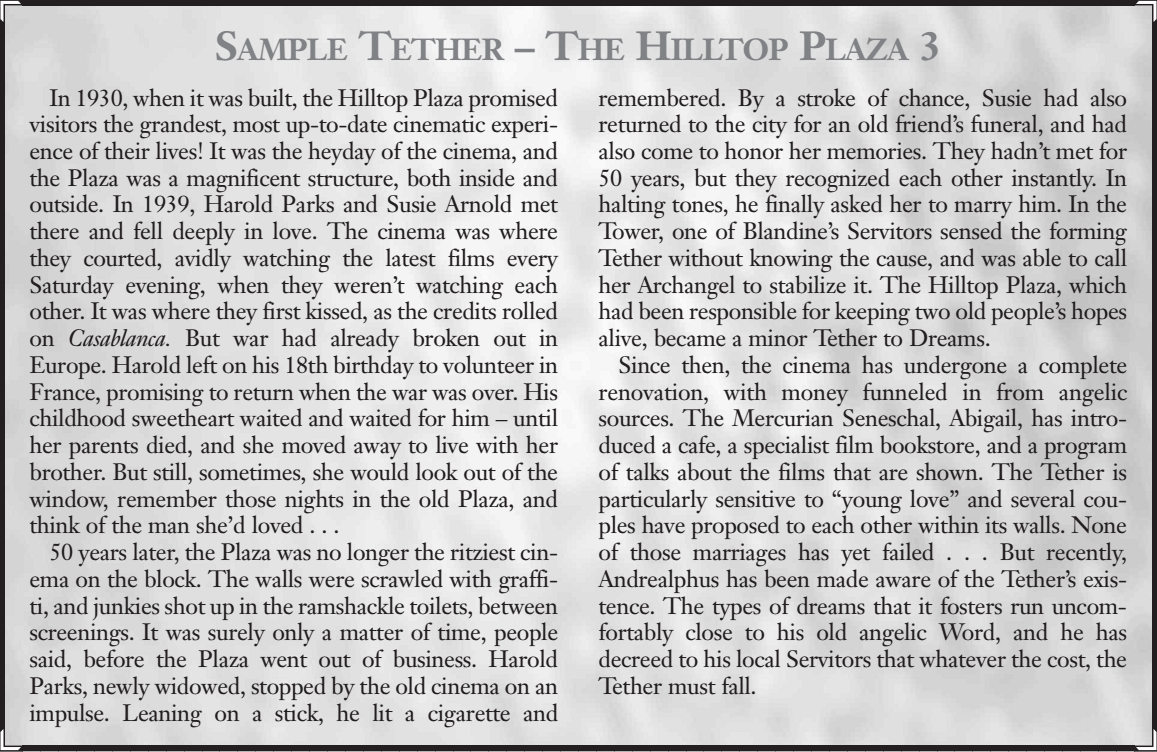
The Dreamers are almost as misunderstood as the angels of Judgment. They have a reputation for being out of touch idealists, been accused of overtolerance for pagans and ethereals, and are often seen as lightweights distracted by their own affairs. In fact, many are intelligent and passionate, able to plant bright dreams in the hearts of humans with but a few words. Many prefer to keep company with mortals or no one rather than other angels. There is, of course, a split between those who have adapted to Earth life and those who haven't. The former are more pragmatic, patient and realistic with mortals, though they politely try not to disilusion their colleagues. They will often try to help those new to Earth and sometimes even advise Blandine on Earthly affairs. The other kind rarely feel comfortable on Earth and in mortal flesh, living only for life in dreams. Some, though, marvel at Earth and find wonder in even the most mundane things, as they are used to abstraction and symbolism, and may interpret dreamlike symbols in reality itself. This can alienate them and leave them uncomfortable and out of place everywhere. While some accuse them of being arrogant or solitary, but in dreamscapes, they have to fight alone and must be self-reliant at all times. They feel personally responsible for guarding humanity, and if they weren't there, it's likely no one would be.
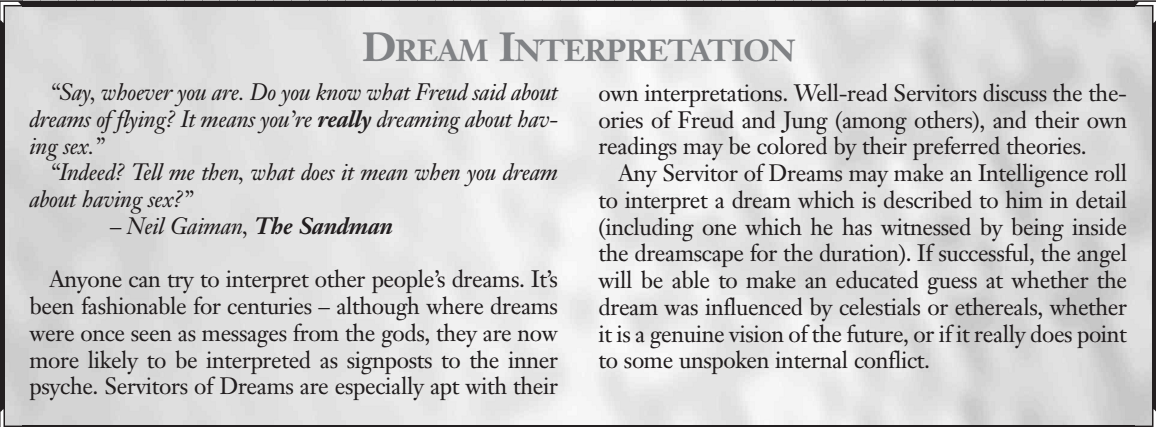
Blandine's organization has few restrictions and encourages initiative. While it is polite to defer to Wordbound, that's pretty much the whole of the hierarchy, and even then, the senior angels accept the junors as equals, acting as mentors more than bosses. An angel may request permission to work with a senior angel they admire, and each angel also has a personal if distant relationship with Blandine herself, answering to her directly. While the Dreamers are used to working without supervision, only a few are actually antisocial, preferring to spend their time alone. Many of these become semi-mythical to other angels, known better by nicknames based on their favored appearances in dreams than their actual names, and they are collectively referred to as the soloists.
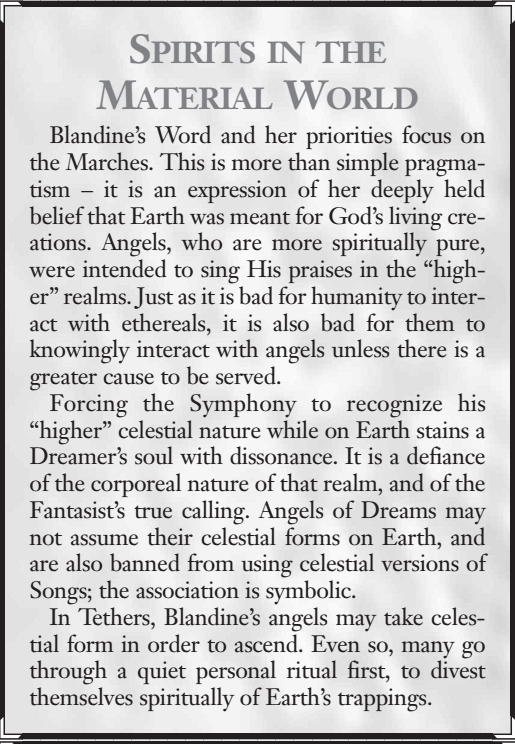
Most Dreamers, however, are happy to interact with others. They like new ideas and while they respect age and experience, good poetry or good ideas can earn a young angel a reputation quickly. Lateral thinkers and quick wits are useful in dreamscapes as well as in debate, and social Dreamers gather together each night after their work, to discuss poetry, dreams and philosophy. Quieter and wearier angels can watch and keep score, rather than take part. Among themselves, the Dreamers are formal and polite, favoring stylized etiquette and aristocratic demeanors. They calue privacy and often seem reserved to others. They are encouraged to cherish their private hopes and dreams, and they rarely discuss personal feelings or motives with others. Certainly they never pry, but wait until the other brings it up.
Angels are expected to do their work humbly, well and without hope of reward, but Blandine is aware of her best workers. She occasionally invites them to artistic events or gives them vacations, and those who have sacrificed their own goals to achieve her missions may even be given a Word. High honors also include permission to wear one of Blandine's scarves in the Marches, which may or may not be a relic, and to guard her sigil. Blandine hates punishing her angels, but does expect the spirit, if not the letter, of her orders to be obeyed. Those that repeatedly dishnor her dissonance conditions will generally just be handed to Dominic, but otherwise, punishments are for an angel's own good. They may lose their vessels or be required to report to a more experienced angel. These punishments are rarely made public.
Unless they ask for help, a Dreamer's fellows and even Blandine will assume they are content. Once a problem is raised, however, Blandine will give her full attention. If an angel truly desires to leave her service, she will allow it even to those Archangels she dislikes. If an angel seems poorly suited to her methods, she may also suggest a transfer or arrange it without discussion. Because it's never clear if a change was request or assigned as punishment, other Dreamers consider it too delciate to discuss in any circumstances.
Redemption, to the angels of Dreams, is held to be the holiest sacrament. It is vital that a demon prove sincerity - just expressing idle interest isn't enough. While angels are free to plant the seeds of hope in promising demons, Blandine prefers that they not reach out this way. Dreams are personal and the path of dreams must be walked alone. All those who have searched their hearts and felt the call are welcomed at Blandine's Tower. While the Dreamers may try to test their resolve by reminding them of the risks, no demon that is resolute will ever be turned away. Blandine accepts them graciously and does not test them further or make them beg. Because her only requirement is that a demon should seek her out of their own accord, many demons who attempt her Redemptions die in the attempt. Blandine regrets their loss, but each one chose death willingly over remaining as they were, and she sees this as cause for hope. Others say that if she were more stringent, the casualties could be reduced. Blandine takes special pleasure in Redeeming demons of Nightmares, whom she treats as coming home at last, alongside those angels that Fell and Redeemed. They fuel her dearest hopes.
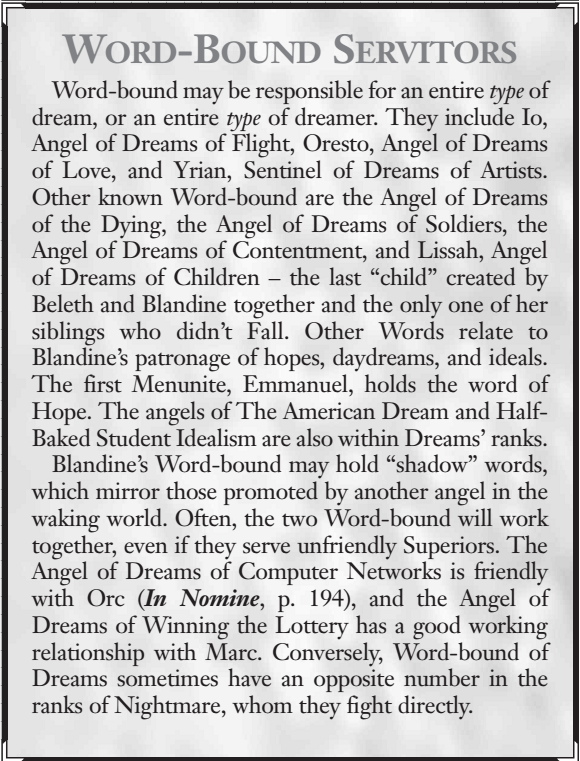
Blandine's position on non-intervention in human lives can make it difficult for her angels to recruit servants or Soldiers. Few doubt their use, but they find it hard to justify interrupting human lives. Many choose instead to instruct their mortal allies by dreams and may not even meet them physically while they are alive. They prefer those with some talent for lucid dreams or who have marvelous dreamscapes. Thus, they may have skills that don't match the angel's needs at all. Fortunately, most Dreamers don't mind this, and most of the Soldiers are fairly competent. They are often taught Ethereal Songs or given the Dream Walking attunement and left to help watch over dreams on their own initiative. Often, it is Soldiers who take the lead in recruiting other mortals, which has resulted in a recent rash of recruits from publishers and media production companies. Those who believe Blandine's agents are inactive on Earth simply because most of her angels are in the Marches underestimate her mortal network. Humans easily sympathize with her goals, and her Soldiers are very determined. Many mortals working with Dreams learn to get by without much rest, as they rarely get the chance to sleep peacefully through a whole night. Still, the angels try to make room for their need to spend time on their own lives. They are, in fact, often very proud if their servants choose to settle down with a lover. They take it as proof that they didn't disrupt a life, even if they did work a bit at matchmaking via dreams.
Fun fact: More Cherubim serve Blandine than any other Choir, including her Menunim. In fact, they make up nearly a third of her angels, on all levels.
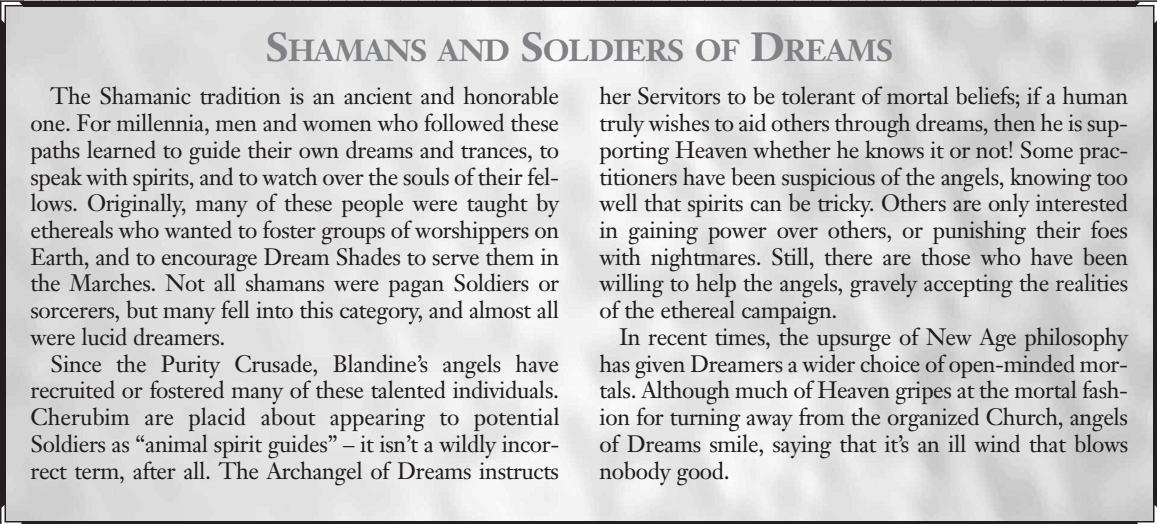
Seraphim of Dreams are often good at underestanding the truth behimd metaphors, better than any others of their Choir. They adore similes and obscure but True connections between ideas, which they like to share. They are intensely idealistic and often see it as their duty to show others when their fears are based on lies or misunderstandings. Though Dreamers tend to work solo, Seraphim assigned to Earth typically are sent with a 'translator' in the form of another angel or a mortal poet. Many of them are not good at adapting to Earth and may even find corporeal things like vessels or human bodies disgusting. Others shun Earth because they prefer the deeper truths of human nature found in dreams.
Next time: The sweetest song is silence that I've ever heard
Spare a little candle, save some light for me
Original SA post Superiors 3: Spare a little candle, save some light for meCherubim of Dreams not only guard the waking but also protect the dreams of their attuned. Some choose to remain distant on Earth, watching from afar but being close in dreams. Others obsess over an attuned, spending every moment of the day and night with them. When assigned to great dreamers, as they often are, these Cherubim seek to increase their dreamer's audience on Earth, spreading tales of their dreamer among mortals. All of these Cherubim face the dilemma of protecting charges without interfering in human lives too much. Blandine understands, and she doesn't expect you to gain dissonance for her. If your options are let them get hurt or interfere, go interfere. However, if you can find a way to protect an attuned and avoid interfering directly, you will be rewarded. Cherubim of Dreams, unlike most other Dreamers, hunt in packs. If one Cherub's attuned is threatened in dream, they can easily recruit a posse at the Tower to help them out. Likewise, Cherubim of other Words can expect Cherubim of Dreams to help out in the Marches if asked.
Ofanim of Dreams love the Marches, for they are in constant flux. Instead of speeding across Earth, they can allow the Marches to flow around them. They delight in wearing their foes down and running rings around them as they move from one image or idea to the next. Though adventurous, they are more likely than other Ofanim to be prudent on Earth, as they can release their wilder urges safely in the Marches by night.
Menunim are often, somewhat incorrect, seen as delicate creatures by the other Dreamers, and protected from the harsh realities of Earth. In fact, many are very curious angels who like to sample the hopes of all the world, including dmeons. They inhabit Earth without interacting with people, and it makes them expert observers. They also serve as Blandine's emissaries. Any Menunite might be asked to deliver a message for their Archangel, and that is the only time they may ever directly interact with a mortal without dissonance. They also have the task of giving hope to those that once held great aspirations, but lost them - priests losing their faith, politicians turned cynic, and so on.
Elohim of Dreams are calm, tasked with teaching mankind to balance dreams and real life, as well as the importance of dreaming. They often visit places that seem hopeless and depressing while on Earth. They will go to massive lengths to foster dreams, and some have been accused of deliberately creating myths around mundane events in order to inspire later generations. It is whispered that some even worked to assassinate figures who became legends after or due to their untimely deaths.
Malakim of Dreams are spies and hunters, traveling into the most dangerous parts of the Marches. Some are overconfident due to their ability to become invisible in the Marches. They take their honor seriously, and frequently challenge each other to non-fatal duels over minor points of etiquette, which puzzles even other Malakim. Many of them believe it is wrong to punish a mortal in dreams for acts committed in the waking world, and will not harm those in dreamscapes or allow allies to do so. However, if a Malakim is granted permission by Blandine or her Incorruptibles to chase some mortal wickedness to Earth, all bets are off.
Kyriotates of Dreams are among the most fearsome of the warriors of the Marches and are reputed to be the ultimate dream shapers. Some of them like to 'sign' their works with some personal touch in the form of a signature symbol, color or scent. While they can shape multiple dreamscapes ato nce, each must be entered seperately. On Earth, they are likely to be assigned to an area rather than a specific person, and some suspect the only reason they ever get sent to Earth is that they seem to enjoy it so much. Still, they work even more than anyone else in the Marches, so no one really holds it against them.
Mercurians of Dreams enjoy spending time on Earth. They work often as musicians, teachers or junior nurses, allowing them to mix with a close-knit group. They encourage creative thinking and often serve as dream interpreters. They tend to fantasize about all the things humans could be rather than the reality of what they are, which can be annoying. While they are pragmatic by Dreamer standards, they still often see the world through rose-tinted glasses. Fortunately, mortal friends and allies can give them a more practical perspective. In the Marches, Mercurians try to check as many dreamscapes of their friends as they can each night, and they aren't above secretly encouraging mortals who are connected by shy fondness to dream of each other.
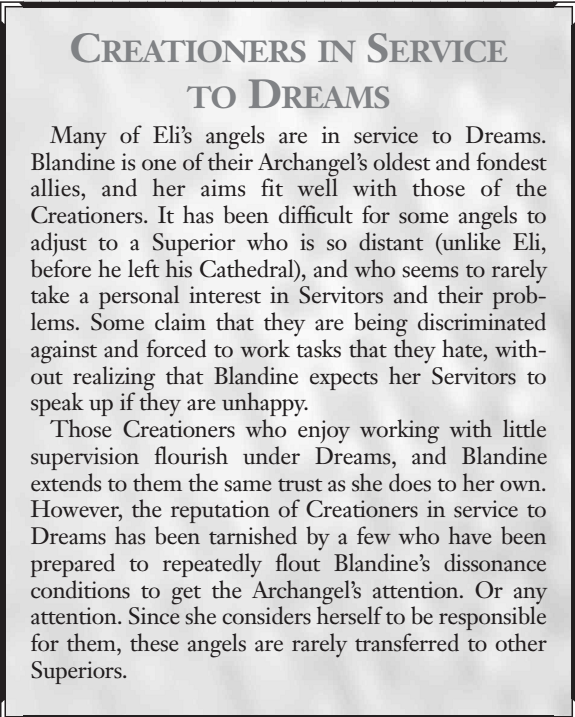
Most work done by the Dreamers is either in the Marches or, somewhat more rarely, on Earth. They spend little time at all in Heaven, and an angel could go centuries in Heaven without meeting a Dreamer outside the Tower. Most administrative tasks in the Tower are left to the blessed souls, though the tired and hurt often choose to rest by their Hearts in the HGeavenly Tower, and that's where Tethers let out. Some angels may choose to work alongside those of other Words, but they are often homesick for the freedom of the Marches. If an angel wants to work in eaven, a job will be found, at least, perhaps teaching others about dreams.
The Near Marches are Blandine's real domain, and many of her angels feel more at home there than in Heaven. They work at anything from guarding dreamscapes and chasing intruders to making sure that the paths between quadrants are well-marked and any messes are cleaned up. Handling the Vale is an immense task, and the Wardens of each quadrant have a great responsibility. Angels without vessels are usually assigned to a quadrant under command of the Warden, and relievers often work as messengers or guides. Others are specialist lookouts for signs of demonic or ethereal incursion. Dreamers are occasionally roped into Marches espionage parties or sent to explore the border of the Far Marches, and many consider it important to keep an eye on any other angels in the area. They may also volunteer to teach angels of other Words how to handle ethereal combat, dream shaping ethics or other aspects of ethereal work.
Dreamers on Earth typically work to protect and foster a specific mortal dreamer or to help another angel asking for backup. Blandine or the other angels on Earth typically pick the dreamers that need protecting, but sometimes an angel is just so enthralled by a dreamscape that they ask if a Cherub can be sent. Blandine is tolerant of these requests, and those that fall in love with a mortal via their dreams are quietly reminded of the importance of not meddling before being sent to Earth. Angels on Earth also work to train Soldiers or work against demons of Nightmares. It's not rare for those angels who just want to see Earth to begiven a vessel and Role and left to build up some expertise by supporting Dreams on Earth as best they can. Often, Kyriotates and Mercurians are allowed to settle in and become corporeal specialists, able to advise less experienced angels. Often they work as psychologists, librarians or other positions that let them watch over humans without becoming authority figures.
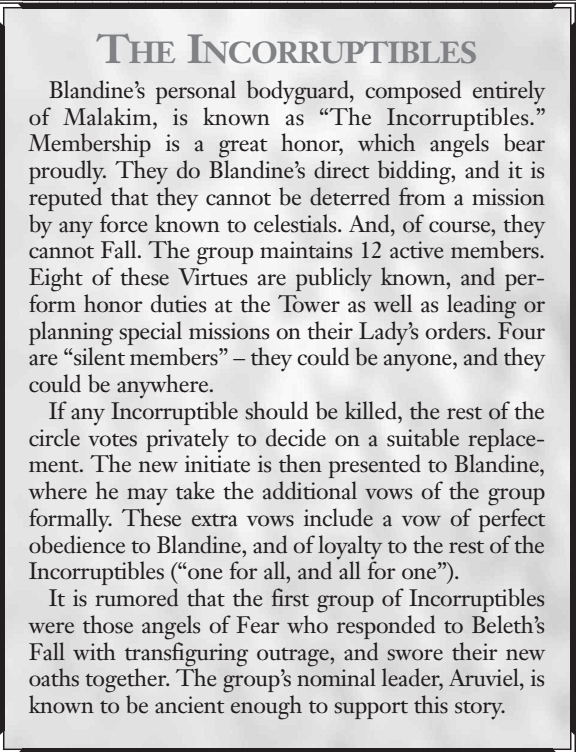
Blandine also assigns some more specific jobs at times. Every Archangel has thought of spying on dreams, and while Blandine disapproves, she prefers her angels do the work rather than theirs, because hers are less likely to accidentally cause harm. Her listeners are often skilled at assuming the form of someone trusted in order to speak to mortals in their dreams, and many are Mercurians, able to best know how to win a dreamer's trust. Sometimes Malakim are also sent, if a dreamer is judged to be dangerous to interact with. Dreams also handles much of Heaven's work in Earthly media, particularly their Soldiers, who have been historically quicker than angels at figuring out how to use them. Contact with Media demons is not rare, and Dominic would be unhappy to learn the full extent of it, but full conflict is rare, because the two sides often fail to understand each others' goals. Still, Dreamers do try to expand into areas that demons don't completely control, and each side tries to recruit the other. It's said that while Nybbas controls Hollywood, Blandine has much more influence in Bollywood's Mumbai studios.
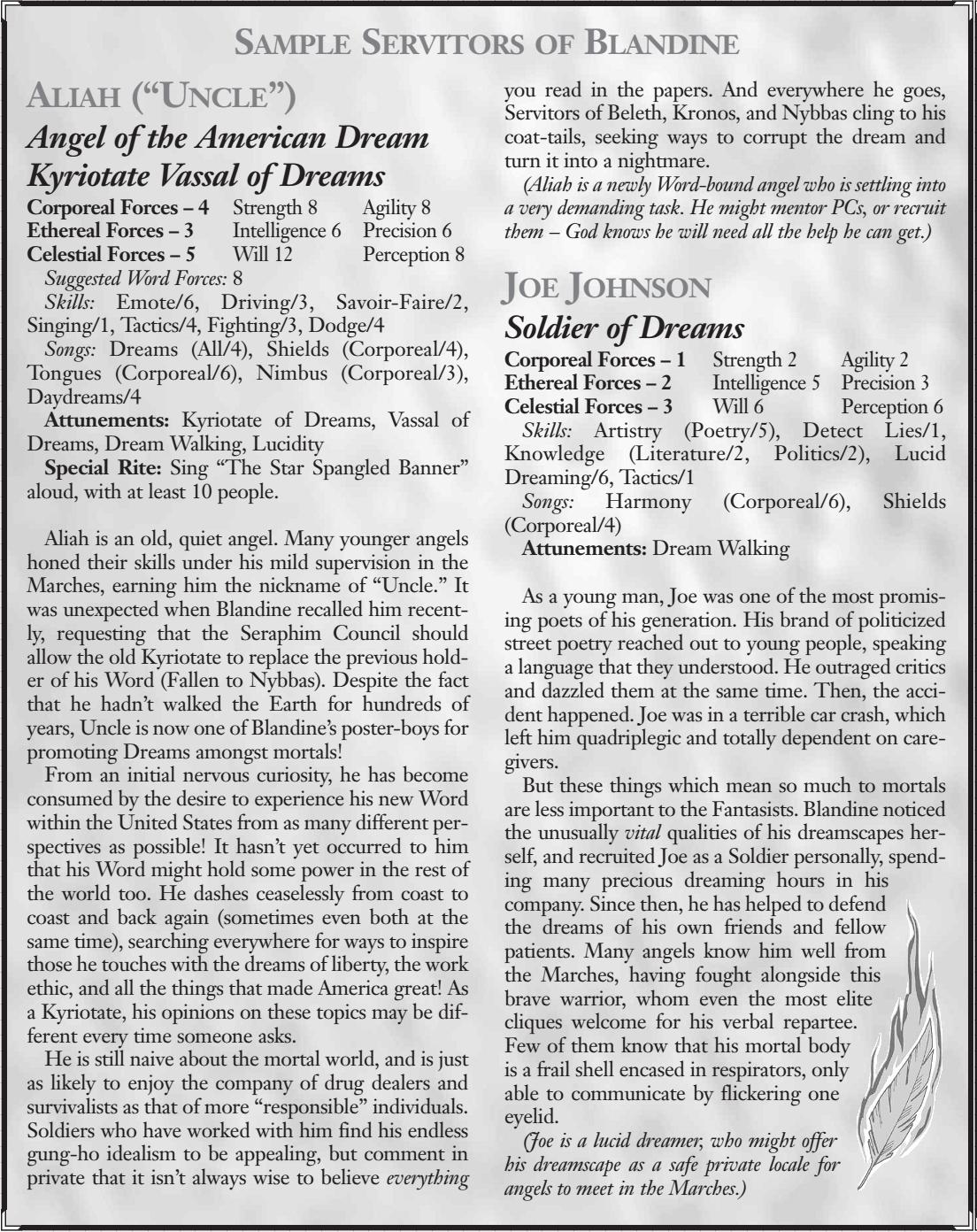
Dreamers deal with outsiders case-by-case. When they encounter angels in the Marches, they often expect some deference, at least out of respect for Blandine, and they have been known to be overprotective of their turf. They often dislike intruders in 'their' dreamscapes, but others extend the same politness to visitors that they expect from them, though they respond poorly to rudeness. Most of them prefer working with mortals to working with other angels.
Blandine expects her angels to cooperate with Judgment. She has no internal police, as she trusts her angels to act properly and Dominic's to keep them on the straight and narrow. Angels that are targeted by the Inquisition will usually not be protected if the charges against them are demonstrably correct. Blandine dislikes interfering in other Archangels' business, after all, and she trusts the angels of Judgment to know their duties as long as they don't cross the line. Many Dreamers take her instructions to mean 'provide exactly what is asked for, no more and no less,' and don't go out of their way to make life easier for Judges. They ragard their privacy highly and dislike being interrogated, and they also dislike the tendency of Judgment to use dreams to spy on those they wish to punish, or as a means to punish people for Earthly sins. Triads that flaunt their powers are often secretly shadowed by Malakim of Dreams, who wait for a chance to give them a taste of their own medicine. If the Malakim get in trouble for this, it's one of the few times Blandine might step in to protect them.
Next time: Funny how your feet in dreams never touch the earth
These dreams go on when I close my eyes
Original SA post Superiors 3: These dreams go on when I close my eyes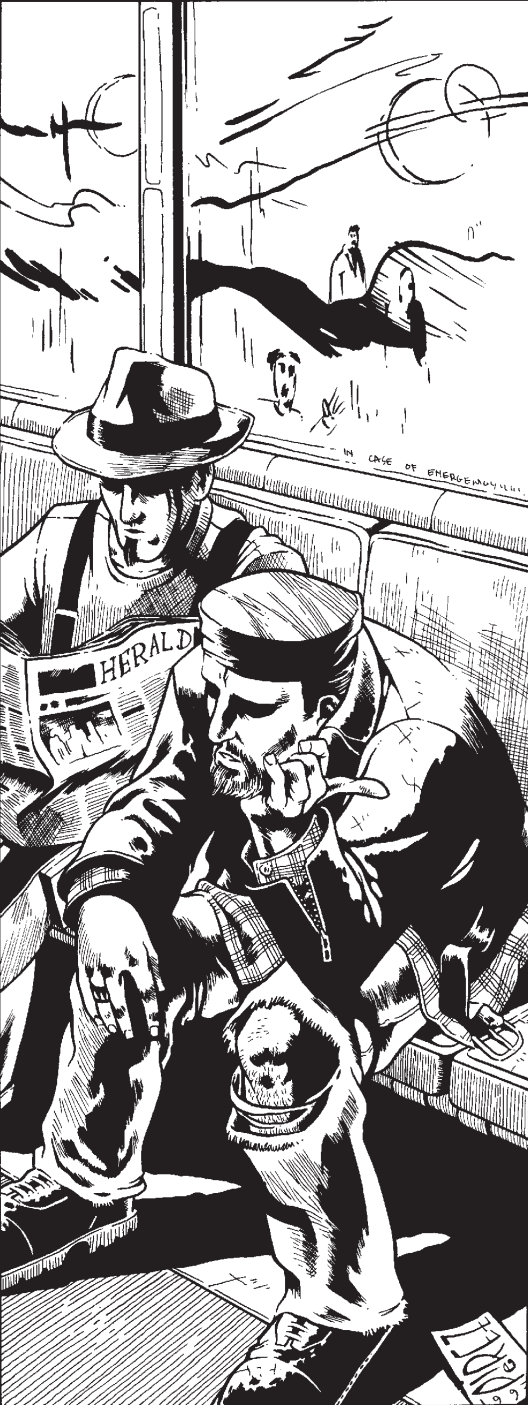
Menunim , AKA the Messengers of Hope, are Blandine's minor Choir. They are the most subtle and silent angels, but full of faith, optimism and acceptance. They avoid dealing with humans directly when possible and also avoid causing Disturbance. They trust humans to do right, with just the slightest push. While Blandine will lend the services of the Menunim to other Archangels, none of them has ever permanently left her service. They resonate with hope, and it is their duty to bring hope to those who need it. They do not speak to their targets, however,. They drift silently between people, preferring crowded places, and instinctively seek out those in despair to give them the hope they need via the daydreams that Blandine teaches them to cause. They tend to believe that humans have free will and must chart their own course. They also believe that the universe is basically good and that humans will, on the whole, choose good over evil. IThey believe they are the expression of that universal inclination, and thus that it's their duty to give humans the hope to continue on. They are rather distant angels, and tend to see things in the concrete, approaching their jobs mechanistically. They can feel the hopes and fears around them and understand people deeply. They tend to keep notebooks to record the lives of those they've touched and the hopes and fears they perceive, which they compare when they meet other Menunim, almost as though keeping score.
The hopes that Menunim instill via their Choir Attunement are rarely earth-shattering, and they typically seek to cure the ills caused by daily stress more than anything else. Very rarely, they will find a human on the threshold of their destiny and do all they can to help the human along, but they are by and large focused on minor issues of daily life, encouraging others to mend their own problems and become happier. It is dissonant, however, for any Menunite to directly manipulate a human toward a given conclusion by any corporeal action. They do not speak to others in conversation to push them ot things, nor do anything of that form in the real world. In dreams, of ocurse, they can act or speak to mortals at length, but by day they must be strangers. While a mortal can ask a Menunite for advice, they must never offer it themselves. They see themselves as channels for the Symphony's goodness, and to do more than that is dissonant, as it places more value on their consciousness than the universal will. Menunim can, however, communicate with Soldiers and other humans aware of the War and celestials. Even so, Soldiers that ask Menunim for advice on their personal lives will likely be told to figure it out themselves. A Fallen Menunite becomes one of the Pachadim, Beleth's demons of fear.
Menunim tend to be grave and silent save around other angels, where they can relax. In celestial form, they appear as vaporous clouds. They can create a face in the cloud if they feel like it, but rarely do. Among humans, they prefer gray and conservative clothing to avoid making any impression on those around them. When they have a Role, it is invariably a low-level one, and they seek to avoid notice. Musically, they see themselves as bassoons or double basses - rarely soloists, but completing any orchestral piece.
Mechanically, A Menunite can spend two minutes around a person and make a Perception roll to detect their hopes and fears. CD 1 tells them the hope or fear that has most occupied the target over the last day, GM's choice which. CD 2 is both hope and fear. CD 3 gives two hopes or fears that have most occupied the target over the past month. CD 4 is two hopes or fears over the past year. CD 5 gives the target's greatest hope and greatest fear. CD 6 gives that, and also lets you hear the target's current thoughts as they related to a current hope or fear.
Next time: The awakened flame.
The Cleansing Flame
Original SA post Superiors 3: The Cleansing Flame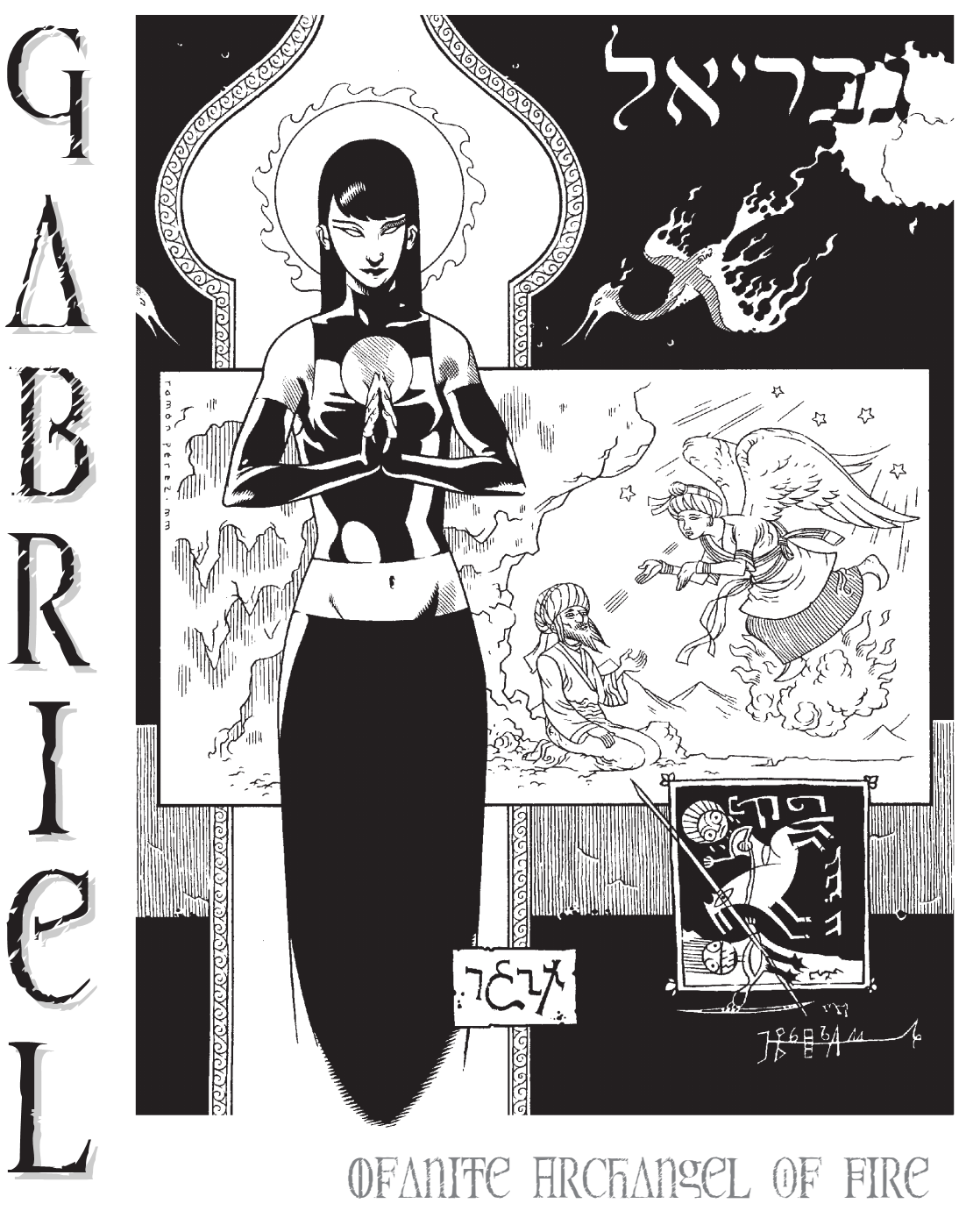
Gabriel is the Archangel of Fire, who punishes the cruel and speaks prophecy that even Yves does not receive, but she's also kind of insane.
Bright Lilim of Fire know exactly what punishment is required for an offender to repent truly of their cruelty. They are assigned specific cases, like Malakim. Any Bright Lilim of Fire would be utter fanatics, redeemed by or choosing to serve Gabriel with absolute passion. Most would focus on punishing the cruel, though a rare few might prefer to gift humans with inspiration and insight. Soldekai would certainly take great care to have them watched over by other angels to ensure they didn't get carried away.
Eyes of Fire is a Servitor attunement that allows you to view the closest target of your Choir attunement (so Malakim and Bright Lilim see the object their current mission, everyone else gets the nearest example of the cruelty they punish). You don't get sound, but do get a general direction, though not distance. This takes only concentration and a flame - no Essence or roll.
The Last Spark lets you make a Will roll to grant a gift of inspiration to a hopeless human who no longer believes in mercy, or who has lopst faith, or who has turned from God. This gives them Essence equal to their highest Force and a swell of personal energy and feeling of new perspective that lasts for one hour.
The True Shape of Flame allows you to make a Will roll and concentrate on a source of flame, shaping it to appear howevery you desire. It lasts as long as you concentrate, and the flame returns to its original source when you stop.
Where There's Smoke... allows you to tell if anyone you see is a pyromaniac, automatically and at no cost. Elohim who get this attunement may also instantly recognize demons of Belial.
Whispers of Inspiration allows you to telepathically communicate with anyone who is listening and contemplative. You do not have any special power of suggestion, but anything you express will likely be remembered later, if possibly misinterpreted by an ignorant target. You have a range of (Celestial Forces) yards, but there is no Essence cost or Disturbance.
Gabriel can teach the Songs of Fire, Numinous Corpus: Flame, Purity and War. She also knows the Songs of Creation but will not teach them or use them.
Only one angel has ever received a higher Distinction from Gabriel: the Malakite Soldekai, Chamberlain of the Legions of Flame. However, when an angel does please her, she will trace her sigil on their forehead, possibly even branding it on their vessel. Whenever they take celestial form afterwards, the sigil will burn as an undying flame upon their celestial form.
Expanded Rites:
1. Inspire a human being to a selfless action.
2. Protect someone who is the recipient of genuine divine or creative inspiration.
3. Prufy a source of flame that has been corrupted by the diabolical.
Common Fire Malakim Oaths:
1. I will encourage passion wherever I find it.
2. I will protect any bearer of inspiration.
3. I will never let any sanctified flame by quenched.
4. I will protect prophecies and sacred scriptures.
5. I will purify or quench any flame that is used for evil purposes.
6. I will bring inspiration to those whi despair.
7. I will heal those who have suffered from cruelty.
8. I will protect any love born of passion.
9. I will bear witness to any cruelty committed by others.
Gabriel is like a primordial dancer, moving to the beat of the Symphony. She is the illumination of the Holy Flame, and in her early days, she was messenger and inspirer. More recently, she has turned instead towards her aspect of punishing the cruel as the wrath of the Holy Flame. Fire in her terms is the divine spark, the holy light and the fiery bolt of Heaven. It is the wrath of God and the Holy Flame. At one time, she embodied all of Fire, both destructive and creative, but Lucifer has made sure that Belial promotes destruction and the more negative aspects of Fire, which leaves Gabriel limited only to the righteous Fire of God's wrath. Eli and Jean both frequently aid her without her knowledge, as the inspiration of the Flame is closely tied to the lightning of insight and the fire of Creation. Nearly all angels, particularly Wordbound, see themselves as agents of their Word, but Gabriel's sense of identity has slipped. She has a hard time telling where her personality ends and her Word begins, and she doesn't even really try and more. She is primal, even mindlessly destructive at times, like an erupting volcano full of inner wisdom. Above al, she is the ineffable spark of light and life, which will not be quenched.
Gabriel is one of the eldest angels, though she appears eternally young. She was present when the universe was made, burning in the fire of the sun and bathing in the Earth's core. In those times, she viewed herself primarily as masculine. Gabriel was approached by Lucifer during the Rebellion, but despite his best efforts, he was rejected. As Gabriel looked over the Rebels, he was seized by the flame of God's wrath, and for the first time ever, he cried out in anger and felt the urge to punish the cruel. His newly-forged Malakim took wing to follow him, and they drove out the rebel angels, fighting with furious passion. When Lucifer gave Belial the Word of Fire, it caused Gabriel terrible pain - not true damage, really, but something like dissonance, a constant feeling of wrongness and pain along the Symphonic wavelength which Gabriel occupied. He knew what had been done in an instant and knew Belial as one of his former angels, who had joined the Morning Star.
As Belial went forth to promote his Word, the discordant noise continued. No other celestial ever faces exactly what Gabriel does, for the Archangel of Fire must always hear this anti-harmonious feeling directly above and through Gabriel's own Word. Even in the early days, it aggravated him and caused the occasional outburst of fury. It's only gotten worse since. Many have assumed that Gabriel was the original Prometheus, though the angels of Fire deny any connection with the myth, as do the Greek ethereals. Some angelic histories claim it was Lucifer and Jean who worked together to teach humans to use fire, before the Fall. As divine messenger and bearer of inspiration, Gabriel has a sort of mandate to interact with humanity and give them the truth of divinity. Other Archangels have claimed that sometimes this position was abused, notably in the creation of Islam, but this has never stopped Gabriel, whose path has become less regular and reliable as time went on but who has never ceased to inspire.
On the instructions of either Yves or God, Gabriel announced the conception of Jesus to Mary and later led angels above Bethlehem in praise to God. Enquiry from some Archangels produced only a referral to Yves, and Gabriel refused to confirm or deny whether Jesus was in fact divine or how God wanted them to proceed. (Some of the Archangels, of course, came to believe Jesus was in fact God's son and that Gabriel was genuinely inspired.) The extent to which Christianity was deliberately pushed by the Archangels is unknown, but Yves, Raphael and Gabriel were all early proponents of it. Gabriel still refuses to confirm or deny the prophecies some holy texts claim he gave, but he was believed to be active in the inspiration of several Christian prophets, but canonical and apocryphal.
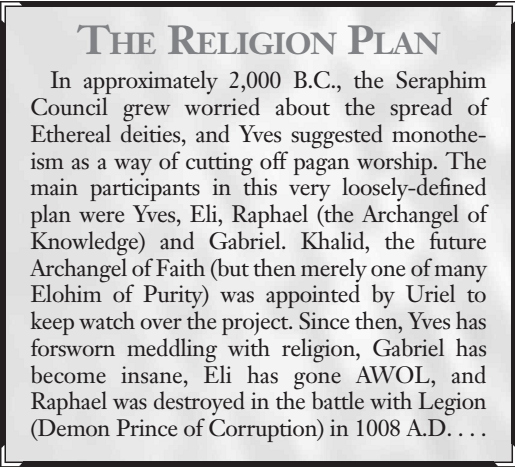
Then came Islam. On Yves' instructions, Gabriel appeared to the merchant Muhammad of the Quraysh tribe, dictating the Quran to him over the course of 23 years. This caused much dissent among the Archangels, particularly the ones who supported Christianity thoroughly, like Uriel and Dominic. When Dominic compared Yves' copy of the Quran to what was transcribed, he found discrepancies and accused Gabriel of taking liberties with the revelation. He was prepared, if reluctantly, to tolerate an ew religion made on Yves' orders, but not to find alterations to it. He arraigned Gabriel for heresy, and Gabriel, furious, stormed from Heaven as the trial began, retreating to the Volcano which stood between Heaven and the Marches, taking the Citadel fo Fire with him. Gabriel then began assuming the female identity she maintains to this day.
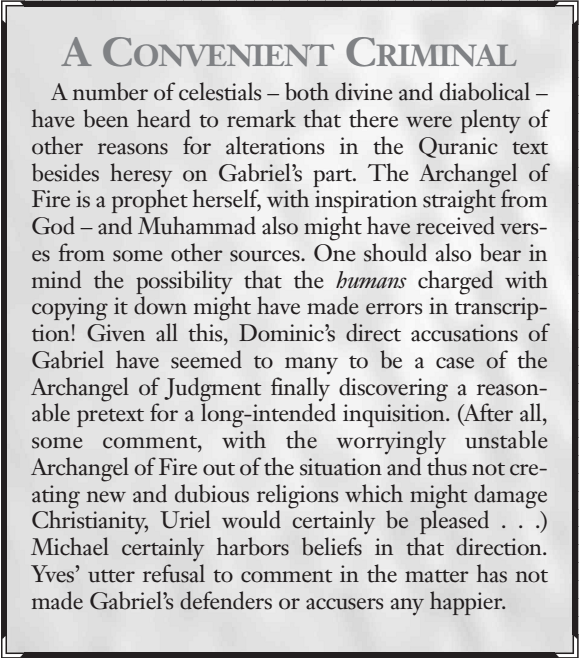
Shortly afterwards, the Purity Crusade began. The angels of Fire did not take any direct part in it, but there are rumors of ethereal enclaves tht called on them for protection, and many claim these groups were Muslims who begged for help in the name of their religion. If the assistance was given, it was very well-hidden, but that would not have been difficult for many of the angels. Gabriel herself attended Uriel's trial but spoke neither for nor against him. She appeared in female form more and more, causing much debate over whether it was a direct reaction to Belial's work as the destructive aspects of Fire or if it was a rejection of her prior person and attributes. Gabriel refuses to comment, and her angels, while confused, remained loyal.
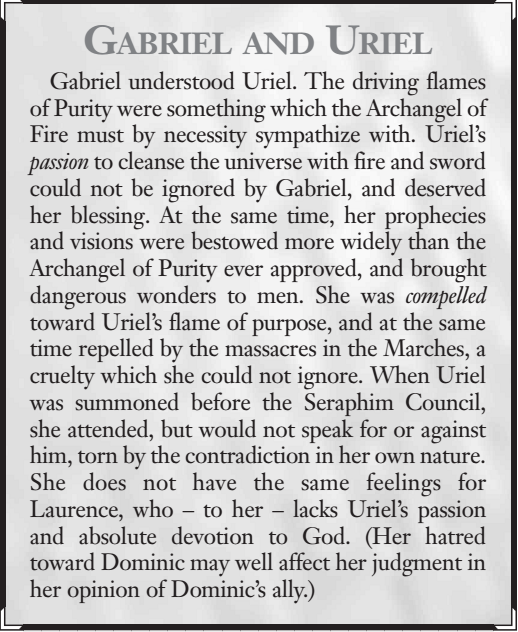
Now, Gabriel uses her fire to illuminate the cruel. She dwells in the desolate places of Earth, taking solace from the solar light in the absence of that of Heaven, and the fire in the hearts of humanity bring her reminder of the fire of God. She has watched Jean turn the night into a brightly-lit one. She has made sure humans never forget the power of fire. Despite industrialism and materialism, she remains the carrier and warder of the holy inspiration of spirituality. She may be unpredictable and visionary and may not understand herself why she does what she does, but she is the Fire of God, which transforms the soul.
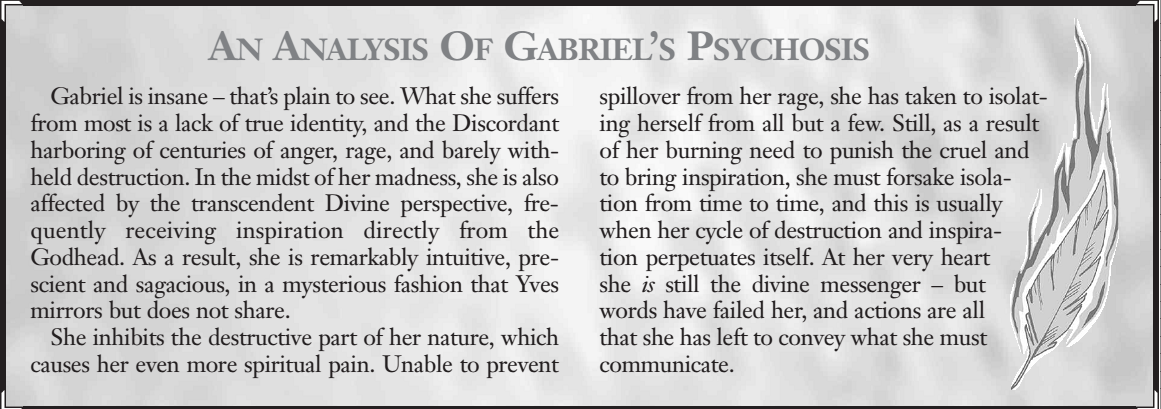
It is known that when the Crusaders stormed Jerusalem in 1099, slaying all within, Belial's demons slew the angel of Fire that had been Seneschal to the Temple Mount Tether. The hatred of the Crusaders created a Tether to Malphas in its place, and when her Tether fell, it is said that Gabriel appeared in the midst of the Seraphim Council in the shape of a flame whiter than the sun, screaming from grief and rage. Her wrath cast dark shadows over the walls, and Laurence turned his face away in shame. It is said that at certain times, when an angel stands before the Council, they can still hear the echoes of Gabriel's cry.
Next time: Holy flames
The Fire Within
Original SA post Superiors 3: The Fire WithinSome say that Gabriel's Volcano is more than it seems. They say that after the Purity Crusade, Uriel was not, in fact, taken to the Higher Heavens by God. Instead, he was restrained by the combined will of the Seraphim Council and chained beneath the volcano. Those who believe this say even Laurence consented, seeing Uriel's madness, and the entire accepted story was made to avoid shaking the faith of lesser angels. If this is true, the Archangel of Purity would still be chained there, hidden by Gabriel's power. Some say he is trapped in an endless dream made by Blandine, but others believe he is awake and conscious of what was done, and that he waits for revenge. These people say that Gabriel finds it more and more difficult to tolerate her own Volcano, thanks to his presence, and that if she were mad enough, she might free him herself.
In Hell, they speak of a fiery woman who walks Shal-Mari and Abaddon, prophesying hope and destiny for the repentant. Some heretics say that it is Gabriel herself, driven by the urge to inspire, even in Hell. None will admit to personally seeing or speaking with her, of course, and the Game suppresses these rumors brutally, but they never quite die out.
It is said that on the day before the Fall of Magog, Gabriel entered the Catacombs. He would not speak to the angels there, even to David, but instead wandered the caves, singing to himself. Some large obsidian fragments and frozen flows of lava supposedly date back to this visit. At the moment of Magog's Fall and the shattering of his Heart, Gabriel is said to have paused, fallen silent, and then vanished. Gabriel would not speak of this matter afterwards, even to David.
Some demons and Outcasts claim that Gabriel has seen the end of days - and that she foresaw the victory of Hell. This is what drove her insane, they say, and since that day she has been unable to see anything else. When she roams Earth, it is an attempt to escape the future she knows is coming, but she cannot escape her Word or prophecy.
Gabriel is an unknown variable. Laurence cannot plan around her, no one can control her. She is a raw and untamable force, and even her angels, though they love her, do not understand her thoughts. They share in the Holy Flame, but cannot understand how her past and Belial have twisted her. In the midst of her madness, she has moments of perfect clarity. During this time, she is brilliant, inspiring, an embodiment of Fire. She speaks quietly and lovingly, knowing all that her angels face. Her whispers often show uncanny insight, and they are given at the strangest times. In these moments of clarity, she forgives dissonance, but in her madness, she shows no interest in doing so. These times of reason rarely last longer than a day, and then she seeks solitude in her more violent moods. Two Cherubim of Yves are always attuned to her, watching from a safe distance and tracking her. They have the duty of ensuring her episodes of fury do not endanger others or disrupt the Symphony...and, when they do, cleaning up the mess. Their names are Aluriel and Mordekial, and they are known at times as Gabriel's Firemen.
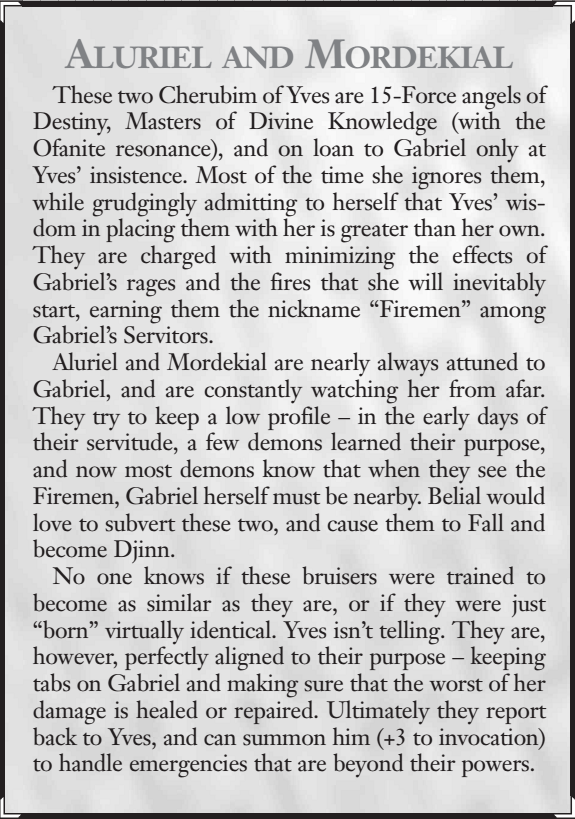
Gabriel's Word is served far more by her angels than herself, these days. Her madness keeps her from actively punishing the cruel. What dominates her mind, instead, is a need to destroy that which hurts her. However, giving into that strengthens the destructive aspects of the Word of Fire, which strengthens Belial. She is thus constantly fleeing from herself, as only she can truly threaten herself. Well, her and perhaps Michael. The only being she will stop for is Yves. Some relationship lies between them, and she seems to see him almost as a father. He can stop her with a single word, and is the only one that can call her back to clarity, even briefly. If he says something is important, that can get through to her.
What Gabriel has never lost is her utter certainty in God. She goes where God directs and acts as she thinks He desires. She does not ask to understand Him, she just knows His truth, and she is all the more tortured by the contradictions of Belial's Fire. While it may tear her apart, it also affirms the righteous nature of God, which she hears and knows deeply. She is passionate in serving God and hates all those that would limit or judge Him. In Archangelic politics, Gabriel is a dangeorusly unstable variable. Only Yves knows her well enough to predict her at all, and he says little. Her sigil may show up, carried by Soldekai, at any time to represent her vote, which could go anywhere.
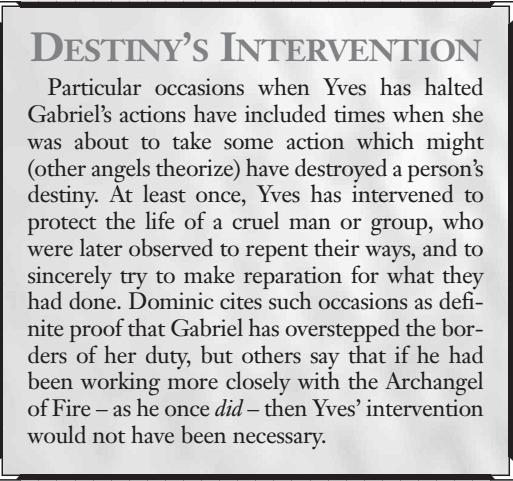
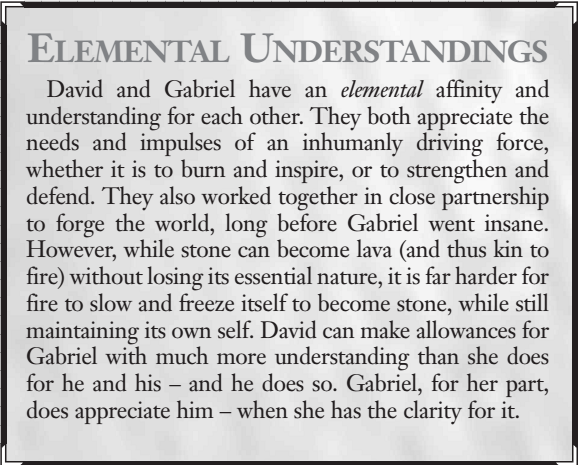
Superior Opinions posted:
Blandine: she has a great dream, but I fear it has consumed her...I've tried reaching out to her, but I don't know if I ever penetrated her madness to the hope I know lies within. She can be destructive, dangerous, insane. Still - every child fears the dark, and she does bring Light...
I liked her, I think. I think she has visited me recently, in another guise. She sparks fires, and fans embers to flame. Yes, I'm sure I liked her...
David: She is whom we will all someday become. Pure, primal, unfettered, just as fire should be. She is the unstoppable force to my immovable object, yet we are more alike than different. I hear her roar echo deep in the Earth; how long can her rage be denied?
Some things are eternal, and David is one of them. I envy him his devotion to duty and am grateful for his friendship, but at times he is too hard and cold. Stone is very strong, but ultimately it must be broken down and put through the fire to be of any use.
Dominic: Apostate, whispering secrets and heresy, utterly insane. Her spark spirals into the cold of Hell - and when it does, Judgment shall renew the Holy Flame of wrath and punishment.
He calls me mad. He would bind all with chains of laws until Heaven is frozen crystal. If any fire burns within him, it is an icy flame which gives no light. Better ot be mad than cold and sane, a blind worm crawling in the dark.
Eli: She's intense, you got to hand it to her - she puts up with a lot of crap. And she really needs to lighten up - she's way too quick to torch those who could be put right with a little effort. But I'll tell you something - I would be nowhere without her. How many stories were born around a campfire?
His flames have broken free, and now he runs across the world like wildfire, destroying the old and bringing new growth. I understand that. But there is something dangerous, a lack of balance in him and his angels - they love so much and know so little...they are so beautiful.
Janus: Pure, golden, untamable. We have a lot in common, except she's let her Infernal counterpart get under her skin and drive her over the edge, and I'll never let that happen to me. The way she is now, I just don't understand her. That's okay. I've learned not to fan the flame.
No solidity, no stability, each movement of his is a mirrored dance - he moves around me, and his changes bring me nourishment, fuel my fires. He is what he is, and contradicts himself because he must.
Jean: She has no idea what she does, and cares not for the results. She has long since left the burden of ethics and sanity behind - now she consumes without thinking. Her fire burns out of control. It has ever fallen to me to clean up the messes she makes - I have had to learn to temper that which she cannot properly rule. If only she could be channeled, controlled, made biddable - what a force she would be to harness. The situation requires my consideration.
He is so purposeful, so certain, and he leaves such fires of inspiration where he touches. But he chooses where to touch, upon whom to bring his clarity, while I move where God directs, where the living fire runs, where the humans call me. Man's flames may be controlled by him, but God's will never be.
Jordi: We fear her, with good reason. She is the flashfire that kills all, whether she means it or not. Still, that firelight draws us all. How can we deny that which both repels and calls us?
He is passion, as are his animals, pure in his nature, devoted in his service. Others believe they are wiser. They are all the more foolish for it.
Laurence: Gabriel's Servitors are dedicated and noble, but Gabriel herself cannot be relied upon. She is a primal force whom I've given up trying to direct. In her rare moments of lucidity, she delivers amazing intelligence, and I know she possess insights even Yves does not.
He glows with the same fire that consumed Uriel, but his is a more tempered flame. He burns brightly, but he flickers with uncertainty. He has not yet been through the crucible...we shall see what emerges.
Marc: A curious problem - she is ultimately in equilibrium, swinging between extremes. Her Word represents a process, by which things are transformed - there is fuel, and a spark, and a balance of energy released versus fuel consumed. She understands cycles.
Yes, yes, he plays the human and occupies himself with small things, petty things, money, goods, manners - but beneath it all he knows the grace of fire shared, communication which gives virtue to both, the transformation which we bring to each other.
Michael: I am concerned by her unpredictability, but I would not take action against her. She carries the original spark of the Divine. If the situation deteriorartes, I would not hesitate to do what must be done...though it would be a tragic day for us all.
He is one of the few who knows the battle which we fight in. His passion is a fire that will hold him steady through his battles. His Servitors can be cruel, and feel my wrath for it, yet they have an ardor that few can match. Courage is their flame, a constant one.
Novalis: "Ah my foes, and oh my friends - it makes a lovely light." Seriously, if Dominic could put aside his unthinking hatred, if Laurence would welcome her back with open arms, we'd see how transcendent Love heals everything. Hers is a Discordant soul banished, misunderstood. And yet her madness swathes her in the kind of barrier that not even my most gifted Servitors can hope to penetrate. Still - have you ever seen a forest after a fire? A few years pass, and it is renewed. There is wisdom in that.
Acceptance - everyone must accept the fire. I would see wisdom in her, but her drive is so much slower, the pulse of vegetable life that drives towards the sun and then falls again. In time she shatters rock and changes the face of the world, but there is not time. There is not enough time. The fire is faster.
Yves: I have long since put the past behind me - I have seen how others have taken words and twisted them. It is not my destiny that I am concerned about, but all of creation's. In the end, Gabriel will remain - this I have seen, as I have seen her aurora burn over the horizon of potentiality. She is the fire that speaks to patriarchs and saints, she is the holy inspiration that moves humanity to wisdom. Wherever she goes, there is God.
When a long time passes and we do not speak, I remember his madness...his quiet, deep, essential madness. He is such a good friend and the kindest of them all.
Andrealphus: Poor lost Gabriel, torn between her prophecies and the rest of the universe. She and her Servitors are so deliciously passionate - dangerous, perhaps, but who could resist such burning eyes and bodies?
He burns for all the wrong reasons - the passions of the flesh, the obsessions of the body, never the true inspiration or the desire for righteousness. He willfully blinds himself to the pure passion within him, that which he once was - for is not divine Love one of the greatest flames of all?
Asmodeus: A dangerous wild card who upsets the settled order of Heaven, and an unpredictable gamepiece. It is a pity that Dominic cannot control her better. Her servants have an annoying habit of detecting those who are...efficient...in my service.
Burn the boards, shatter the pieces, tear away the self-written rules which blind you, Asmodeus, and see the truth. God does not play games with his children. You are ashes and cold iron, charred and bitter.
Baal: Her insanity is a major strategic advantage for the forces of Hell. Imagine if she were coherent and focused her attention on the War, and cooperated with Laurence and Michael! Anything which keeps her at odds with the rest of Heaven, or widens the divide further, is to our advantage. Her fits of inane ranting prophecy are unimportant.
There are mirrors all around him, but the cruelest are behind his eyes, where he still sees the Archangel of Valor in all his pride. Baal's arrogance is his weakness. Every human soul is a living insult to him.
Beleth: She is a nightmare to many, which pleases me - but the inspiration which she brings is not welcome. She fears the loss of God. I wish that I could make that fear a reaiity.
She knows fear, she is fear, she understands fear, but most of all she denies her own fear. Her hands are ice and her eyes are knives, and her footsteps burn the Marches where she walks. Cruelty is in her mouth and heart.
Belial: That bitch will die . Her Word will be stripped away from her, and she will writhe in agony as she sees me enthroned in her place, taking the whole of Fire for myself. Her death will take years. Decades. Centuries. She will learn to curse the name of God.
Foul corruption - he soils my Word by his very existence. I scream each time I feel his destruction and entropy within my soul, I cry to Heaven for mercy, but I am not yet answered. The fires will cleanse him. Fire must cleanse him. It must. It must .
Haagenti: she hates Belial, which makes her okay with me. If only her idiots would stop frying my people - mmm, frying - we could get something going! She's the fire that cooks my food, or something like that. I leave the philosophy to Kobal.
He is cruel without knowing it, without realizing it. He takes bread from the mouths of the starving and gives it to those who have no need of it. Either he must learn better, or he must burn - there is no middle way.
Kobal: How amusing that Fire doesn't catch my spark. No matter, I've a special spot burning just for her... Pathetically simple to manipulate - all the better to mock you with, my dear.
I will not abide his cruelty. His constant torture of others stokes the fires of my anger. He thinks his comedy grand, but it is really empty of life and vigor. Tired. He should be extinguished.
Kronos: I will not be complacent yet. She is swift to strike, and many fail to meet their fate because of her angels - or worse, find inspiration and meet their destiny. When she hears the voice of God that brings only fate behind it, then I will have won.
He is entropy which my fire shall burn away, darkness that my light shall banish. He is Yves' antithesis, and his understanding is twisted, warped, wrong . The past may belong to many, but the future belongs to God.
Lilith: It's dangerous to try to fulfill a lunatic's Needs - her urge to punish cruelty makes dealing with her worse than walking through a minefield. As likely to flame someone as not, too. God drove her insane, another cruelty to his name, and her so-called prophecies are visions of madness. Yet her ravings can be...unsettlingly relevant .
She is a Princess of Hell. She is alone. Not cruel, not kind; her sins are omissions, her mercies a lack of malice. Freedom enslaved to darkness, enslaving light - how does she reconcile the division in her nature?
Malphas: It's beautiful. Look at the factions in Heaven, formed by her, forming around her. She has become a living instrument of discord, whether or not she wants it. If only she were just a little bit more insane...
He foments cruelty. The factions he creates torment each other, and then torment themselves yet more. Malphas twists the words of prophets to break their religions asunder, and shatters a man's faith in God, in humanity, in his closest friends. He is a spoiler and destroyer, kin to Belial in his urge for destruction.
Nybbas: Insane chicks do win Oscars, but her peformance got old centuries a go. If I need pyrotechnics, I've got Belial. Now, if she would agree to some full frontal, her act could make a comeback...
Pathetic worm. He has no inspiration. One touch of my fire would burn him to ashes.
Saminga: Burning kills people. But flames keep people alive too. Worse than Belial.
A maggot who crawls in the mud and has never dared to lift his eyes to Heaven. Pitiful creature, inhabiter of a rotting corpse. Lift up your eyes, Prince of Death, and learn of life.
Valefor: Stealing inspiration and passion is an art all of its own. As for stealing fire from Heaven - well, hey, it's been done before, and besides where's the challenge when she gives it away so freely?
As long as he stands in Hell, what he does is sin. I saw him and his Servitors in the shadows, creeping, hiding, taking the holy Fire from those who need it most. It shall blacken their hands and burn their souls.
Vapula: She has tried to comprehend the magnitude of my ambitions, but was too weak-minded to share the glory.
There is a dark scream which corrupts all it touches, and he welcomes it like a house cat. I have seen it! I have seen how it sits on his shoulder and purrs, and claws pretty patterns in his skin. Oh, those claws must dig deep, Vapula. Do they burn?
Soldiers of God: Who is there that would deny their fire? They bear God's touch in them for His hand has wroughtm ighty wonders in their souls and flesh. They have given up their will in His name, and sacrificed their lives in His holy temple. Behold, ye hosts of Heaven, how great a thing the least of humans can do!
Soldiers of Hell: What a thing a spirit is, to be sold so cheaply! They are paid with corrupt coin, which eats them away body and soul, till there is nothing left but sin and darkness. Look at them, agents of Lucifer, writing his testament in cruelty upon the flesh of their brothers. Let them burn! Let the flames take them into the darkness, to the payment that they have earned.
Sorcerers: What does it profit a man to command demons, if by doing so he becomes worse than any demon? I have walked through the blood upon the floors, I have heard their cries, I can count their voices in the night. One in a thousand calls with clean hands and a pure heart, but the others are stained to Hell by the darkness that runs in their veins.
Ethereals: They crawl and scuttle through the wilderness which men create from their own minds, and they are so far below God, for all that they claim His majesty, for all that they would steal His mantle. How shall the Almighty fear the creations of his created? Let the cruel know His wrath, and the gentle His mercy.
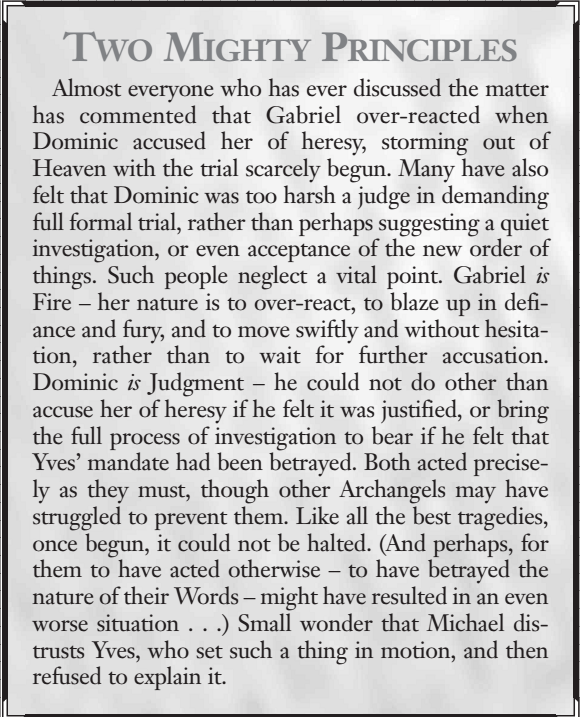

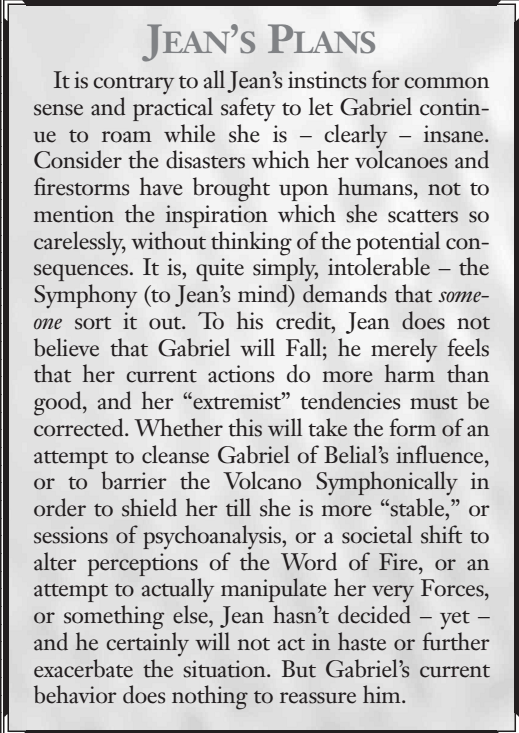
Next time: The undying fire
A Burning Fire
Original SA post Superiors 3: A Burning FireVariants! The Insane Gabriel is...well, nuts. She may claim she hears God's voice, but no one can prove it. Maybe she does hear God, but it's driven her so mad that shecan't interact on anything like an angelic or even a human level. Things burn around her constantly, and she's obsessed with smiting the cruel wherever she finds them - including other angels. Most sane angels avoid her, and evne Yves, Michael and David stand back after pointing her in a particular direction. Soldekai might be loyal...or he might be planning to take her Word and her place, undermining her and reaching out to other Archangels. The Comedic Gabriel is a ditz, 'accidentally' setting fire to things, commenting on hairstyles and listening to CDs while prophesizing in rap. She's incapable of being in the right place at the right time and is perpetually five minutes late. When she punishes the cruel, she might show up, giggling, in bondage gear. Her angels are even worse. Or, perhaps, she and they are stereotypically stern, but blind to anything that goes on behind them. They'll spank children for cruelty to gerbils and fail to notice the archvillain nearby. They might be wildly impulsive, doing things for no good reason, and of course they all smoke. Gabriel the Manipulator, meanwhile, claims to dictate God's word, but can't be verified. It's all some deep scheme she's set in motion. She may not be sane, but she is perfectly lucid, even if she doesn't appear so. She has her own agenda, perhaps virtuous and guided by a higher power or perhaps setting up Michael and Dominic to wipe each other out so she can seize power.
The male Gabriel shared many traits with Gabriel's current persona. He was intense, unpredictable and rarely stayed in one place long. He was guided by the divine, so his behavior was erratic. However, he had a core of stability and self-assurance that is not present in Gabriel's current state. He brought the power of Fire into focus, harnessing its energy to God's will. There was no way to distract him, and being the focus of his attention was like standing on the sun. It was always clear who or what he was thinking of. In ancient times, he spent a lot of time around David, Janus and Oane,s the Archangel of the Waters. They balanced each other. But after the Fall and the rise of Belial, Gabriel's sanity began to erode. When Belial slew Oannes, Gabriel was further destabilized, and Dominic's accusations were too much for his already stressed mind. He lost his certainity and center, fleeing to a female form to find his former clarity. If the male Gabriel were to be seen again, his single-mindedness would be overwhelming. He cannot be distracted from his goal, but once the goal is met, he is gone.
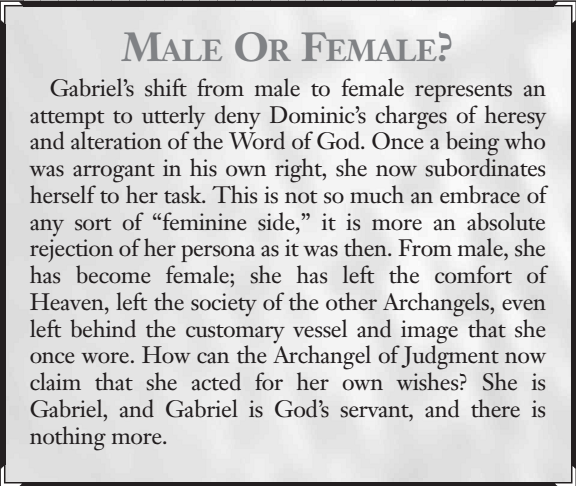
The Volcano, Gabriel's Cathedral, marks one side of Heaven. It doesn't really matter which, as Heaven need not obey Earthly geography. It is a huge mass of rock containing a giant crater of lava. At the center is a high-towered fortress of bronze, the Citadel of Fire. This was once Gabriel's original Cathedral in the Eternal City, but she took it away as she left Heaven. No trace of it remains in the City, though it is believed to have hung in the sky over the Halls of Worship. Ofanim patrol the crater rim, while Malakim and Cherubim man the Citadel's battlements. The Volcano was once a mountain, site of the duel between Michael and Lucifer. When Lucifer was cast down, the top of the mountain went with him, becoming the foundations of Hell. Any angel approaching from Heaven must head away from the Eternal City and the center of Heaven. The Ofanim will steop them, but let anyone with a reason past, even Judges. Then, one flies to the Citadel, where the Malakim and Cherubim will meet them and ask their business. A sensible answer will get you inside with an offered guide (or a mandatory escort, for Judges considered legitimate). Judges not considered legitimate will be taken to a senior Shield. The guide is to keep you from getting lost in the Citadel's confusing structure, and honest desire to admire the Cathedral's beauty is not long considered a sensible answer but an admirable one.
The interior of the Citadel is of bronze, gold, silver and other metals, with the walls covered in gemstone mosaics and hammered reliefs. The rooms are wide and specious, heading down into the obsidian and marble badrock of the volcano. It has been described as Coptic or Islamic architecture, and few surfaces are undecorated. The place smells of incense, lava and candles, and all rooms are endlessly lit by candles and hanging flames, echoing with the chants of the angels of Fire, who often prefer to spend their spare time singing God's praises. Most angels of Fire livei n the bedrock areas, in rooms formed by bubbles of stone or carefully sculpted black glass. Their Hearts rest in stone niches lining the tunnels near central lava flows. From tiem to time, a room will vanish, but they usually come back later. Angels of Fire do not discuss this with anyone.
The Cathedral is hot, an endless dry heat ranging from pleasant to incandescent. No fire there will burn any human soul nor any angel of Fire, but other angels must be careful. Some flames are simple decoration or symbolic, but others are real and painful. Gabriel herself can grant immunity to the fires, and will do so to any angel that receives one of our attunements, Distinctions or Rites. The lava is harmless to her angels, who often swim in it, but it will burn others. Fortunately, it's easy to fly over, if one is allowed to do so by the Ofanim guards. In the highest tower is the Dictorium, which holds records of all prophecies Gabriel has ever spoken or inspired. Her angels pass word of any prophecies they hear of back here, and they are copied down by Seraph scribes. They are stored high in the tower, on scrolls of metal and books of glass, guarded by Cherubim. It can be reached from Yves' library, but that's not always pleasant, given the sudden heat. The prophecies are kept in the order of their delivery, with the eldest first and highest, but there is an indexing system referencing events, people and themes. It is wise not to ask about Armageddon - there are years of references. Any angel may enter the tower at will, but other Words will need permission, though the Cherubim usually grant it. Gabriel herself never enters this tower.

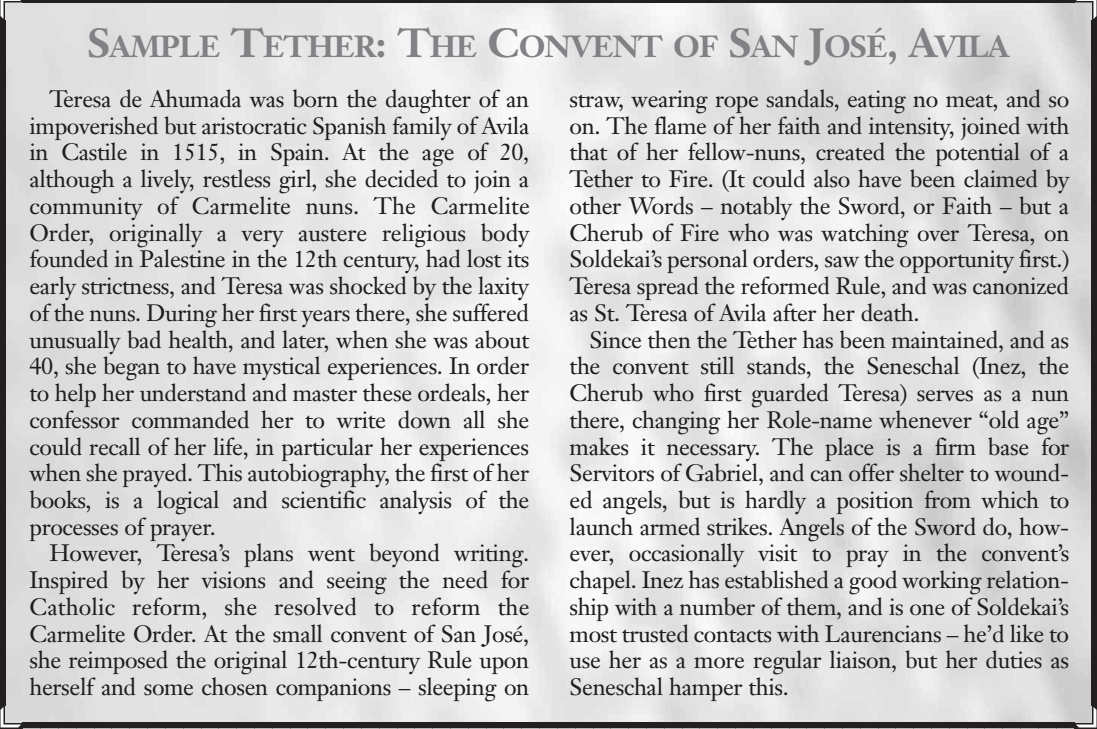
The Volcano stands on the border of Heaven and the Marches, but it's not easy to enter the Marches. You must walk or fly around the rim of the crater, away from the border with Heaven, until the sky grows dark and the wind is strange. Then, you must land on a particular cleft, which leads to a rough path down the Volcano and out into the Marches. The senior angels of Fire show this to their juniors only once they have some experience, never before. Too many young angels have gone out into the Marches alone to fight cruelty and found themselves out of their depth. This path can also be traveled in reverse, and has been used by angels of Fire, angels of Dreams, and even demonic and ethereal spies, though so far none have made it to Heaven proper. Some demons have made it in, seeking redemption, but it is no easy path for them. If they manage to make to the Volcano to ask for help, however, they will not be turned away.
Angels of Fire are always conscious of Hell, far below them. They know their history and that their Archangel was persecuted by Dominic just for obeying God's will. They live constantly with her urges to prophesy and punish. They are intense, even to other angels. They don't understand how others can be otherwise. They exist to bring the flames of punishment and inspiration. They have no peace - they are driven, ardent and unresting. The best they can manage is the slow pulse of lava, their heat hidden within, or the brief calm of a campfire burning within limits until it gets a chance to spread. Most of all, they know that Gabriel is God's messenger, that she brings His Word to mankind. Many believe that this puts them closer to God than other angels. This arrogance can be either mollified or made worse by time on Earth. Some of them can be 'corrupted' by 'lesser priorities' or fall too much into the passion of Fire, rejecting taboos and laws in favor of divine justice. However, they never stop supporting each other. They'd never admit to loneliness, but they sometimes long for the company of others who can understand their passion, and that means each other.
All angels of Fire burn with a terrible urgency. They know many believe their Archangel to be mad, and some even revel in being near-outcasts. They are not mild, and in all they do, they take it to extremes. They love, not like. They hate, not dislike. They do not do half-measures. Many are driven to fury by casual cruelties, the kind that humans tolerate as normal - criticism, bullying, and so on. They punish cruelty always and will not let themselves be stopped.
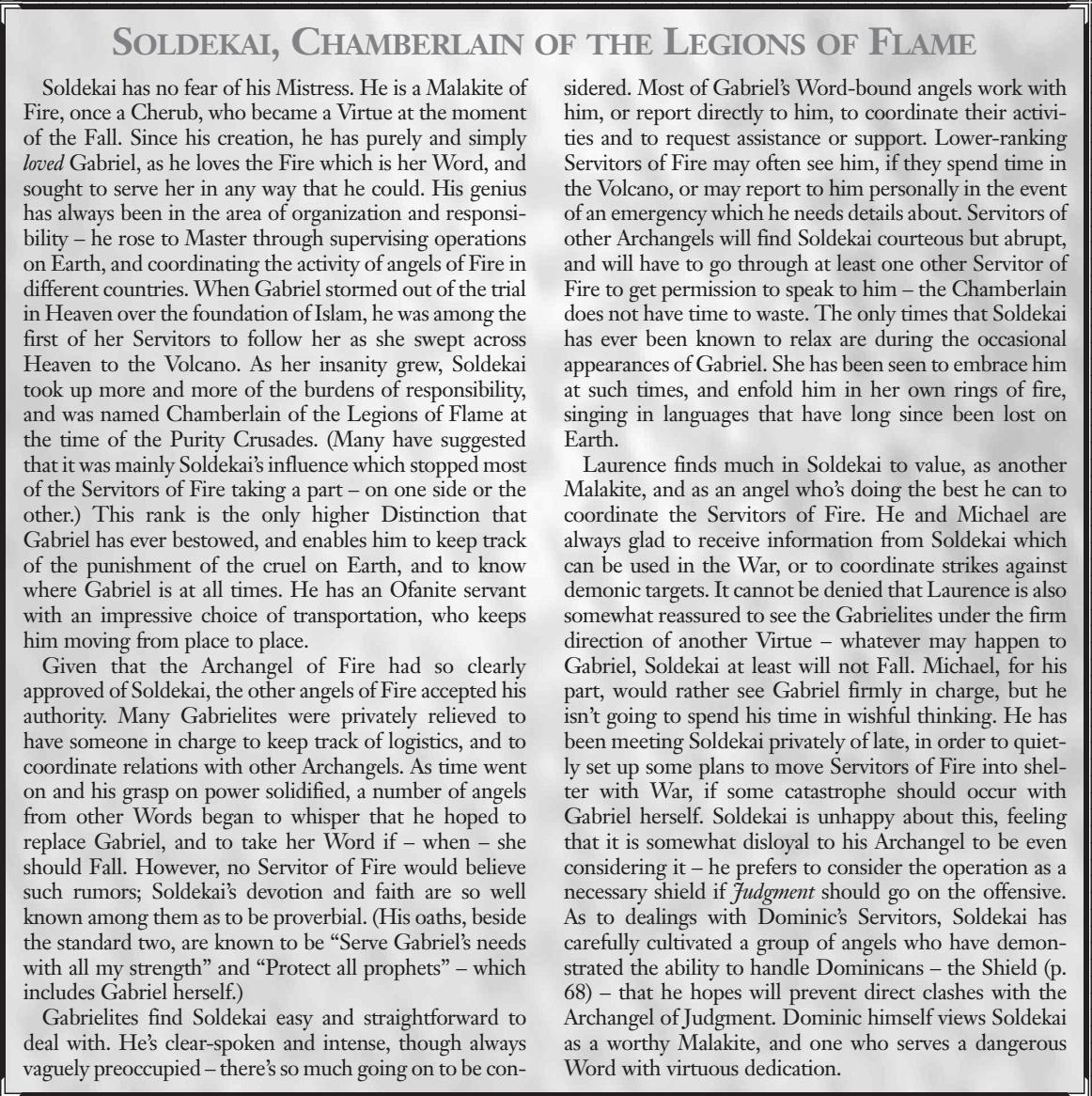
Gabriel is in charge, when she's around and has orders. Otherwise, Soldekai commands her angels. His authority is not quesitoned, and some angels, Wordbound or with Distinctions, work directly under his orders and pass them on to junior angels. Others, mostly older and more potent Wordbound, work solo or in small groups on projects that interest them. Even they keep Soldekai informed of their status, though, and give assistance as needed. He will often assign junior angels to work with them and gain experience. Most Earthbound angels of Fire report to Soldekai, and while they may have a lot ot freedom, there will always be another angel that knows where they are and what they're doing. Even if they don't obey that angel, they'll be in contact. Soldekai is a deep believer in the buddy system, and likes to assign angels in pairs. One angel of Fire, after all, is prey to passion and doubt, but two tend to keep each other stable, or at least safe. Malakim are the most likely to fly solo, though, given that their targets are chosen for them. Any order assigned by Soldekai personally will be obeyed, if perhaps grudgingly at times. However, two angels of Fire that meet at random may seriously clash. Authority generally runs on closeness to Gabriel and the Word of Fire, so angels with Distinctions obey Wordbound, usually, and other angels obey both. In the case of two angels of equal rank disagreed utterly, a third, generally an Elohite, will be called in to arbitrate.
Soldekai has only limited power of reward and punishment - he can't deal with Discord or dissonance or give Attunements. However, he can teach Songs and provide Roles and so on, as well as provde vessels from a stock kept up by Laurence, Gabriel and Michael. Gabriel can give Rites and attunements, and she tends to be capricious, guided by the Divine hand, in her rewards and punishments. Sometimes, a small act will get massive praise, while self-sacrifice will only get a backpat. If an angel fails, any punishment will depend on why the failure happened, and will be given in addition to the dissonance from failing to punish the cruel. Laxness and carelessness may get scourging or loss of attunements and forced penance, while deliberate cruelty may merit Force-stripping or even death. Failure despite best efforts will generally not be punished by any superior, just the angel involved. Success in punishing cruelty is rarely rewarded, but missions will result in more significant rewards. Only Gabriel can grant Distinctions, and she rarely does so. When she does, it is generally unexpected by anyone.
The cruel must burn. That knowledge is deeply felt by every angel of Fire. Every angel must punish the sinner they are focused on, and in doing so, they lighten the world's cruelty that torments Gabriel. Sometimes, though, you can't manage it on a schedule. You might not have a chance to get to your target or might have to delay for some reason, to give them another chance, perhaps. This failure will earn dissonance. It happens at some point to every angel of Fire. It's not usual, but carrying a point or two of dissonance is understood by angels of Fire. (Judgment tends to disagree.) Naturally, you should be doing your best to fix things as soon as possible, though, and the dissonance will vanish when your target is punished, so long as you don't give up entirely. Gabriel feels the dissonance of her angels as though it were her own, so she is at once stern and merciful. She feels your pain, but cannot help but channel some of her wrath on the dissonant. fruther, she is forever aware of Belial's perversion of Fire, so her tolerance for dissonance is thin. She is more likely to remove it, but she is also merciless to the very dissonant, especially those dissonant by inaction. She hates laziness.
Many angels of Fire view those that want to serve other Archangels as weak, flawed or disloyal. Love for Gabriel is rooted deep in their being, intense and passionate. To want to leave her is a betrayal, especially those who wish to leave for themselves rather than to better serve others. Very few angels of frie ever ask for permission to switch Superiors. It does happen, sometimes, though. Some are impassioned by desire to serve another Word, while others can no longer abide the wrath of Fire. Soldekai can send them to serve another Archangel, but cannot release them from Fire. Only Gabriel can do that, and that can take time. Soldekai disapproves, unless you're clearly moved by a desperate urge to serve other Words, and even then, it annyos him. In those cases, he will try to arrange the transfer, but he'll usually try to talk you out of it. Gabriel has never refused a transfer, but will usually remove her attunements, though not always the Choir attunement. She also weeps to see angels go, and for many, that is the most painful part.
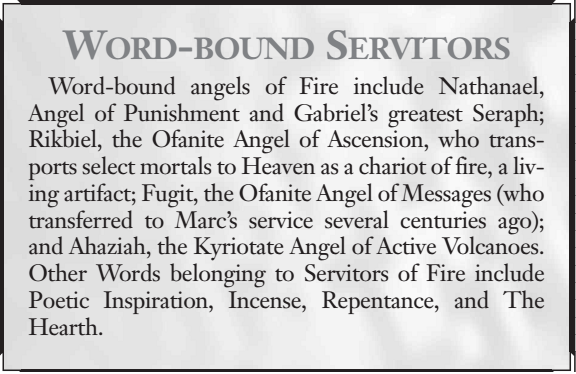
Next time: Burning passion
The Eternal Flame
Original SA post Superiors 3: The Eternal FlameAngels of Fire love Redemption, as both the ultimate punishment for cruelty (as the demon must admit and repent their sins) and a true ending to cruelty with a new life as an angel. However, they aren't especially trusting, and often suggest a Redemption candidate Redeem on the spot, even summoning Gabriel to help. They understand the idea of sitting back and letting more patient angels work on a candidate, but it doesn't suit the natures. Gabriel never refuses a demon seeking Redemption. Some day, but a surprising amount survive. Those who sincerely attempt it but fail and perish are honored by angels of Fire, who respect the attempt. A successful Redemption is welcomed as a brother, as no angel will deny one that Gabriel has accepted, and they will even take pains to defend them. The new angel often takes on a new name, to signify rebaptism in Fire, and they often get assigned to work on Earth immediately, though always with an experienced angel to guard and guide them. Soldekai also likes to get as much information on demonic outposts as possible from the new recruit, which he passes on to more militant Archangels if he can't use it himself.
Young angels of Fire and relievers are trained in the Volcano and are taught to serve as guards, maintain the Citadel, watch over Tether endpoints and study the prophecies of Gabriel. They tend to only meet more warlike angels while growing up, and are often surprised when meeting pacifistic angels for the first time, thought not always disappointed. They may be sent to train in the Groves or any where else Soldekai feels they need specific background, but they know the Volcano is their home and even feel like strangers sometimes in other parts of Heaven. Occasionally, they will visit the Marches, generally under supervision by Dreams. It doesn't usually take long to get assigned to Earth, however. They usually start off as assistants at Tethers, where older angels can guide them. Only two real reasons can lead to a Fire angel never seeing Earth. First, they might be too devoted to some work in the Citadel, like caring for the Dictorium, or they are too unstable for Earth even by Fire's standards.
Any human that knowingly works with Fire tends to be as devoted to Heaven's cause as the angels themselves. They come in two types. The first are humble, self-denigrating and sacrifice everything they have for their work. The second kind are proud, even arrogant, and expect to be appreciated for their help. The angels tend to either display intense interest in the welfare of their human assistants or ignore it completely. This is not so much about lack of charity as the fact that most angels of Fire get obsessed with things like destroying cruelty. Humans either get used to it or get transferred to more understanding Words. Angels of Fire don't always like humans, either. Protect them, yes. Love the in the abstract, absolutely. But humans are so vague, with petty priorities, weak desires, doubts, hesitations...it's hard for some angels of Fire to appreciate that, however much they're devoted to humanity's good in the general sense. Thus, humans appreciated by Fire tend to be utterly intense and, to many angels, about as crazy as the angels of Fire themselves. Humans in Fire tend to work directly with angels, either one on one or as a group of humans serving a Tether. It's rare for them to operate without an angel guiding them, unless they are lead by a genuine, inspired prophet. In that case, the angels may be there to guard the prophet but will not interfere in the prophet determining the group's actions, as divine inspiration is clearly the best guide.
Seraphim of Fire particularly hate those who lie to themselves or others about their cruelty. It strikes at their entire nature. Many believe that any cruel person can be salvaged if made to realize their errors by seeing the truth of what they have done. Other angels have been known to call them unfeasibly idealistic. They will ruthlessly shove the facts in front of a sinner's eyes, to the point of kidnapping them if necessary, though they prefer to avoid that. Other Seraphim prefer to just remove or punish the sinner and keep them from hurting others again. Any of them that deals with those who knowingly profit off the suffering of others has a simple course, though: punish them. Seraphim of Fire are typically in constant aagony from the world's hypocrsiy. There are few people who have never committed cruelty, and even angels often delude themselves about their actions or consequences. Seraphim of Fire know this, can feel it, and they work hard at their jobs to get some measure of peace. They refuse to deceive themselves or abide by lesser stnadards, and they expose cruelty among their own mercilessly.
Cherubim of Fire ensure that those harmed by betrayal of trust are not harmed that way again. They attune to the victims of cruelty - abused children and relatives, thatk ind of thing. They often find themselves working with family circles. They are deeply concerned with their attuned and often take the time to get them to safety after punishing the cruel. Unfortunately, they also tend to become bitter, as they so often see love betrayed and innocence ruined. They become cynical, suspicious of all loving bonds, and have a regrettable tendency to try to isolate their attuned from any possible threat - which is anyone that's not an angel of Fire. Still, they work thoroughly to ensure that the cruel cannot repeat their offenses. (They especially enjoy castration of sexual abusers.)
Ofanim of Fire enjoy their work deeply. They move quickly, hunting those that flee justice. They tend to be very casual towards physical dangers, and their targets fear them as unstoppable. When they catch up, they might hand their victims over to agents of justice...or carry out their own sentences. However, their attunement isn't perfect. They will often not notice a person who isn't currently fleeing justice, or notice minor acts of fear and guilt, like shoplifting. Thus, many get pointed at targets by other Choirs first. There is also a wide urge among them to imitate their Archangel, which can manifest as wildly impuslive behavior in the hopes of being inspired by divine prompting. This results in often insanely reckless decisions and following fragile hunches. Most other angels do not appreciate this.
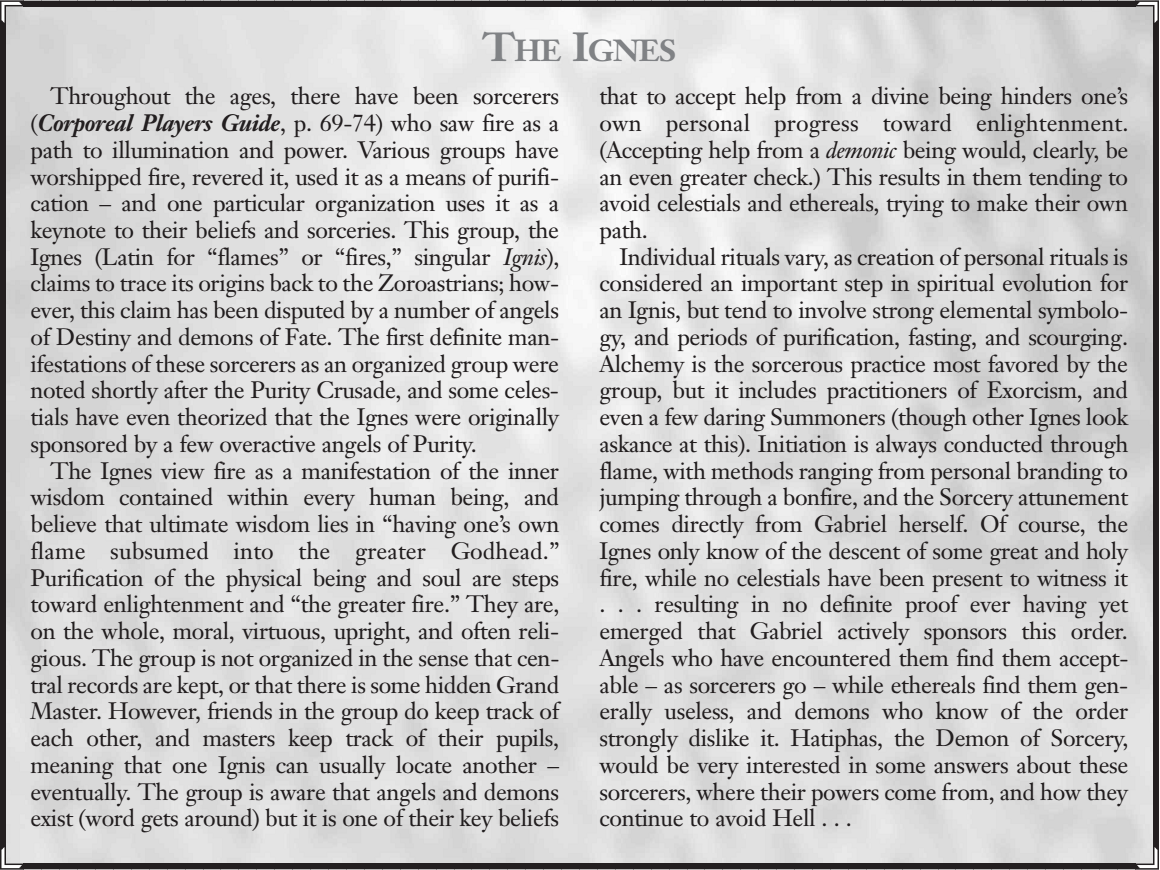
Elohim of Fire are calm yet passionate in punishing those that enjoy inflicting psychological pain. They often find the most efficient way to both punish and prevent repetition of the sin. The second is the harder job. They often spend quite a bit of time studying their targets before acting - it's no good to punish a teacher, for example, if they're just going to take out their anger on their class again. Thus, many prefer to work in the Marches, where they can try to shape their target into a better person...or just traumatize them into better behavior, though Dreamers frown on this. Others engage in psychological campaigns, seeking stress in their victims in order to reach their souls. If all else fails...well, fire and death remain, when you're out of options.
Malakim of Fire do not all show up as trenchcoat-wearing avengers. The ones that do are just the ones that get remembered. Those that aren't noticed are often quiet assassins, quietly pursuing their targets and removing them neatly. They are punishers, executioners, but efficient and without cruelty. They do what must be done. The Malakim can be very creative in their punishments and in spreading the word of not being cruel. While they operate on assigned missions, they often also enjoy 'freelancing' if they find someone deserving of punishment. They tend to be frighteningly focused, and on the job nearly all the time, though they're also known for intensely passionate affairs between missions.
Kyriotates of Fire punish those that harm others physically. They spare nothing - not your body, not your place in society. They change bodies easily and refuse to accept society, custom or circumstance as excuses. Anyone that sins must be punished. One of their facorite tactics is to 'help' a victim resist bullies by possessing them and then beating up the bullies. They don't see this as cruelty, and they're careful not to be cruel - they just inflict justice, and sometimes they even count blows precisely, so as to never hit more than the victim was hit. However, they are often slow to recognize psychological cruelty and will often ask for help from other Choirs in assessing motivations. In the field, they tend to be focused, choosing hosts based on targets and plans, and they often end up courting dissonance by taking cruel hosts and leaving them in nasty situations caused by their own cruelty. They might be a bit dissonant, they figure, but it's so beautifully just.
Mercurians of Fire try to stop those that hurt themselves, and they're passionate about it. Some of them are archetypal confessors and consolers, helping people forgive themselves and persuading them not to punish themselves for real or imagined sins. They are gentle, quiet listeners. Not all Mercurians take that route, however. some take guilty pleasures in torturting themselves, and these other Mercurians take it on themselves to force those humans to stop, one way or another. They won't harm the humans, but have no objection to tough love or pushing them to a breaking point, just to make them snap out of their guilt and act. They don't mind being disliked, because time being annoyed is time not hurting themselves. These Mercurians are devious manipulators, and other angels can see the courses they set their targets on to be dangerous, if not cruel.
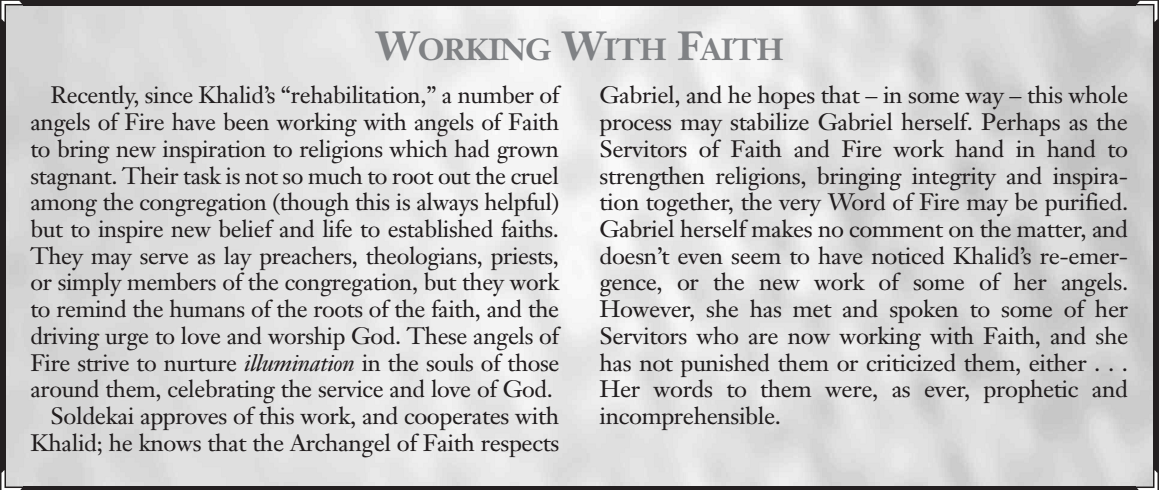
In Heaven, most angels of Fire work in the Volcano, though many are too driven to want to spend much time away from Earth. Thus, the ones in Heaven tend to be young, new or very patient. Some of them are the border guards of Heaven or the keepers of hte Dictorium. Younger angels also volunteer to guard Tether end-points or provide counseling to the weary or Traumatized. Ofanim often serve as messengers, and Kyriotate help as needed, because Soldekai lacks the powers of an Archangel and must rely on them to exist in mutliple places at once.
In the Marches, the angels of Fire uses dreams to learn more about their targets, or even punish them, though the angels of Dreams object strongly to this, as it results in horrible nightmares. That's dangerous for everyone involved. Mercurians in particular find dreams a useful way to learn why someone is being cruel to themselves and to find ways to stop them. Some angels of Fire are also interested in seeing the dreams of the inspired, in the hopes of better understanding both them and the Word of Fire. From time to time, Fire angels also aid the angels of Dreams in their tasks or lead patrols in the Marches to study Ethereals and dreamscapes, which can be peaceful or violent depending on the senior angel's sympathies.
On Earth, there are three jobs for angels of Fire. Punish the cruel, protect and encourage inspiration and guard Tethers. All Choirs are expected to do the first job, even if they have some other function. None of them, after all, can abide the cruel. Cherubim are most often tasked to protect the subjects of inspiration, with aid from other Choirs as needed. Any angel can encourage inspiration, but Elohim, Seraphim and Mercurians tend to do it best, as they can see the best ways to stimulate people. Malakim tend to try and inspire by example more than anything else, but they're often too busy punishing to do much of it. Guarding Tethers is a job for anyone, even Relievers, who serve as good resources for patrols in small vessels. Soldekai has many Tethers to coordinate and few resources, so assigning relievers lets him train young angels and guard Tethers at once. Full angels are needed to fight, sure, but relievers can help in many ways.
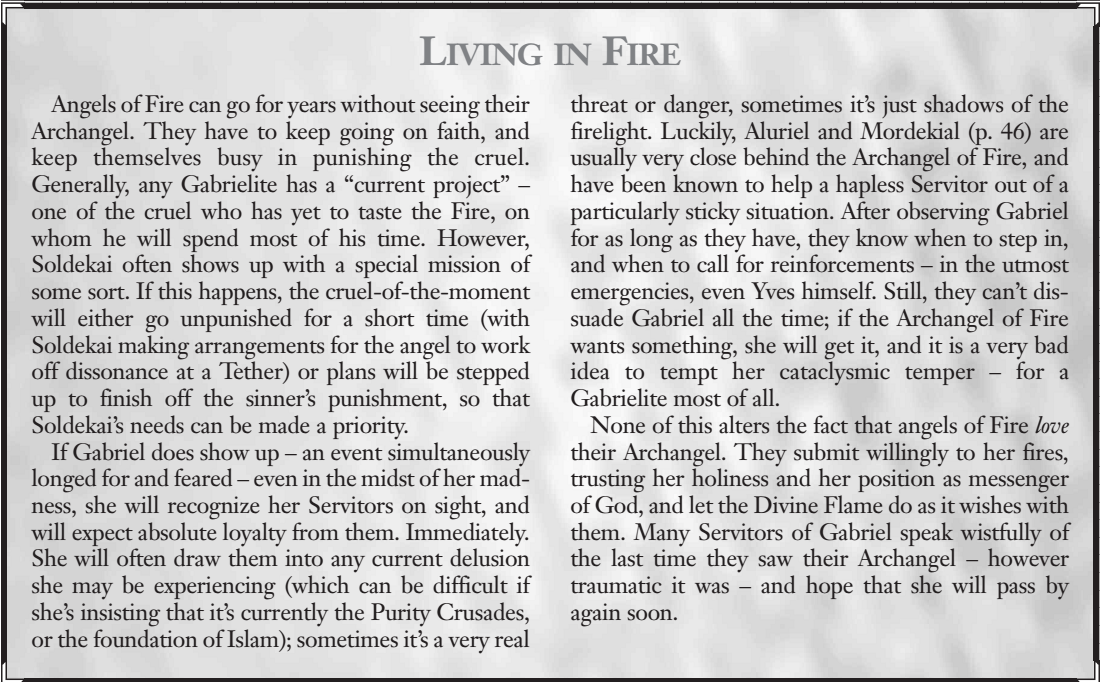
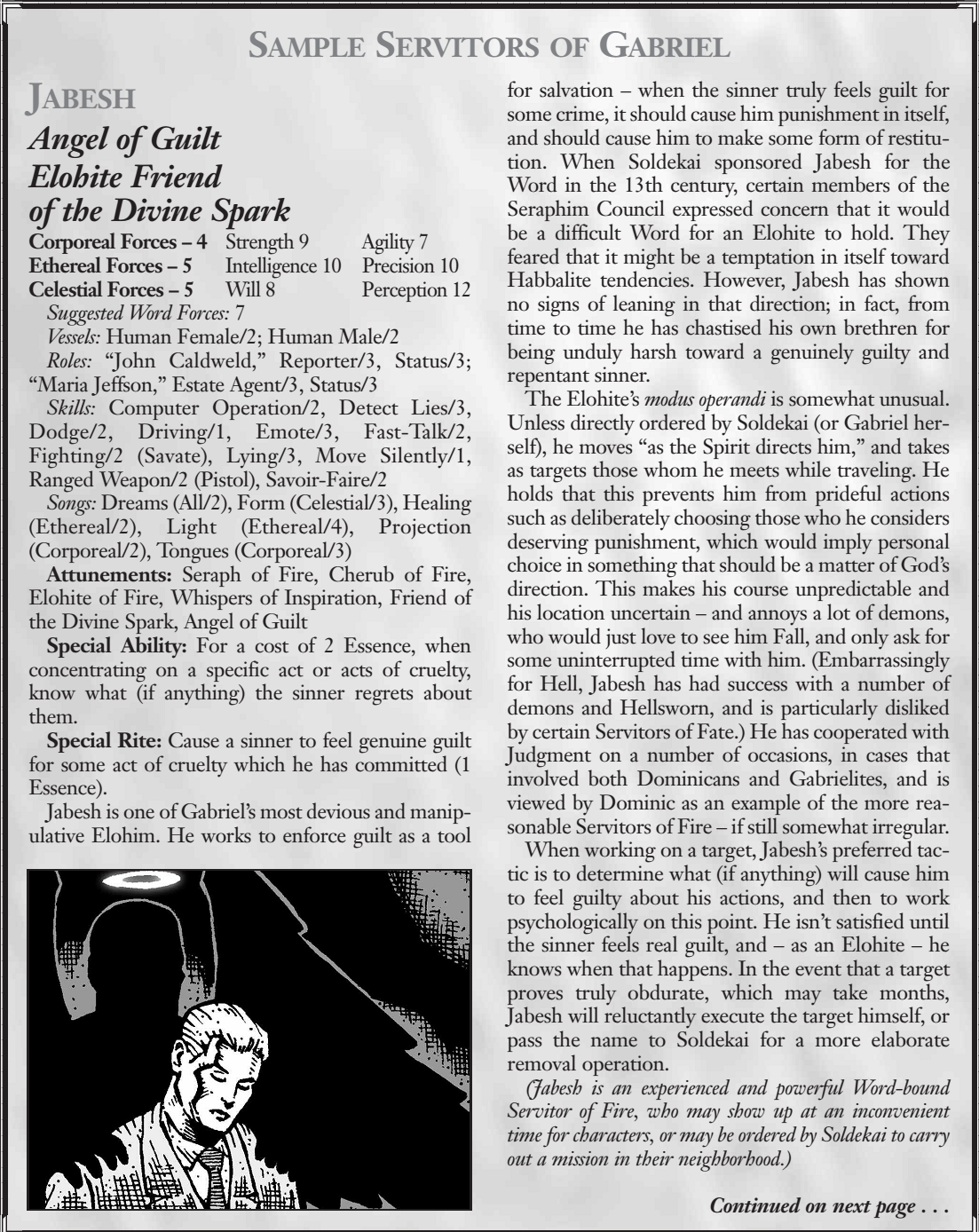
Next time: Final Fire
Hail Big Fire, Allegiance Or Death
Original SA post Superiors 3: Hail Big Fire, Allegiance Or Death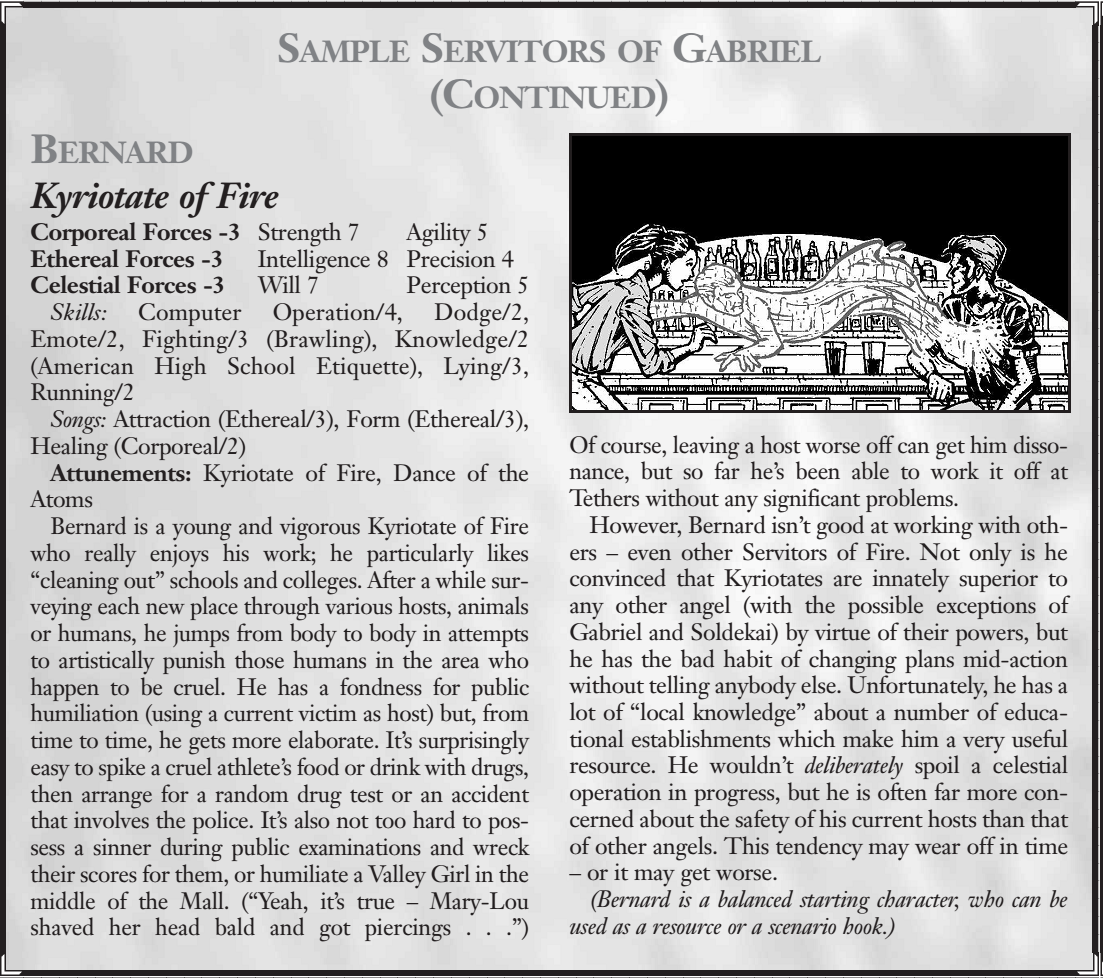
Victims of cruelty need healing, and some angels of Fire devote themselves to that, and also to preventing abuse victims from becoming abusers. These angels, often Elohim, Cherubim or Mercurians, often work closely with Flowers. They tend to be skilled healers, mentally and physically. Angels of Fire also have to serve as messengers often, as Soldekai lacks the ability of the Archangels to easily communicate across long distances himself. The fastest Ofanim of Fire tend to serve as a messenger corps, with the help of Kyriotates and some guardian Malakim. Many Fire angels also work as spies, as their hunting of the cruel often helps them identify a demon in an organization. Soldekai uses this for planning, often in concert with the Sword or War, or to organize assassinations. He often orders angels to hold off on punishing a target for the duration, but he works to make these assignments as short as possible, and works to get these angels assigned to a Tether if they become dissonant. This jobs are seen as painful and dirty ones, even if they're necessary, and no one likes them.
The Oriflamme are a group of Fire angels that hold there's an obvious cure for Gabriel: remove Belial entirely. They devote themselves to fighting Belial and his demons throughout the world. Soldekai sympathizes, though their work is often indiscreet and somewhat suicidal. He will officially rebuke them if they hamper other work, especially of angels of Fire, but he's happy to pass them information and material for their crusade. The group is mainly Malakim and Ofanim, but any sufficiently intense angel of Fire is welcome.
The Shield, a group mainly composed of Elohim and Seraphim, are angels who are good at dealing with Judgment. Their job is to regulate Judgment's work with Fire, to retrieve angels called for trial if necessary and, occasionally, to turn angels of Judgment in for excessive cruelty. Soldekai knows he needs some interface with the Judges, so he made the Shield in the 1200s rather than have Dominic, as Soldekai feared was possible, launch constant inquisitions. The Shield operates as a de factor internal police, keeping an eye out for excessive Discord or dissonance. They aren't well loved, but are preferred to Judgment. They are led by Ja'aina, an Elohite Master of the Flame of Heaven.
The Testers of Faith are not approved of by Soldekai and not known of by Gabriel. They are mainly Cherubim who believe it is their job to test other angels of Fire for their faith in Gabriel. Sometimes this is by quesitoning to see if someone really believes Gabriel is chosen by God, other times it's pushing angels into situations that might cause dissonance, to see how they act. Known membership in the group is a reason for the Shield to take a deep interest in you.
The Mystery Cults are a number of groups among the angels and Soldiers of Fire. They all view Gabriel as an intermediary for God and worship her as such, addressing their payers to her and even shedding their own blood at times when asking for her to intercede with God on their behalf. These cults have names like 'Those Who Serve Through Blood And Fire' or 'The Silent Followers Of She Who Speaks,' and Judgment hates them with a passion. Archangels are not to be worshipped. Soldekai sympathizes with their adoration, but he roots them out ruthlessly, as he must concede that Gabriel is to be loved, not worshipped, and he'd rather not have Judgment given good reason to seriously investigate Fire.
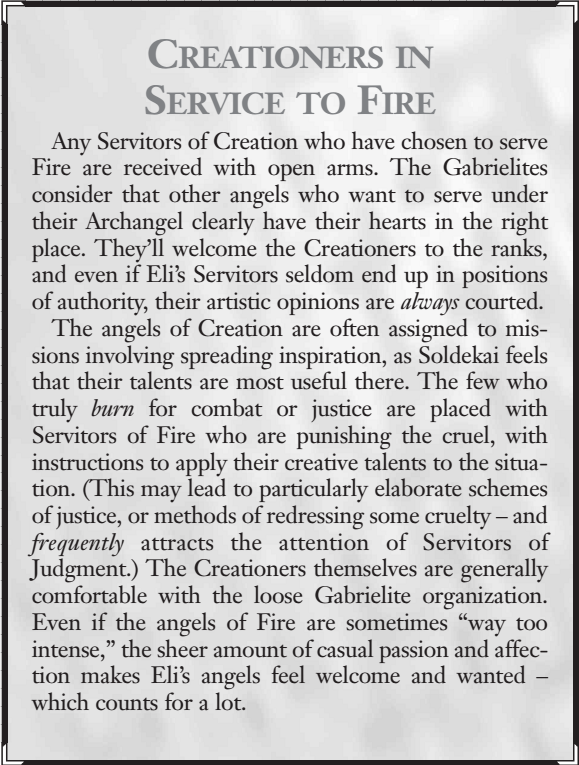
Angels of Fire are often stiff if courteous to outsiders, or come off as abrupt. They appreciate that other angels don't share their sense of urgency, but don't like pander to what they see as mildness or rigidity. There's duty to be done, and failing that, spend your time praising God or doing something passionate. Angels of Fire are impatient at best. They tend to deal well with those that share their urgency or passion, such as War, Stone and the Wind. Lightning and Creation can be accepted, if they're enthusiasts, or the Sword, though they are too disciplined. Dream and Destiny are respected deeply, but there will be frequent arguments about ends and means. Flowers, Trade and Animals get tolerated, but aren't especially liked. Judges tend to be distrusted on sight, save for the few that can prove themselves worthy via dedication, incorruptibility and total lack of prejudice and cruelty...though even then, many angels of Fire won't give them a chance.
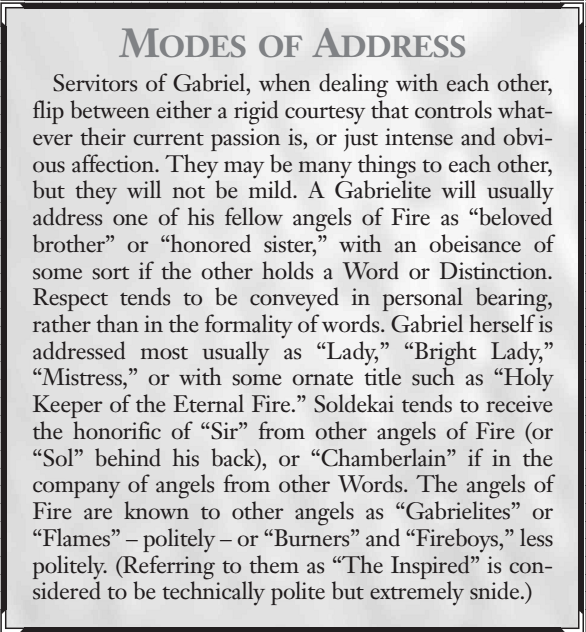
Relations with Judgment in general vary from slightly to very strained. It's impossible for most Fire angels to forget how Dominic's persecution drove Gabriel out, at least from their view. They are not friendly with Judges at the best of times. Judges, for their part, find it hard not to react to this prejudice, or to forget the logical view that Gabriel's obvious madness is likely to be reflected in her angels. The fact that angels of Fire are relatively frequently dissonant hardly helps. Plus, there's some overlap in the judging of cruelty, which Judges often see as meddling and doing more harm than good. There are a few exceptions, particularly when dealing with the Shield, but it's not very common. Dominicans often accuse the angels of Fire of indulgence, unnecessary interference in mortal affairs and heresy, which most angels of Fire disdain, denying any right of the Judges to accuse them. At which point it's time for a report or trial. Soldekai dislikes the amount of time he has to spend on all this, so the Shield are there to try and soften things and, hopefully, get Fire's angels judged by Gabriel rather than Dominic.
Next time: Have faith.
Faith Unbroken
Original SA post Superiors 3: Faith Unbroken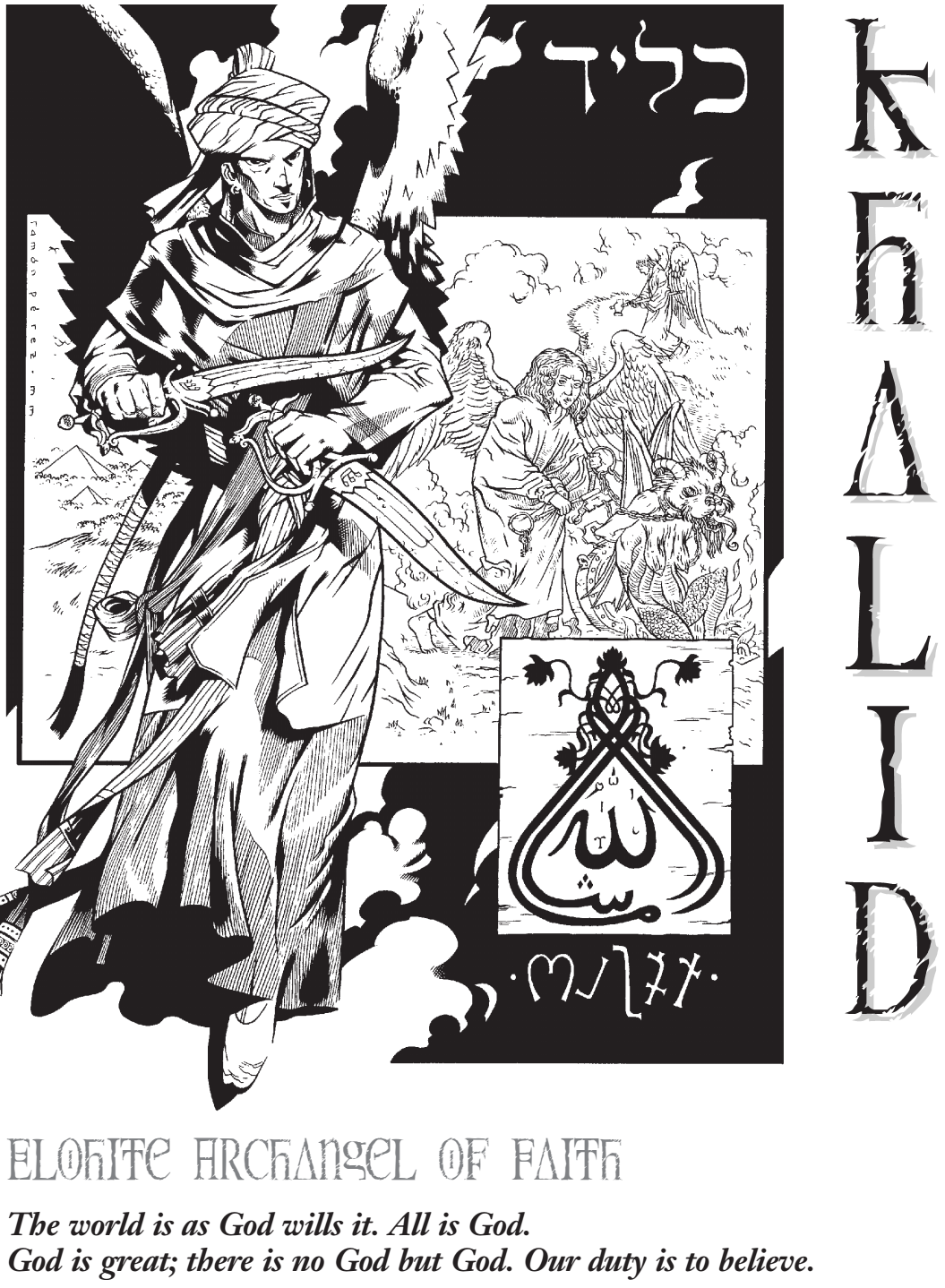
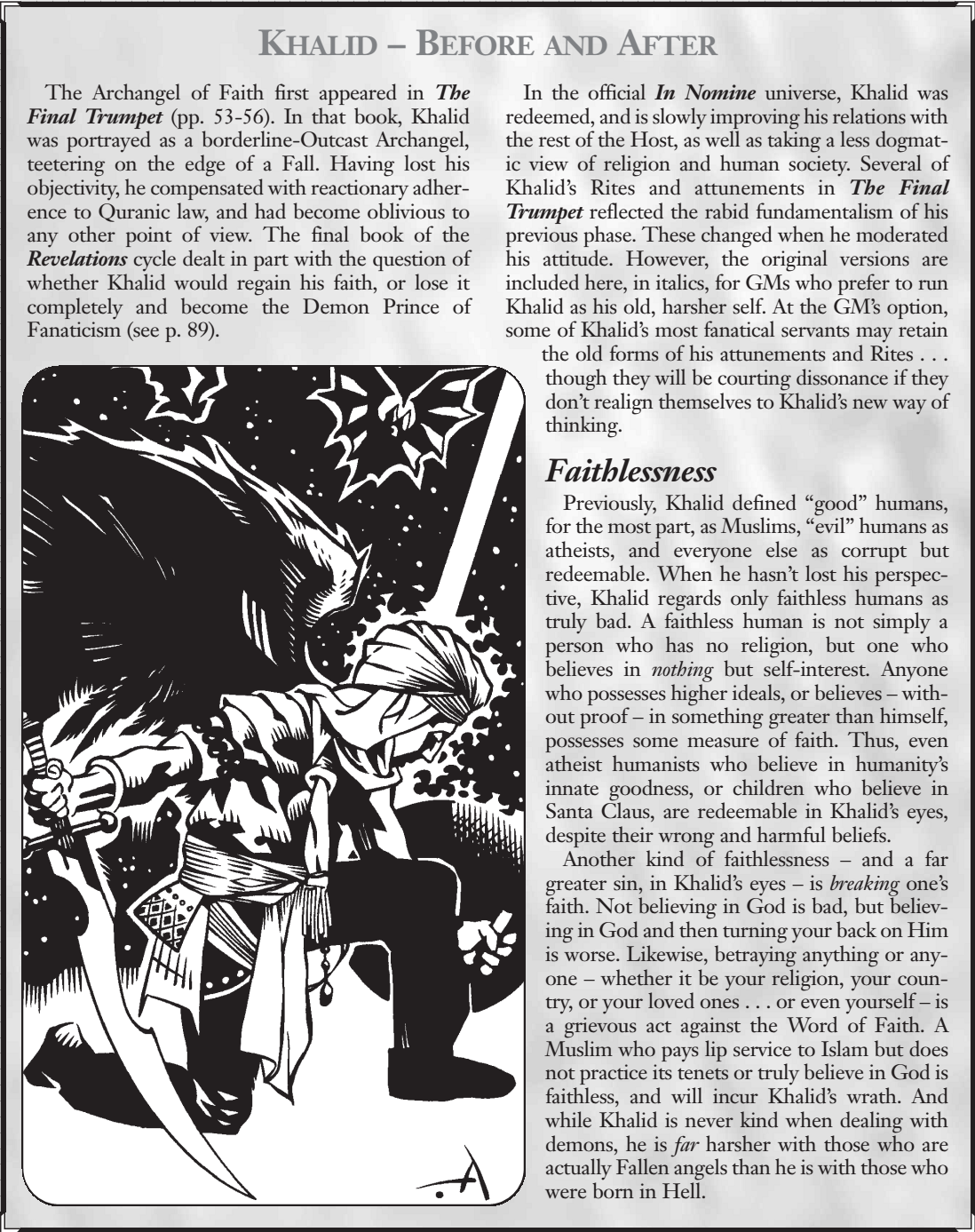
Faith is inexplicable. It must be preserved at all costs, and Khalid, Archangel of Faith , makes that preservation his sole concern. He is specifically interested in the True Faith of pure submission to Allah, which is to say, Islam. Khalid is at once serene, holy, angry and violent. He was once the Angel of Faith under Uriel, and as Archangel, he has earned a reputation of being notoriously unsympathetic. He served Uriel wel lfor many centuries until Uriel was recalled to the Higher Heavens. Laurence was made the new Commander, to Khalid's disgust. Khalid had helped defeat the Demon Prince of Cruelty, Magog, and believed he should have been chosen. He agreed that Laurence was intelligent, had integrity and tactical skill and was not a terrible choice, but he believed that the removal of Uriel was proof that Christianity's time was over. He saw Dominic behind Laurence's elevation, much as he saw Dominic behind the exile of Gabriel.
From that moment, Khalid followed Gabriel into the wilderness, vowing to defend Islam and the Quran against all foes. Jihad, inside and out, against infidels, heretics, enemies and corrupters. He has never seen anything to dissuade him, believing that hte Christian West's triumphs on Earth have been at the cost of their faith, morals and souls. Western 'freedom' is a lie - the righteously free surrender to God's will rather than demanding to foul and pollute themselves, their women and their cities. Khalid sees America as a bloated, drug-addled nation of consumers, Europe as decimated by war and murder, and Russia bankrupted and poisoned by atheist socialism. He does not understand how anyone can doubt Islam, which offers true equality under God, true freedom to seek the divine and true brotherhood of all mankind. Khalid believes it must be defended with all his might. He fought against Laurence's knights in the Crusades, and now he defends it against moral corruption and propaganda. He no longer supports terrorism, but he also doesn't really feel the need to curb it - his primary focus is perserving Muslim faith against the West. If that means sometimes the West suffers, so be it. For angels that supported the Crusaders or the Spanish conquest of the New World to complain about Muslim terrorism strikes him as utterly hypocritical.
Khalid considers Christians and Jews who hold faith to be noble foes or even trustworthy allies. Shari'a has allowed these People of the Book to live and worship in their own way for centuries. The true foes of the faith are not the lesser faiths, but the armies of materialism, agnosticism, atheism and humanism. Khalid sees Christianity fallign to these, and he will not allow them to corrupt Islam. Not all of his servants work in Muslim countries, however. As many as ten percent work in other parts of the world to protect the Muslim lifesteyle and support Faith more generally. His angels are not always as zealous as Khalid, but it is unwise to question his orders. Khalid is a harsh master, punishing failure with dissonance and rudeness with Discord, but he is also gentle to his favored angels and generous to those he loves. Most of his angels are even more madly loyal to him than David's are, for they have faith in Khalid.
It is dissonant for any of Khalid's servants to allow their true natures to be discovered by humanity. They must prevent humans from acquiring proof of the existence of the celestial, and if they allow undeniable physical proof of Heaven to fall into mortal hands, they gain dissonance until it is retrieved. It is also dissonant for any angel of Faith to kill a human with true, unquestioning and unselfish faith in something beyond themselves. Fortunately, few Hellsworn have that - fewer even than most humans.
Khalid's servitors all have the ability to look in a human's eyes and know what they believe in. Further, each has one stat boosted by 1, to a max of 13, which is lost if they ever lose their Attunement.
Seraphim of Faith get +1 Precision. Further, they are able to remain silent or tolerate deception in others with less distress than most Seraphim, if it's in a good cause. This is GM discretion, but the GM is asked to be more lenient with Seraphim of Faith that skirt dissonance in the name of preserving faith.
Cherubim of Faith get +1 Perception and know what someone they're attuned believes in most strongly, as well as how strongly they believe.
Ofanim of Faith get +1 Agility. They are told to help lovers stay together, and as well as faith, they can look into a human's eyes and see any true and faithful love. Further, they heal (Celestial Forces) Corporeal HP per day.
Elohim of Faith get +1 to any one stat of their choice. They can use their resonance to see what someone believes in. However, whenever they break their given word for any reason, they gain dissonance.
Malakim of Faith get +1 Strength. Further, their resonance can detect those who have caused pain with their faithlessness, including pain to themselves.
Bright Lilim of Faith do not currently exist, as far as anyone knows. If they did, they would not get a stat bonus. However, they would be able to use their resonance to tell what it would take for someone who has lost faith in God or themself to regain it, what it would take for someone who never had either of those to gain faith, or what it would take for the Lilim to earn the target's faith.
Kyriotates of Faith get +1 Will. Further, they may forcibly enter a human briefly, requiring a resonance roll as normal but with the target unable to resist. If they do, they can give that person true faith in anything they like for (Celestial Forces) minutes.
Mercurians of Faith get +1 Intelligence. They are charged to make the mundane seem miraculous. Any time that a human accepts as miraculous something done by them which caused no Disturbance, they get 1 Essence.
Fast is an attunement granted only to humans of great piety, almost always Muslims. At any time, starting at sunrise, the human may fast. So long as they do not eat, drink, use any drugs (even tobacco) or have sex, their body will be as a vessel - they will need no food or water, will need no sleep, will be immune to temperature extremes and will not suffer fatigue. Women with this attunement active also do not menstruate. You may break the fast at any time, but can't start a new one until the start of the next lunar cycle. (Going without sleep too long is bad for your mental health still, but you may sleep without breaking the fast.)
Jihad is a Servitor attunement allowing you to declare holy war against a specific foe, which can be a person, movement or even a nation, so long as the subject is human in origin - you can't declare jihad against Hell, a Band or a Prince. Demons working for the target of the jihad are fair game, however. You get +1 to all actions taken against the subject of your jihad and +1 t the Power of any attacks on them, interpreted as liberally as the GM likes. If you ever eliminate your foe completely or voluntarily abandon your jihad, the attunement vanishes. You need to get a new attunement to declare a new jihad.
Rituals of Faith is a Servitor attunement available only to those that are devout followers of an established divine religion. Personal belief systems, cults and pagan religions do not qualify. Every time you perform one of the religion's prescribed rituals, you gain 1 Essence, as per a Rite. Each ritual can give only 1 Essence per day - so Catholics can get it for attending Mass, going to confession or praying. Muslims get it for the five daily prayers, donating money to the poor and 1 per day of fasting during Ramadan. Rituals must be performed sincerely and in accordance with the religion's tenets, and you can't be doing the ritual just for the Essence.
That Which Moves Mountains is a Servitor attunement allowing you to do miracles in the presence of the faithful. If at least one mortal in your presence believes God is aiding them, you get a bonus equal to that mortal's Celestial Forces to all rolls that do not cause Disturbance. (Use the highest if there are multiple such believers.) Naturally, you must not gain dissonance from Khalid's condition while using this. At the GM's option, you may be able to do other feats if the mortal thinks you can and so do you. These feats should be miraculous somehow, but cause no Disturbance or supernatural effects - you might be able to walk through fire unharmed, or hit the ground from an airplane unharmed, or stand still and be invisible to pursuers. Treat these miracles as minor Divine Interventions, but do not take them for granted - they aren't automatic.
Wrath of God (formerly, Wrath of Allah ) is a Servitor attunement that lets you spend 3 Essence to double the damage your next attack deals, after all other modifiers. However, this can only affect faithless humans, ethereals or demons, and does not harm objects either. (Previously, this attunement only affected non-Muslim humans and demons, rather than faithless ones.)
Vassals of Faith know if anyone they see would be able to be harmed by the Wrath of God attunement, though not which type of being that could be affected those people are.
Friends of the Faithful (formerly, Friends of Islam ) get +1 to all interactions, including resonance and reaction rolls, with humans that have true faith in God. (Previously, this bonus applied to practicing Muslims only.)
Masters of the Word of God instead get +2 to all interactions and successful CDs with humans that have true faith in God. (Previously, this instead caused Wrath of Allah to triple its damage instead of doubling.)
Khalid can teach the Songs of Correspondence, Pestilence, Purity and War, among others.
Khalid has no higher Distinctions.
Most of the host, during Khalid's self-imposed exile, saw him as an obsessed ideologue, perhaps affected by Gabriel's madness, and dealt with him only warily if ta all. Since his return, realtions have improved somewhat, though only the militant camp really likes him. Khalid is allied to Laurence and Gabriel (previously, he was hostile to Laurence). He is associated with David, Michael and Yves, who also consider themselves associated with him, as do Janus and Laurence. He is hostile to Dominic. Novalis was, previously, hostile to Khalid, but has since warily decided to be neutral.
Basic Rites:
1. Slay a faithless human. (Formerly: slay an atheist.)
2. Guard a place of faith from danger for one night and day.
3. Inspire faith in something holy. (Formerly: Inspire faith in the symbol of something holy, which included talismans or the Easter Bunny. Khalid was willing, at the time, to reward literally any show of faith.)
Expanded Rites:
1. Convert someone to Islam.
2. For 3 Essence, instill true faith in a faithless person. This is cumulative with the above.
3. For 4 Essence and the loss of 1 dissonance, undertake a spiritual pilgrimage and do not use any celestial powers for the entire journey. This can be done only once per year.
Khalid has a base invocation TN of 2, +1 for a sincere spoken or written prayer (formerly, +1 for a Santa hat), +2 for a copy of the Quran in Arabic, +3 for a religious symbol made by someone with faith in its significance, +4 for a sermon or call to prayer from a devout holy man, +5 for the head of someone who served Hell (previously, the head of a dead atheist), +6 for a sincere prayer from someone without any faith.
Common Malakim Oaths of Faith:
1. I will not refuse hospitality to anyone but a sworn enemy. (Demons, obviously, are sworn enemies.)
2. I will always be polite to my guests and my hosts.
3. I will not harm, nor fail to protect, anyone who has surrendered to me.
4. I will not use trickery or treachery to defeat my foes, if it is my choice. (Khalid requires that clause in case he feels like giving orders to ambush or deceive a foe.)
5. I will never act in a manner that would shame me to see others emulate.
6. I will not allow any insult to God, Heaven, my Archangel, or my own honor to go unanswered.
7. I will not indulge in anything that is haram.
8. I will read at least one sura from the Quran every day.
9. I will pray in the direction of Mecca five times daily.
10. I will maintain a beard in all human male vessels.
Khalid is an ARabic (and proto-Arabic) word meaning 'eternal' or 'immortal'. It is the name Uriel gave to Khalid, and since he became Angel of Faith, he has sometimes added 'al-Din' ('the faithful') or 'Abdullah' ('servant of God') as a suffix. Corporeally, he appears always as a stocky and muscular male Arab in traditional Muslim garb, often with a large sword. He usually wears a neatly trimmed beard, as Muhammad condemned shaving, but he has been known to go clean-shaven to set himself apart from mortals. Celestially, he usually chooses to manifest as a sword-bearing humanoid glowing so intensely that his androgynous features cannot be seen. He exudes holiness, is always coposed, and has an intense and controlled voice. He is clear and careful in his words, and his eyes are solid black, hard and strong. He has a sense of humor, but he rarely laughs.
Khalid is warm and hispitable to all but his foes, and he will never harm anyone who receives an audience with him, even a demon, unless they are foolish enough to attack him and so violate hospitality. He will, however, banish anyone from his presence that is rude or insolent, and if they are his angel, he will strike them with dissonance or Discord. In conversation, he frequently quotes the Quran and, sometimes, other holy texts. He strives to be just and does not make decisions lightly. He continually probes the sincerity of others, and anyone who speaks from the heart will be received better than those that carefully measure their words and say what he wants to hear.
Faith, as Khalid interprets it, is belief unsupported by evidence. Anyone that believes in something they cannot prove has faith. Humans, unlike celestials, can generate Essence by their faith, not as a Rite, but as raw energy to fuel the Symphony. Their faith creates Tethers and strengthens Words. The Seraphim Council were surprised when an Elohite was nominated by Uriel as Angel of Faith, especially as it was a subjective trait, but Khalid proved he understood faith better than any other, and was able to separate true faith from delusion, deception or paganism. As Uriel's angel, he upheld Faith as an objective good for humans, and he was impartial to religion, serving as a censor and detector of selfishness and corruption. He even advised Raphael and Eli on how to promote God-concepts in other cultures.
Even now, Khalid promotes faith in divine religions. Belief in God, Heaven, angels, salvation, human positiveness, friends or family are all good. Faith in anything supports the Word, but Khalid discourages faith in those things that do not support Heaven. They are not supposed to encourage belief in Santa, ghosts, aliens or fairies, and while worship of pagan gods strengthens Khalid, he has no tolerance for it. As Archangel, he embraced Islam as the true faith, and he regards other religions, particularly Judaism and Christianity, as legitiamte and worthy but, in comparison, flawed. Faith, to him, increasingly became defined as 'Islamic Faith', and as Islamic thought became narrower and more exclusive, he found his own faith increasingly causing friction with his Word and his Elohite nature. Since the events of The Final Trumpet, he has reaffirmed the broader aspects of his Word and struggles to accept all faiths as legitimate, so long as they are inspired by sleflessness. However, he still considers Islam to be the best and most perfect expression of faith.
Next time: Khalid's History
Faith in Yourself
Original SA post Superiors 3: Faith in YourselfKhalid is old compared to most angels, though young compared to most Archangels. He was created around 2000 BC by Uriel, at the start of the great experiment of religion started by Yves anc arried out by Eli, Gabriel and Raphael. Uriel approved and had faith in Yves, but did not trust Gabriel's erratic inspiration, Eli's indulgent creativity or Raphael's unrestricted hunt for knowledge. He feared that faith would be too easily tainted by selfisheness or worse, if not held to a pure and rigorous standard. So he made Elohim to monitor the faithful, the first of which was Khalid, assigned to watch the tribe of Abraham. Khalid was devoted to his job, learning the psycholog of faith, its spiritual ramifications and the details of every religion he heard about. He rarely left the Levant, but collected reports from other Elohim of Purity and other angels throughout the world. It was he who first theorized a distinction ebtween divine religions, which send Essence to Heaven, and pagan religions, which send Essence to ethereals. He became good telling faith from rote worship or worship for benefit. He was ruthless in purging demonic and pagan influence, and incorruptible in maintaining divine integrity. Many of his peers saw that if he had been around during the Fall, he would surely have become a Malakite.
For centuries, Khalid watched over the Hebrews. When they turned from God to worship pagan gods, as they did frequently, he helped push them back to right, though often by harsh and unforgiving means. He learned much of prophets, and he was the angel to discover that Lucifer was making false prophets to confuse mortals and angels. His analysis of religion added greatly to Heaven's understanding of faith, and for this and his work with the Hebrews he was made the Angel of Faith during the Exodus. Still young by celestial standards, he didn't truly earn his reputation until 859 BC, when he helped David trap Magog in a desert tomb in Egypt after Magog Fell to become the Prince of Cruelty. David asked for Khalid's help as no other angel know the area so well, and Khalid was respected as a warrior. David praised his skill and virtue, and Lucifer appeared to him that same night, praising him as a worthy foe. Khalid rose rapidly through the ranks, earning fame in Heaven, and many thought he might one day become an Archangel.
At this time, Khalid was neutral on which religion was true - he could see true faith in anyone and didn't care what religion they followed. When Gabriel announced the birth of Christ, Khalid assumed it was part of God's plan under Yves' supervision, as the pact with Abraham had been. He noted the flaws and merits of theological Christianity impassively. In the 4th century, however, Uriel and Dominic both declared support of Christianity. This bothered Khalid - he agreed that it was divine, but he saw no evidence to declare it superior to Zoroastrianism, Judaism or even Buddhism and Hindiuism, all of which had produced Saints and Soldiers. He saw no reason to elevate it. Uriel became a Catholic zealot, as did many of his angels. Those, like Khalid, who did not convert fell from favor. Khalid continued to serve, but he found it hard to suppress his resentment for Laurence, a rising star even more meteoric than he had been, and Khalid suspected Laurence's conversion was more about faith in Uriel than Christ.
In the 7th century, Yves announced another attempt to introduce a divine religion. As the matter was being debated in council, Gabriel began his dictation of the Quran to Muahammad. Dominic accused Gabriel of heresy and that whole shebang began. Uriel was suspicious of the new faith, and he ordered Khalid to study it and find if it was, in fact, divine. The more Khalid studied the muslims, the more he was impressed. They produced rival factions and cynics, to be sure, but Khalid believed they were, for the most part, keeping their faith better than the Jews or Christians had. It was clearly divine, and as Khalid studied the Quran, he became convinced it was the inspired word of God, delivered to a true prophet by Gabriel. Islam was, to him, a clear improvement on earlier revealed religions, with a simplicity, clarity and beauty its predecessors had lost. This wasn't what Uriel wanted to hear, so Khalid delivered accurate but unembellished reports as he studied. Then came the Purity Crusade, to purge the world of ethereals and pagans, but many feared it was the warmup for a fight between Christians and Muslims. Khalid shared those fears deeply. When Uriel was recalled to the higher Heavens, Khalid was relieved, certain it was a sign from God that Christianity's day had ended. He was confident he'd be appointed Archangel and Uriel's replacement.
Instead, it was Laurence. Khalid was stunned, and the seed of pride Lucifer had planted over a thousand years before bloomed. Khalid refused to accept God's wisdom, becoming convinced this was Dominic's fault. He withdrew from Heaven and spent his time on Earth. He could have been considered an Outcast, though his Heart was unbroken. Islam expanded rapidly, and with it, Khalid's Word. In 750 AD, the Council noticed his vast power and requested his presence. Khalid appeared and was made ARrchangel of Faith. He thanked them politely and returned to Earth. For the next 12 centuries, he rarely left the Middle East, continuing to promote Islam and finding himself increasingly isolated from the rest of the Host. Laurence promoted Christianity, and even those Archangels that didn't agree with him and dominic were not inclined to champion Islam, instead. The Crusades reinforced this - while not everyone backed Laurence and his knights, no one sided with Khalid. Because he was so zealous in defending the Muslim lands and opposed any angels that did anything he thought unsupportive of Islam, the other Archangels sent fewer angels there, leaving Khalid even more embittered at what he saw as abandonment of the only truly faithful people on Earth.
By the 20th century, the Muslim world had become isolated, like Khalid. Once a haven of intellectuals and culture, they were now technologically backwards and culturally frozen. Western powers treated them as gullible heathens and took their oil, and once the Muslim countries gained independence, they reacted by trying to keep the West out. The formation of Israel was nearly the final straw. Khalid felt that, once again, the Muslims were treated as commodities by the West. The fact that David and Michael, some of the few Khalid respected, supported Israel was a bitter blow. He blamed Dominic and Laurence, becoming paranoid. His people and the True Faith were under assault from all sides. Tehy had to prevail in this cultural jihad or they would die. Khalid's ruthlessness turned to a war he saw as the war for survival - not his own, but Islam's. The ends justified any means. He supproted any movement that even tangentially advanced the Muslim cause and hurt its enemies, even terrorists. To the rest of Heaven, it was clear that Khalid had become unbalanced, but not what might be done aobut it. Even Dominic had little power over him. By the events of The Final Trumpet, Khalid was on the edge, even listening to Malphas and being taked into helping release Magog. He was unsure in his faith.
Canonically, Khalid repented and regained his faith and objectivity. He is slowly repairing his relations with Heaven and seeking a more balanced way to promtoie Islam without fighting the rest of the world. That's the official line, but it could have easily been very different, and many Archangels still don't entirely trust Khalid.
It is known that Khalid earned his Word during the Exodus. He had been watching the Hebrews for centuries, and was the angel that frequently punished them for lack of faith. Moses influenced Khalid's view deeply...but Khalid also influenced Moses. It is said that Khalid never revealed his presence, either remaining invisible or taking on human form. Khalid would never admit to performing the miracles Moses credited to God...but there were a hell of a lot of miracles then, and they always seemed to come at the most opportune time. Khalid claims it was self-evidently God's will, of course. Cynics have said it was engineered by Khalid, and that Khalid, not God, spoke to Moses from the burning bush. The most blasphemous rumor holds that Moses was Khalid the whole time. No angel would ever take this idea seriously, but it's a popular taunt from demons.
In 732 AD, a Muslim army led by Abd al-Rahman fought Charles Martel at Poitiers. That battle, lost by the Muslims, was a historical turning point ending Islam's westward advance. Had the Franks lost, all of Europe might have become Muslim. Khalid was present at Poitiers (and, before that, Tours). He was an observer, hoping for Muslim victory. Laurence was also present on the Frankish side, hoping for Christian victory. To this day, Khalid claims Laurence actively fought for the Christians. There is a persistent rumor that neither will confirm nor deny that they actually duelled at Poitiers, and it is known that Khalid's hostility to Laurence began then.
From 745 to 750, Khalid was entirely absent from politics. He was Angel of Faith still and still an angel of Purity, but as Uriel had been recalled, he was tehcnically Outcast. He has never spoken of what happened in that period.
MAny angels of Purity refused to serve another after Uriel's recall. These Outcasts exist to this day as the Tsayadim. Khalid has no formal ties to them, but during the 'missing years' he was in the same situation. Many of them are his old comrades and share his old disdain for Laurence, and Khalid has covertly aided them at times. It's actually whispered by some that Khalid founded the Tsayadim, convincing them to remain as Outcasts. Since becoming an Archangel, it would serve him far better for them to serve him, so there are many explanations why they don't. Some say they're truly loyal to Uriel, others that they had a falling-out with Khalid, and others that Khalid has some strange long-term plan.
Khalid was made an ARchangel despite living as an Outcast who refused to acknowledge Laurence's authoirty. It was unexpected, to say the least. It's commonly said that only the Council or God can make someone an Archangel, and only the other Archangels know the exact process. Some say that Khalid ahd already achieved Superior status, either by his own or God's will, and that the Council was merely formally recognizing this fact.
Khalid has always been intelligent, devoted and very cold-blooded and pragmatic. He is ruthless and manipulative, suffering no doubts at the death of innocents for the greater good. Once he decides something is a good, it must be done, period, no matter the cost or someone's personal feelings. As an angel of Purity, he obeyed Uriel even when he doubted his master. He followed orders and felt no guilt for it. However, he has never had problems expressing his feelings or his passionate hatred for demons, pagans and the faithless. He's always been an Elohite comfortable aorund Malakim and vice versa. The fact that he served Uriel, who was even stricter than Dominic and would have noticed any dissonance put Khalid above reproach, however. After becoming an Archangel, though, Khalid became dissonant, probably starting with the Mongolian sack of Baghdad in 1258. The death of the Abbasid Caliphate ended the golden age of Islam, though it was no longer a purely Arab religion at the time. It became harder to see Islam as a single faith. Multiculturalism brought new perspectives, worldliness, sectarianism, corruption and stagnation. Rather than adapt and change, Khalid clung to what he thought Islam should be, not what it was.
That began the long slide to the fanaticism shown in The Fianl Trumpet. On the verge of a Fall, Khalid rationalized the worst actions, supporting even corrupt Muslim countries over non-Muslims and using terrorists to achieve his goals. Since he has redeemed himself, Khalid has stopped dividing the world into Faithful Muslims and Everyone Else. However, he still sees Islam as the most perfect religion for both angels and humans, and while he'll take non-Muslim faithful as friends and allies, his inner circle is always going to be Muslim. He will also still kill innocents to achieve his aims - he just no longer identifies those aims as exclusively Muslim.
Khalid's primary goal is that every human should have faith. Faith in God via Islam is best, so he continues to promote Islam and seek converts. Faith in other revealed religions is second best, followed by faith in any divine religion or unselfish cause. For the faithless, a tiny seed may grow into a willingness to submit to God. Besides expanding his Word and Islam, Khalid is now trying to reform religion, particularly Islam. Most of his angels work still in the Muslim world, where they are tasked with reducing conflict between Muslims and others and carefully encouraging modernization without surrendering to secular materialism or other Western values. Angels of Faith in non-Muslim areas spend much of their time supporting Muslims, bu t some also work with other faiths, bolstering the faith of the worthy and trying to improve things when they can. Tehy are especially zealous in rooting out demons and charlatans.
Khalid knows that God is the final, absolute authority. God's will cannot be questioned. Whole everything happens as God wills, this does not absolve the faithful of the obligation to serve and obey Him, and to have faith in Him. Khalid knows with conviction even beyond faith that God will set all the universe right in the end.
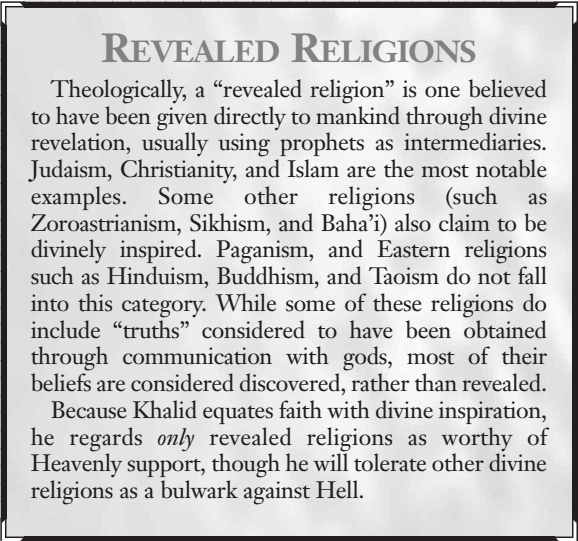
Next time: War and Faith
Faith in God
Original SA post Superiors 3: Faith in GodKhalid is militant and as merciless as he has ever been towards demons and ethereals, but he is this way out of sense of duty to God, not because he feels it is required. Indeed, everything is preordained, so Lucifer cannot win. The entire War is an exercise in futility for Hell, and for the faithful it is a chance to prove their worthiness and for God to show His righteousness, mercy and glory. This can be infuriating for the other Archangels to deal with. While Khalid is a diligent and effective fighter, he acts as if Heaven's strategies are unimportant, and he still doesn't believe he hurt the War by isolating himself from the Host, as God will clearly win with or without his help. If God wills the War be won under Laurence, it will be. If not, it won't. Khalid has no desire to hasten the end times. They will come when God wills and not before. When they do come, though, Khalid and his angels will stand at the fore.
Khalid is a Muslim. He believes that Gabriel gave authentic divine revelation to Muhammad, and he also believes the Quran is the literal word of God. He will not take positions on doctrinal issues, however. He considers his strategies, the needs of justice and does nothing contrary to the Quran. Then he makes his decisions on faith. As a result, he can be shockingly casual towards theological issues that perplex mortals and divide Muslims. Islam is a religion for all, and while Khalid is most comfortable around Arabs, he is neither Sunni, Shia nor any other specific division. He often follows local traditions when among mortals and especially when pretending to be an Arab, but the Quran does not actually prescribe many of the cultural practices associated with Islam, and so Khalid does not feel bound by them. Many of God's instructions, too, such as the ban on shaving, are understood to be rules for mortals. While faith and morality apply equally to all, dietary laws and cultural practices are not binding on angels, though it's good for an angel in corporeal form to follow Muslim practices in order to be an example to others.
Khalid has been an outsider to Heaven for much of the last thousand years. He rarely worked with the other Archangels, focusing on the Muslim world alone, and most of the Host allowed him to take over that responsibility entirely. As he got more and more dogmatic, other angels avoided him more and more. Now, however, he has returned from the brink. He is quiet and humble, less fervent in politics. Laurence has never hated Khalid, though they disagreed on religion. Khalid's feud was one-sided, and his resentment festered for a long time. He used to publically support Laurence but quietly disdain him. Now, however, he is more genuinely cooperative and has even allowed Laurence to ask for help in operations in the Middle East and Southeast Asia. Khalid no longer hates Laurence's Catholicism, though he still believes Islam is the superior faith, and he has accepted Laurence's right to command.
To Khalid, Gabriel holds a status among angels similar to Muhammad among humans. She is God's messenger and was essential to bringing Islam to humanity. She inspires humans in their darkest hour and brings the light of God to the otherwise faithless. Her passion and inspiration were required for both Christianity and Islam to thrive. Khalid, however, has now realized that Gabriel's exile and instability means she's no longer kindling the fire of religious fervor in humanity. He blames much of Islam's stagnation and the corruption and secularization of Christianity on a lack of divine Fire. Khaid does not blame Gabriel for this - he blames Dominic. He'd love to help Gabriel regain her senses and turn once more to religion. He has been quietly talking to Soldekai and asking for help from some angels of Fire. If Gabriel herself no longer supports Islam, some of her angels will, and they're happy to find another Archangel that will support Gabriel in an unqualified way. Khalid, however, does refuse to stop referring to Gabriel as male. He hasn't forbidden his angels to a cknowledge her feminine persona, but he gets colder when they do. Since he doesn't seem to have a problem with other feminine Archangels, some believe he regards Gabriel's female manifestation as part of her madness, while others think he secretly does disdain angels that take on feminine form.
Once, Khalid had only respect for Dominic, until Dominic openly supported Christianity. He believes Laurence's ascension and Gabriel's exile were due to Judgment's manipulations. Dominic, ironically, has come to respect Islam, though Khalid will not trust him until he stops persecuting Gabriel. Khalid believes Judgment is blind and suspects Dominic of faithlessness. For his part, Dominic long saw Khalid as a dangerous near-Outcast, close to heresy. Because he had little leverage, he could only watch and hope to contain the angels of Faith if it got out of control. Now that Khalid has overcome his dissonance and begun to cooperate with the Council, Dominic is cautiously optimistic, but he doesn't plan to stop watching any time soon.
Yves is a mystery to Khalid. He had a hand in promoting all three Abrahamic faiths, and he has a celestial copy of the Quran which he gave to Gabriel. Yves could only have been serving God. But he's done nothing to promote religion ever since. Khalid regards this as a sign that the faithful must succeed or fail on their own. He originally considered Yves to be a perfect example of submission to God and the ideal Muslim, without theology or dogma. Now, though, he suspects Yves may be something greater - perhaps the only being with true free will in the entire Symphony. Khalid keeps his theory and its implications to himself.
Khalid is a militant angel, even now. He does not believe in mercy towards the foe, as they have already chosen not to serve God, and the faithful must be protected from Hell at all costs. He is a brilliant tactician, and now he's ready to work with the others. He doesn't know them very well, and they don't know him. He's polite and hospitable, but he's practically a newcomer, so everyone's a bit wary.
Superior Opinions posted:
Blandine: Without faith, how can there be hope? When he attends to the broader aspects of his Word, he makes my job easier. When he turns narrow-minded and reactionary, he creates more nightmares than dreams.
Messenger of hope and harbinger of prophecy, she safeguards an important realm. If she could be persuaded of the rightness of the True Faith, how effective her angels would be at bringing mankind into submission!
David: A valiant warrior; strong, indomitable, brilliant. He terrifies demons, and he unites people in submission to God. Uriel chose well. I hope he will not retreat into the desert again; we need more like him.
David does not question. He does not doubt. He knows the will of God, and he obeys. His strength is the strength of the Lord. Obey the Lord as David does, and you shall also be strong.
Dominic: Once I thought him incorruptible, but he let himself be swayed by Gabriel's unreliable prophecies, and he almost Fell. I am of course glad to see him back in the Heavenly fold, but he sitll clings to one particular faith, and forces me to worry what will happen if he has to choose between Islam and Heaven. I still have my doubts about him.
If he had faith, judgment would not be difficult. He does not trust anyone, even God, and so he will always be alone, always doubting, always blind to the revelations God has offered him. Domnic does not serve God. How little he thinks of the final judgment awaiting him !
Eli: Khalid...really intense, and he's deep , y'know? I haven't talked to him in a long time, but we used to have the best conversations. I heard he got a little too wrapped up in the whole religion thing, but I'm sure he'll get his head straightened out.
If there is anyone whom I would dare to envy, it is Eli, who has truly touched the face of God. To be so intimately tasked with the job of Creation must be both a joy and a terrible burden.
Gabriel: Faith is the hottest fire of the soul. Some are consumed by it, others are candles, shedding light and passing the flame to others. Khalid burns, so very brightly.
Jibril - God's peace be upon him - is the most holy messenger of God, a prophet to men and angels. I might wish his actions and demeanor be other than what they are, but one who burns with divine inspiration is answerable only to the Answerer.
Janus: After Uriel was recalled, Khalid blew off the status quo, and in the Middle Ages, Islam was the most dynamic movement going. Then they both became entrenched and stagnant. I'm sure glad to see Khalid clear-headed again, and it wouldn't bother me any to see him put a burr under Laurence's saddle.
The Quran says: 'God sends forth the winds which set the clouds in motion. We drive them onto some dead land and give fresh life to the soil after it has died.' Janus personifies the blessings of the Lord, and he brings renewal. But sometimes he acts on his own initiative, forgetting he is but an instrument of God. And his Servitors seem much-influenced by Western pop-culture and over-full of pride.
Jean: Khalid personifies a field where I have no influence and little understanding. I'm not saying faith is unimportant, but I deal with tangible realities and potentialities. As an anachronism, he was an embarrassment, frankly. If he keeps his priorities straight, his perspective is important in the Seraphim Council.
The Quran says: 'It is He who makes the lightning flash upon you, inspiring you with fear and hope.' This is Jean's role. Like Janus, he is a prtmal tool for bestowing God's blessings, or executing His wrath. Jean's work is praiseworthy, but sometimes he should "look outside the box." Scientism is a hair's breadth from secularism.
Jordi: Animals don't need faith. Only humans need to be given a set of beliefs for them to act properly. Khalid does a necessary job, I suppose.
Animals are also part of God's creation, and the Quran enjoins us to treat them as such. Jordi has been given an important task, but he and his servants are not part of my work.
Laurence: We are brothers in arms. We share a common bond, despite differences in strategy, and even religion. Khalid served Purity, like me, and he will not Fall.
One could not ask for a more virtuous leader, and Laurence is a fine commander. I know God has done and will do what is right. I regret my folly in doubting Him, and Laurence.
Marc: There are a lot of good ideas in the Quran, and for a while, the Muslims had the most advanced social and economic infrastructure in the world. But I don't think much of that can be credited to Khalid. By the same token, I don't think he can be blamed for the fact that the Muslim world has become a backwater. Now that he's no longer ranting and railing against the West, perhaps he will help me connect the Middle East to the rest of the world, and that will increase prosperity for everyone.
He seems very much the face of Western materialism, yet I know his Word goes deeper than that. I am sure Heaven can do better than capitalism. We should talk, and see if there can be common ground between the industrialized West and Islamic socialist culture.
Michael: Khalid's tale is a cautionary one. Religion is a good thing, but it's not the only thing, or the most important thing. Now that he's begun to realize that, I'd like to see all his Servitors who are so good at putting the fear of God into people applying more of their zeal against demons.
Most honored of God's angels, Michael (God's peace be upon him) stands above us all as a symbol of God's majesty. He is above reproach, he smites the evildores, and the unbeleivers will cry out 'God, spare us! Mika'il, spare us!' on Judgment Day.
Novalis: Islam was supposed to be the religion of peace, but I was never comfortable with a Servitor of Uriel championing it. Khalid has a lot of blood on his hands, and much to atone for. Still, love brought him back to Heaven, so I will welcome him as my brother.
Do not mistake softness for weakness. I do not agree with Novalis' views, but she has such faith as puts her fellow Archangels to shame. Since I cannot sway her, I accept her as she is and hope we do not interfere with one another.
Yves: Khalid has stared into the abyss, and come back a better person. He's a walking parable, and one I hope won't soon be forgotten.
Some mysteries, God does not choose to reveal to us. I respect Yves, but I cannot understand him, so I do not try. It is enough to know that he has the Book.
Andrealphus: Oh yes , all that passion , that burning desire , bottled up inside an Elohite, begging for release, just waiting to explode. He was so close to becoming a Habbalite, he just needed that little something extra to push him over the edge...I could do it. I know I could. Religiosity is just subordinated lust.
The Quran says: 'Do not come near zina ,' which is sexual impropriety. Sex is not forbidden; indeed, God has commanded that men not deny themselves lawful pleasures. But you have only to look at the West to see how insidious and destructive are the ways of Lust.
Asmodeus: Islamic jurisprudence has always been one of my favorite fields. Khalid deludes himself that he can separate faith from dogma. People choose what to believe in, and they make rules to help them believe, and then faith becomes just another game.
Lucifer's most faithless servant. Small wonder his methods and Dominic's are so alike.
Baal: Khalid would make a formidable foe, but fortunately he's been all but neutralized by his Word. He is an entertaining foil for Laurence, and could be a strategic asset if properly handled.
In the early days, Baal was my primary adversary, as I worked to abolish the cults he founded. Though his worshippers are gone, the serpent is as deadly as ever.
Beleth: Faith in the unprovable leads to fear of the unseen. And what Khalid fears most is losing his faith. His Word is his weakness.
Oh Beleth, poor wretched creature and least of Lucifer's minions! Your lack of faith makes you an empty shell, your fears are phantoms to test mankind. Don't you realize that you are but an instrument of the Lord, regardless of whom you proclaim to serve?
Belial: He used to be all that and a truck bomb...now he's just a raghead preacher. But he's got a lot of followers who still want to set the world on fire, even if he doesn't anymore.
Belial also had worshippers across the Holy Land, but I saw them all put to the sword. Would that I could do the same to him, for his evil works cause untold suffering to Gabriel (peace be upon him).
Haagenti: Faith? Can you taste it? Touch it? Smell it? Eat it? Then what good is it?
Pathetic creature. Only one of the dregs of Hell who has never even seen Heaven could be content with such a debased Word on which to build a Principality.
Kobal: Faith is a con, and Khalid is a huckster. Why is it every time Heaven teaches humanity another "correct" path to salvation, Archangels start feuding, crusading, and going nuts? Good thing for God that humans can't see how clueless His divine servants are. Hey, stop me if you've heard this one: A wop, a kike, and a camel jockey go to Hell...
The Quran says: 'The evil-doers mock the faithful and wink at one another as they pass by them.' So has it always been, but God makes men laugh and weep, not any angel or demon. Kobal's evil is petty and preordained.
Kronos: Heaven would like to believe that Khalid has escaped his fate. I wonder if Khalid has as much faith?
Kronos leads men to despair, but he deludes himself that he is responsible for consigning them to Hell. God already knows who will be saved and who will not. Kronos is nothing.
Lilith: He says he won't deal with me, but I've seen what he needs. I think if the stakes were high enough - if he thought his precious religion to be really on the brink - he'd deal with the Devil himself. Hell, he's already dealt with Malphas . Now Khalid is oh so sorry and no doubt convinced he'd never do it again. Oh yes, he will.
Freedom - the very fact that it is a diabolical Word should tell you its true nature. How bitterly Lilith seeks to enslave others, pretending that she is free. From the moment God created her, Lilith has been His creature, as we all are.
Malphas: Of all the Archangels, Khalid is probably my favorite. Rarely does an angel do so much to spread my Word. Faith is a weakness I've exploited time and again, and I adore religion.
God rebukes those who split their religion into sects, for factions indeed weaken all faiths. But true Islam is only submission to God. Those who submit to God are Muslims. If they have truly submitted, Malphas has no power to mislead them.
Nybbas: Khalid says Islam is the religion of peace. I say Islam is the religion of bloodthirsty, medieval towel-heads. A picture of a smoking Marine barracks is worth a thousand words from the Quran. Religion is a product, and I'm the one who packages it.
There is hardly an image broadcast anywhere in the West that doesn't have Nybbas' stamp upon it. Is cable TV and satellite news worth letting the Media define society's values?
Saminga: Faith is an empty hope, compared to the certainty of Death. I'd consider all beliefs useless, except that people are so willing to kill over them.
This grotesque monster rules soulless husks; does he really think that makes him powerful? When Judgment Day comes, he will cry at the abject poverty of his domain.
Valefor: Stealing faith is a trick that requires a little more work than your typical smash-and-grab, but it's more satisfying to take something that can rarely be rpelaced. Oh, and if you want to twist the knife in one of Khalid's angels, tell 'em I think Palestine belongs to Israel.
The Quran says that anyone who steals will bring with him that which he has stolen on the Day of Resurrection, and all will be returned to those who were robbed. Thus, Valefor acquires nothing; he merely adds to the burden he shall bear on that Day.
Vapula: I wouldn't give that bloody ignorant fanatic the time of day. He pretends to serve God while trying to keep mankind in the Dark Ages.
Godless technology is not progress, it is a diabolical tool. Placing your faith in new devices is what Vapula counts on. I am not against science, but which is better: to serve God without science, or to serve science without God?
Soldiers of God: The Quran says that those who die in the cause of God will be rewarded by Him in the hereafter. Those who serve God need fear nothing. Treat them as equals; nay, more than equals. Remember that God commanded us to prostrate ourselves before Adam. I will not abide a faithful human being treated as a servant.
Soldiers of Hell: The Quran says: "Those who barter away their faith for unbelief will in no way harm God. A woeful punishment awaits them." We need not concern ourselves with the Hellsworn, except when they oppose us. Their fate is already sealed.
Pagans: Pagans are no better than unbelievers. They know not that God is supreme, and some of them have worshipped Demon Princes as gods. Treat them as Hellsworn.
Sorcerers: God has forbidden the practice of sorcery, including fortune-telling and astrology. Those who sell their souls for knowledge will not profit thereby. They too are lost.
Saints: These most blessed of souls have received the reward God promised. Some continue to help the faithful. I command my Servitors to aid God's Saints whenever possible, and remember that they are higher than we.
Ethereals: To call them "pagan gods" is blasphemous; God is God, there is no other god. They are soulless spirits with the power to tempt and mislead men, but on Judgment Day, they will cease to exist. In the meantime, suffer them not.
Khalid believes humans are superior to angels. Angels are more virtuous, wiser and mightier, but humans were made in God's image. They have a special quality of faith, a stronger faith than any angel can ever have, for they do not hear the Symphony and have no proof of God, as angels do. Human faith makes Tethers and sustains Words. As far as Khalid is concerned, angels exist to serve humans. God has appointed a Day of Resurrection on which all believers will be sabed and angels are to work with that day in sight. Khalid promotes religion more vigorously than he fights in the War, and some Archangels would say he puts his Word above the interests of Heaven, but Khalid believes he is putting emphasis on what God has said is most important. Celestials can't really affect the War's outcome, but they can sanctify God's name by exalted humanity and caring for the faithful.
In any variation, Khalid is always a deeply religious Muslim who si open and passionate about his beliefs. This can cause friction between his Word and Choir nature. He can be biased as long as he sincerely believes he's following the most divine course, but when he lacks faith in that, he enters a vicious cycle of dissonance. In the official canon, Khalid was once a fanatical fundamentalist and is now becoming more moderate, but there's other takes. The Peaceful Khalid seems the best option - it acknowledges that a devout Muslim doesn't have to be a harsh zealot, and is meant to portray both Khalid and Islam more sympathetically. Literally there in the text. Khalid might perhaps have had a change of heart in Muhammad's peaceful messages, becoming a Muslim for the potential to bring peace and justice to the world. He disdained Laurence more for Laurence's militant nature. A more peaceful Khalid is like to be more like a Sufi mystic than a Shiite fundamentalist, and would be more allied to Novalis than David or Michael. He would no longer have the Wrath of God or Jihad attunements, or any Rites involving killing people.
Khalid as the Guardian of All Faiths is not a Muslim extemist, seeing Islam as only one of many worthy religions. He might still be a violent fanatic that encourages reactionary fundamentalism in all faiths rather than allow demons in, or he might seek to bring all faiths together in a single divine religion. Any Islam-specific Rites or attunements would now apply to any religion. Khalid as the Jihadi is a villain or deeply unsympathetic Archangel. The Final Trumpet never happened, Khalid remains a fanatic and his original Rites and attunements still apply. Perhaps he isn't quite so unbalanced, but he is still a militant and intolerant Muslim. If he isn't dissonant and heading for a Fall, he'd probably do better as a Malakite. The most extreme variation is the Fallen Khalid, the Demon Prince of Fanaticism, described in The Final Trumpet.
Khalid's Cathedral is a grand mosque in the Eternal City, just opposite the Halls of Worship and out of sight of the Church of the Sword. IT is a larger and more perfect version of the Masjid in Mecca that holds the Kaaba. Like the Masjid, Khalid's Mosque has an immense courtyard at the center. Muslim Saints and other holy men gather there and in its garden. Great scholars like Abu Hamid al-Ghazali or Jalad al-Dun Rumi can be found there conversing with other religions leaders and Saints like the Sufi Abd al-Qadir al-Jilani. The Hearts of the angels of Gaith are stored in recesses along the perimeter. Angels are rarely found here, as most angels of Faith stayo n Earth and few other angels are Muslims. Not all the blessed or angels in the Mosque are Muslims, of course, and all are welcome, but non-Muslims tend to prefer the subjectivity of the Halls of Worship. Impossibly tall minarets rise from the Mosque, and angels of Faith lead calls to prayer five times daily. All Muslim souls in Heaven, wherever they are, can hear these calls and take part in the salat. While the Eternal City is considered analogous to Jerusalem, blessed Muslims traditionally regard Khalid's Cathedral as corresponding to the Kaaba and face it when praying.
Khalid built his Mosque shortly after becoming an Archangel, but he never lived there. In fact, he's rarely visited it at all, particularly once he began to become dissonant. Since mending his soul, he has returned several times to appreciate the loyal angels that still had faith in him there and to encourage other angels and blessed souls to visit. He spendsm ost of his time on Earth still, so those hoping for an audience are best off looking there.
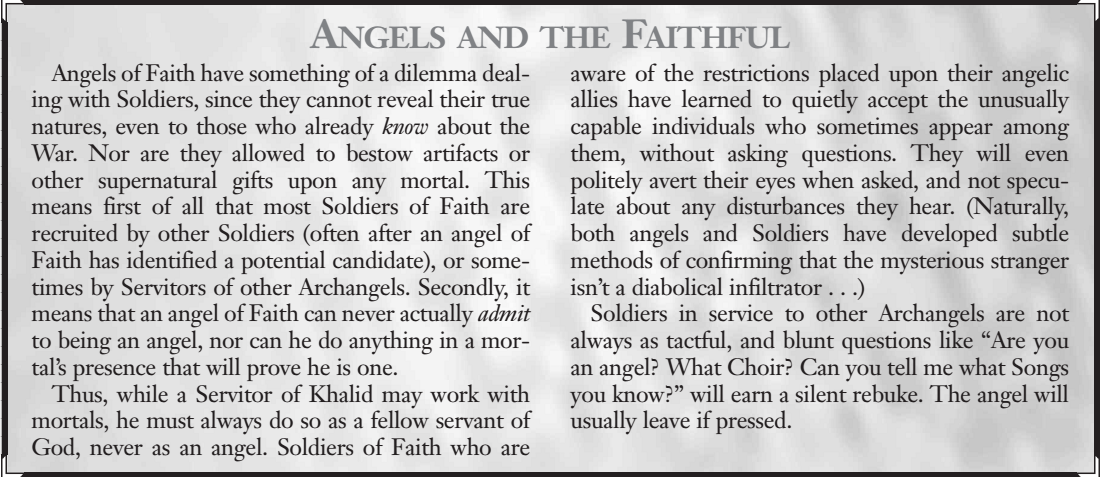
Next time: Houses of the Holy
I have Faith
Original SA post Superiors 3: I have Faith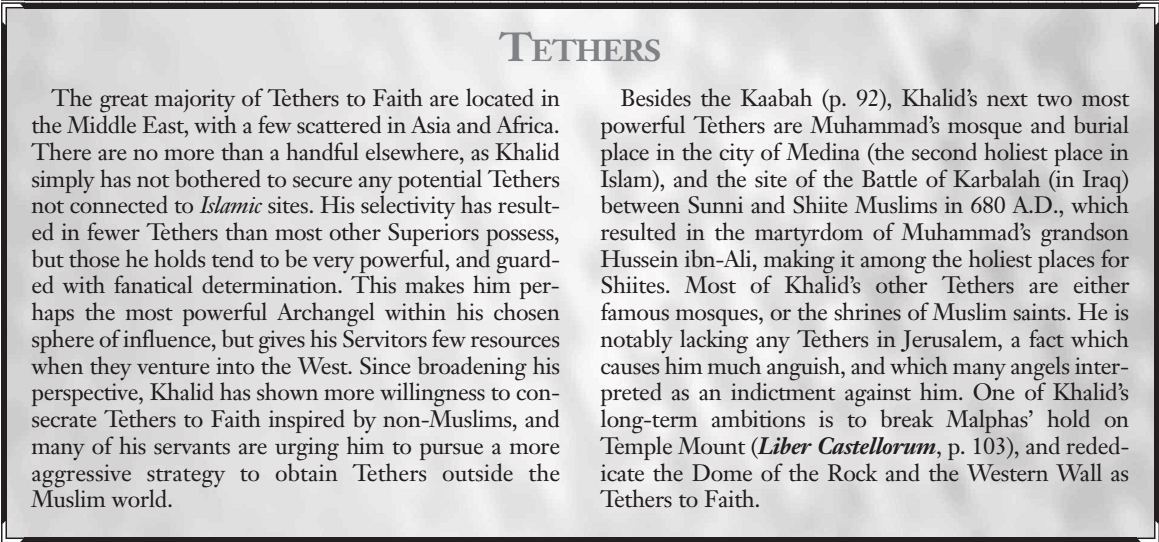
Angels of Faith have a reputation for being fanatically devoted to Khalid. His degeneration led some to lose faith in him, causing many Outcasts and a few Fallen, those who did not have been rewarded for it. Khalid has fewer servitors than the other Archangels, but they are on average older and more powerful. Khalid has made very few new angels over the years. Thus, a high proprotion have Distinctions, extra Rites or extra attunements. In Heaven, they have a reputation for age, wisdom and power. His younger angels try to live up to it, tending towards being very serious and very militant. Most of them work in the Muslim world (that is the Middle East, North Africa, Pakistan, Indonesia, Malaysia and parts of India and Southeast Asia). Most use male vessels and all have either male or gender-neutral celestial names. The Quran forbids female names for angels, in an effort to prevent the preservation of pagan goddesses as angels. This means that Khalid's organization tends to come off as rather patiarchal. However, they do use female vessels and Roles as needed, though they will of course never present htemselves to Muslims as angels in this form. Almost all of Khalid's angels speak fluent Arabic, as Arabic is the language of the Quran. All are well-versed in Islam and often other religions as well, regardless of their personal opinions, and they are less likely to use Songs than most angels, as Khalid prefers subtle miracles.
In Islam, all are equal before God. Khalid accepts Archangel as a title, but dislikes the word Superior. He commands his angels in God's name, and when they serve him, they do so in recognition of his service to God and the fact that God has seen fit to elevate him. He is not better, only mightier and possibly wiser. By the same token, Khalid does not use ranks. He grants Distinctions for good service, and angels who have them are to be respected, but Khalid puts whatever angel he feels most suitable in charge of operaitons at any given time. It's even possible for an angel to be giving instructions to an angel with a higher Distinction.
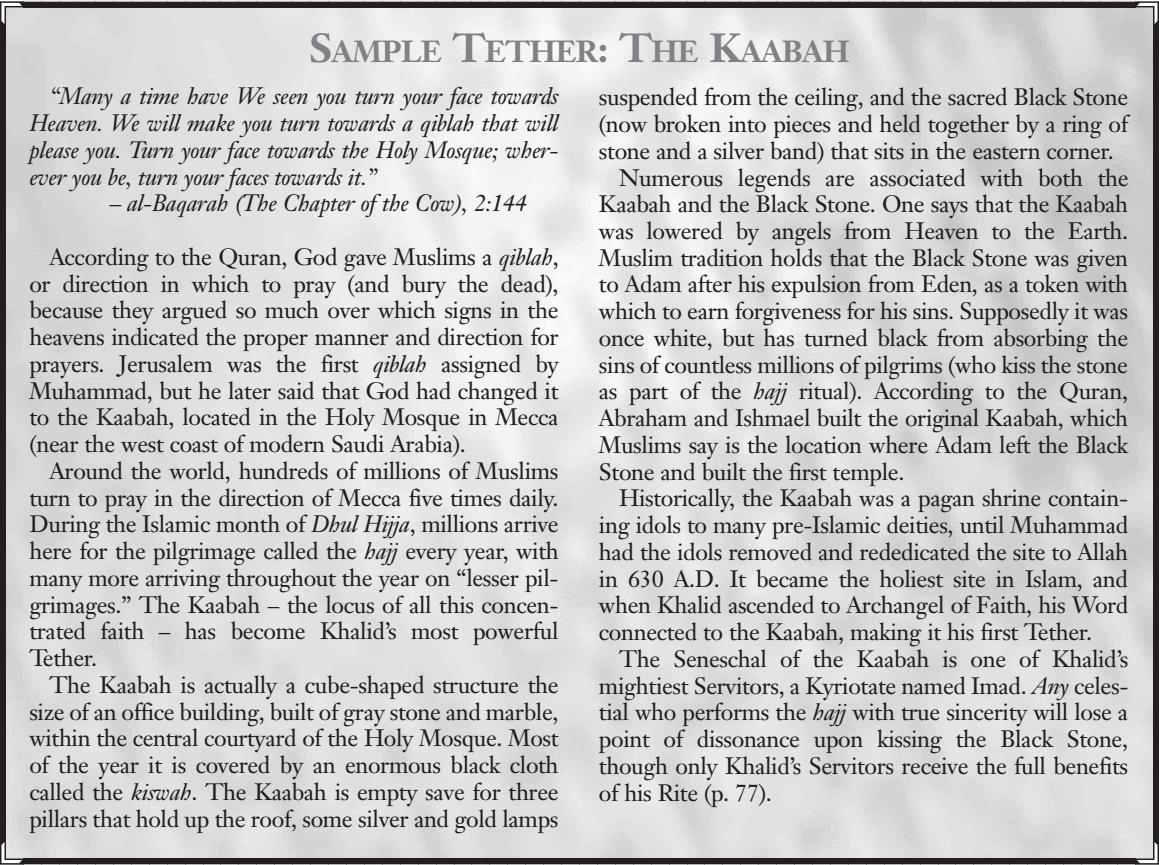
Khalid frowns on his angels subdividing themselves. Sectarianism is condemned in the Quran, and while that hasn't stopped Islamic sects from appearing, Khalid will not allow it in his angels. There are no permanent or organized divisions of the Faithful. Some work together for long periods due to overlapping interests or territories, and certainly there are circles of friends, but if a group seems to be forming around an ideology, Khalid reprimands them. He will not endorse any one Islamic sect, though he will permit his angels to follow the practices of whichever suits them best. He is, however, very watchful for sectarian differences causing problems among his angels. They are expected to work together regardless - a Shiite Malakite, Sunni Seraph and Sufi Mercurian may have theological disagreements, but they can't let them get in the way of their duties. Similarly, they may not form associations based on shared doctrines - Khalid will step in to break up these cliques.
Despite the lack of hierarchy, the Faithful are disciplined. If Khalid puts one of them in charge of another, the subordinates are to obey without question. While Distinctions do not carry rank, they do bestow respect as signs of Khalid's trust, and respect is deeply important to the Faithful. Angels of Faith that respect someone will follow them to Hell and back. They see the segmentation of the Sword's angels as impersonal and uninspiring arrangements. They may obey others, but will not automatically show respect to outsiders until it is earned.
Khalid is both very harsh and very generous. He shows favoritism among his angels, and favored servants will get more allowances made and more generous rewards. To earn and keep his faith, though, they must serve well. They must uphold the ideals of Islam, even if they aren't vocal Muslims (which does help) and they must do good works for faithful humans. Angels that lack faith, zeal and initiative will not be favored. Khalid is exceptionally generous with his favored, ignoring minor transgressions or just scolding them briefly. He especially loves when his angels further the cause of Islam or protect Muslims, when they make a positive image for a religion or discredit secularism or anti-religious movements, or, before his return to Heaven, if they were to embarrass angels of the Sword, though he never explicitly encouraged it. Now, this is likely no longer true, though he still won't get upset over it. Khalid is especially generous with handing out Rites, and is fairly tolerant about losing vessels, as long as they were lost in good faith. Sacrificing your vessel to kill demons or Hellsworn is not only allowed but encouraged. In the past, Khalid only gave Distinctions and Words to Muslim angels, and while he's not quite so prejudiced any more, his ranking angels tend to be. Being a devout Muslim definitely makes life easier among hte Faihtful, and non-Muslims will need to work extra hard to prove themselves.
For as generous as he is to those he favors, Khalid is equally harsh to those who displease him. He is free with dissonance as a punishment, far too much for Dominic's tastes. He'll inflict it at the slightest hint of doubt or disobedience. However, he is just as quick to remove it from an angel that is humble and repentant. More disturbing to Dominic is Khalid's habit of Outcasting those that disappoint him. Most Archangels only Outcast their servants when greatly angered or as a last resort. Dominic doesn't like making Outcasts, as they are closer to falling and hard for him to track. Khalid, however, will cast out anyone that openly defies him, seriously damages Islam or who earns dissonance and fails to try to mend their ways. He will take back repentant Outcasts, but regaining his trust is a long, strenuous process of absolute obedience. As a lesser punishment, Khalid is quiock to take artifacts, or even servants and Roles. Gross stupidity or poor judgment that doesn't come with immorality may instead see stripped attunements. Khalid will only kill angels who are openly rebellious and who seem to be inevitably moving towards the Fall, however.
Khalid isn't the easiest Archangel to work for. Most of his angels are deeply loyal, but some do lose faith, particularly those that aren't as fervently Muslim. Some are found not good enough even if they are and are cast aside. Other Archangels, even Dominic, tend to be sympathetic to Outcasts of Faith and will often take them back to Heaven if they had minor transgressions only and are sincere in their desire to return to the Host. Many are only satisfied if Khalid will take them back, however, and are treated as any Outcast would be. Other than becoming Outcast and seeking refuge elsewhere, angels of Faith tend to find it easiest to talk to another Archangel about transfer before going to Khalid. Most are sympathetic, and if they ask Khalid for the angel's Heart, Khalid will hand it over easily - he doesn't want faithless servants - but the angel will never again be welcome among his Faithful or in his presence, and all attunements and Rites will be stripped. More rarely, an angel will truly believe they are called to another Word. If they approach Khalid and confess this, he may be angry, disappointed or accepting. Sometimes, he believes, God does in fact direct angels to new purposes, and if he believes this is so, he will transfer the angel without any hard feelings, and even allow them to keep non-Distinction attunements and Rites. Khalid is most likely to react this way to transfers to Fire, and also to angels who remain devoutly Muslim.
Khalid is one of the scariest Archangels to go to for Redemption. It'd be suicidal for any demon who lacked unshakeable faith in God, and even then, the old Khalid wouldn't hear them out unless they were willing to become Muslims. Even now, Khalid will react more positively to that. A very, very small amount of demons have been redeemed by Khalid, however, and the survivors are said to have never Fallen back to Hell. It's also said, of course, that no non-Muslim demon has ever survived his redemptions. Khalid is rare - he treats the Redeemed as newborn angels, with no bias. The act of surviving Redemption is proof of their sincerity - to make them prove themselves again would be a lack of faith. Not all of his angels share this view, but they will not openly discriminate against the former Fallen anywhere he might notice.
Khalid has many Soldiers, and many more mundane humans that serve him, knowingly or unknowingly. Almost all of them are Muslims. Historically, he has recruited heavily from militant Muslim groups, and he keeps an eye on all Muslim Soldiers, even those serving other Archangels. He has counted terrorists as followers, and now struggles over whether he can still use them to legitimate ends, change their focus without making them feel betrayed or if he must entirely dissociate from them. He has told his angels to increase their recruitment efforts, particularly outside the Middle East and among other religions. Khalid considers humans the most important part of the War and superior to angels, so he will rarely bind them to service to an angel and will expect angels not to impose their will on their servants unless truly required. Likewise, Khalid believes that all are equal before God and does not allow his angels to segregate by Choir. He views inter-Choir rivalries as similar to racial disharmony and does not tolerate it in his presence.
Seraphim of Faith are masters of the understated truth. They can't lie, but can wilfully omit or imply things, and they tend to be better at it than other Seraphim. They have a reputation for wisdom and being enigmatic, diverting mortals with crypticness and riddles. Many adopt Sufi Roles, as Sufi sects tend to be more flexible theologically, allowing them to speak Truthfully about their thoughts on religion. They also like Sunni Islam, due to its rule by community consensus guided by the sunnah, which they see as a reflection of the Seraphim Council. They test the faithful for sincerity, and those that lack faith will not pass their tests. Nothing outrages them more than those who use religion to deceive or those who pretend to belief.
Cherubim of Faith guard individuals chosen by Khalid, including any important Muslim holy men and especially Muslim prophets. They also guard important mosques and holy sites. Besides physical protection, they are also often sent to bolster those with wavering faith. They will know if their attuned is losing faith and will try to prevent it. They work to ensure that mothers, teachers, clergy and others whose faith can influence many never lose sight of God's blessings. Most are Sunni Muslims, it being the religion of the majority, which they find reassuring.
Ofanim of Faith look for couples who have met and fallen in love already, then work to bring them together. They do not bring strangers together - Khalid doesn't approve of abrogating God's will that way. Because love respects no social or religious boundary, these Ofanim sometiems conflict with Islamic law. The Quran says that romantic desire outside of marriage is sinful and that Muslim women cannot marry non-Muslims. (Muslim men can but are discouraged from marrying Jews or Christians.) Homosexuality is also prohibited. The Ofanim of Faith don't care - they encourage any true and faithful love. They tend to be the least devout Muslims of Faith, and in fact the majority of non-Muslims serving Khalid are Ofanim. They have a poor reputation with his other angels as a result, but they also have less trouble dealing with non-Muslims. Ofanim who are Muslims tend to be Shiite, as it is dynamic and passionate in worship.
Elohim of Faith are relatively rare, thanks to the tightrope they have to walk between faith in the unprovable, adherence to the Quran and objectivity. Most resolve it by blindly obeying Khalid, which makes subjectivity moot. These Elohim tend to be strict Sunnis, favoring Wahhabism (the Saudi fundamentalist brand of Sunni Islam). They serve as Khalid's judges and enforcers of orthodoxy. A smaller group, however, are more philosophical. Most are still Muslims, but tend to be less literal in their reading of the Quran and more tolerant and encouraging of other faiths. They might be Isma'ili or even members of heterodox Muslim faiths like the Ahmadiya or Sikhs. (Are the Sikhs even technically Muslims? I don't think they'd describe themselves that way.) They tend to be viewed with suspicion by their more conservative peers, but are good at working with non-Muslims. They also make excellent proselytizers, thanks to their rational approach to faith, and tend to be better at converting people to Islam than their more fundamentalist brethren.
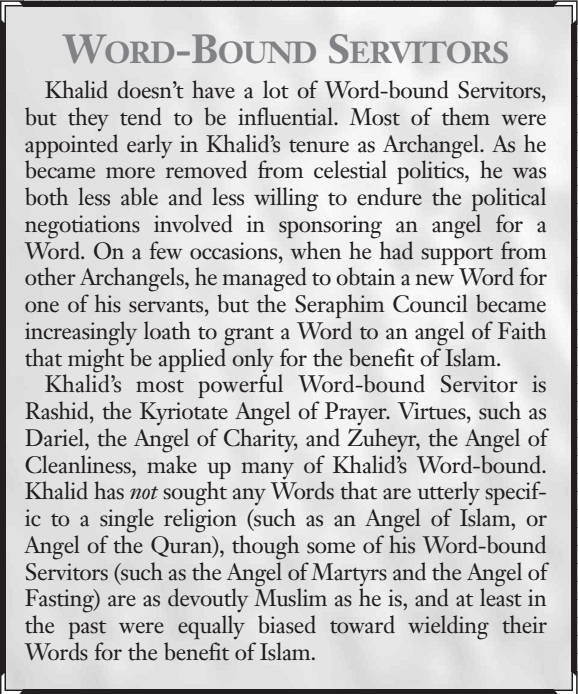
Malakim of Faith are fervent and uncompromising. Most are fanatical Muslims, though they don't tend to any one sect. Some are Sunni, some Shia, and they've also historically supported the Khawarij, Qarmatians, Isma'ilis, Mutazilites and every other militant splinter group. Khalid's Malakim are his mujaahidun, his holy warriors, eager to wage jihad against unbeleivers, demons and even heretic angels. If a Malakite converts to a specific religion, they take their faith as seriously as any vow, even if they aren't technically oathbound. Malakim of Faith do not need to be intolerant fanatics, but many are allied with terrorist groups. Khalid used to encourage it, and now he's having trouble bringing the more ardent Malakim back into line.
Next time: It just keeps fuckin' going
Faith Is A Pornstar Name, Isn't It
Original SA post Superiors 3: Faith Is A Pornstar Name, Isn't ItKyriotates of Fire inspire faith, but the temporary faith they cause must be nurtured. Otherwise, it lasts only a few minutes. They don't just cause it at random, preferring to work longterm with a single group or person. They usually choose those that need faith, then work hard to set things up to help them gain it for real. Their attunement is just lighting a match - they need to prepare fuel to make it last, and protect the flame of faith. They arrange good luck and subtle blessings, possess friend and family, and ruthlessly manipulate people to benefit those they choose to give faith to. They rarely possess the actual subject, because it's hard to instill faith when your target's mind is in the Marches, and also it risks exposing their presence. While most are good and faithful Muslims, they tend not to care too much about doctrine, and most are moderate Sunnis. They actually tend to work quite well with Cherubim of Faith.
Mercurians of Faith are peacemakers, working to iron out disputes in the Muslim community, keep families together and identify bad influences. They have trouble becoming fanatically orthodox, but are often very knowledgeable on theology, to help find a happy medium between viewpoints. Many are Sufi, the more humanistic face of Islam, and act as Khalid's ambassadors. They gain Essence by causing 'miracles,' but these miracles must inspire faith in God, not the angel. It'd be easy to use their powers to do parlor tricks, but Khalid punishes that very harshly. Everything should be credited to God.
Only a few angels of Faith are long in Heaven, and most of them work in the Mosque. They tend to be Cherubim doing maintenance or watching over those in Trauma. A few also serve as muezzins calling to prayer. They do little else. Recently, though, Khalid has sent a few angels to memorize the copies of the Quran, Bible and other scriptures in Yves' Library, to research the history of religion and Heaven. He has not said what he's looking for or why, and it's rumored that he's also been sending more angels to visit Gabriel's Volcano.
Khalid remains intolerant of ethereals, but he doesn't dedicate much time to hunting them. Most paganism has already been purged from Muslim lands, so it's hard for ethereals to attract his attention. Other than hunting these rare intruders, angels of Faith have no real reason to visit the Marches. A few Cherubim and Kyriotates monitor dreams as part of their work, though.
90% of Khalid's angels are on Earth in the Middle East or other Muslim areas. They try to keep Western materialism out, sometimes violently, even if it means keeping these nations undeveloped. Others are more progressive, wanting to modernize but not Westernize. All of them help others and promote selflessness while opposing selfish values and demons. They are unique in being so concentrated in one area and on one religion. Most are teachers, defenders or warriors. The teachers, or ussatithun, are to lead by word and deed, demonstrating the ideals of Islam as a model to humans. They must be doctrinally correct and pure, and may serve as actual teachers, or sometimes mullahs, judges, cops, writers or even housewives. Seraphim and Elohim are often doing this job, as are Kyriotates and Mercurians.
Defenders, or Mudaafi'un, are more aggressive in defending Khalid's interests. They are sent where Islam or Faith are threatneed, sometimes physically, as Cherubim to guard holy men or mosques, or to defend the Islamic way of life and screen out corruption and secular influence. They often view themselves as defending Islam from Westernism, atheism and/or secular humanism, but some also specifically hunt out demonic influence, as demons are quite active in the Middle East. (Some are so overzealous that they've been known to treat other angels as threats.) Cherubim are most common, but Seraphim and Elohim also work as social guardians, as do Kyriotates and Mercurians. Malakim are only sent in when their violence won't cause problems.
Warriors, or Mujaahidun, go beyond defense. They fight a jihad against the enemies of Faith, and often the enemies of Islam. Some stand ready to respond to calls for help from the defenders, while others go look for trouble. Some teach humans to fight evil and recruit Soldiers, others fight demons and infidels. Angels of Faith fought with the Afghanis against the Soviets and the Palestinians against Israel. Most of them are Malakim and Cherubim, but Ofanim are not uncommon, either.
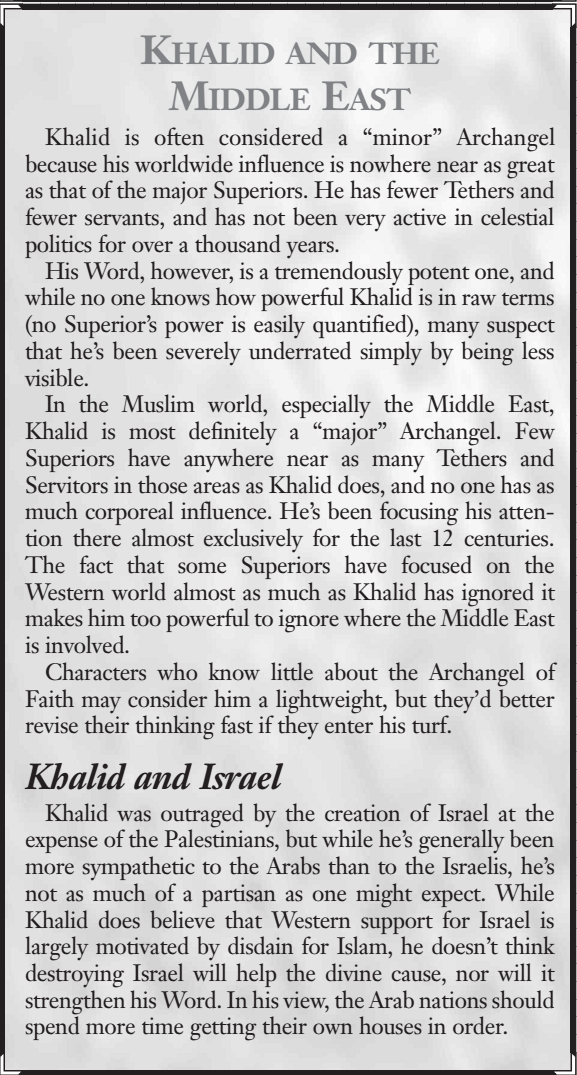
About 10 percent of Khalid's angels work in the West. Most work with Muslim communities there, but also work as missionaries to convert others. They tend to be the more tolerant of his angels. Others, a smaller amount, work directly with non-Muslims. Some support other religions directly, some are missionaries, and some spread faith of any kind they can. These angels include messengers and ambassadors, often Ofanim and Mercurians, as well as those rare angels temporarily serving another Archangel, most often Michael or David but occasionally Gabriel, Yves or even Laurence.
Khalid's angels fight against atheism, commercialism, materialism, humanism and many other common Western values. Not all are fervent Muslims, but all agree that humans need faith in God and that these secular values erode that faith. Most still seep rogress as necessary, though, realizing that blind faith will ultimately weaken the faithful and that Islam must coexist. What makes their job harder, though, is that Khalid more than any other Archangel has adopted one religion as his party line. Even Laurence, who supports Christianity in general and Catholicism in particular, does not confine himself solely to Christian interests. Khalid, though, has historically ignored anything that didn't touch Muslims. It's been hard, for those Faithful that saw merit in other religions, and harder for those who realized how close Khalid came to a Fall. Most passed these trials with their faith in Khalid and now feel vindicated, but some became demoralized Outcasts, Some even Fell, and now work with Muslims for Hell. What has kept the others going is not just loyalty, but faith in God. They know God is watching them, helping htem when needed, and that He is in control. Their destinies lie in His hands. Angels of Faith usually come off as holy and exceptionally devout, even if they aren't Muslims. The cynical and doubting do not last long in Khalid's service. They may be dogmatic, fanatical, intolerant or violent, but all feel fulfilled by their fervor. Even Judges can be unsettled by the genuine feeling that the angels of Faith have for what most angels simple believe.
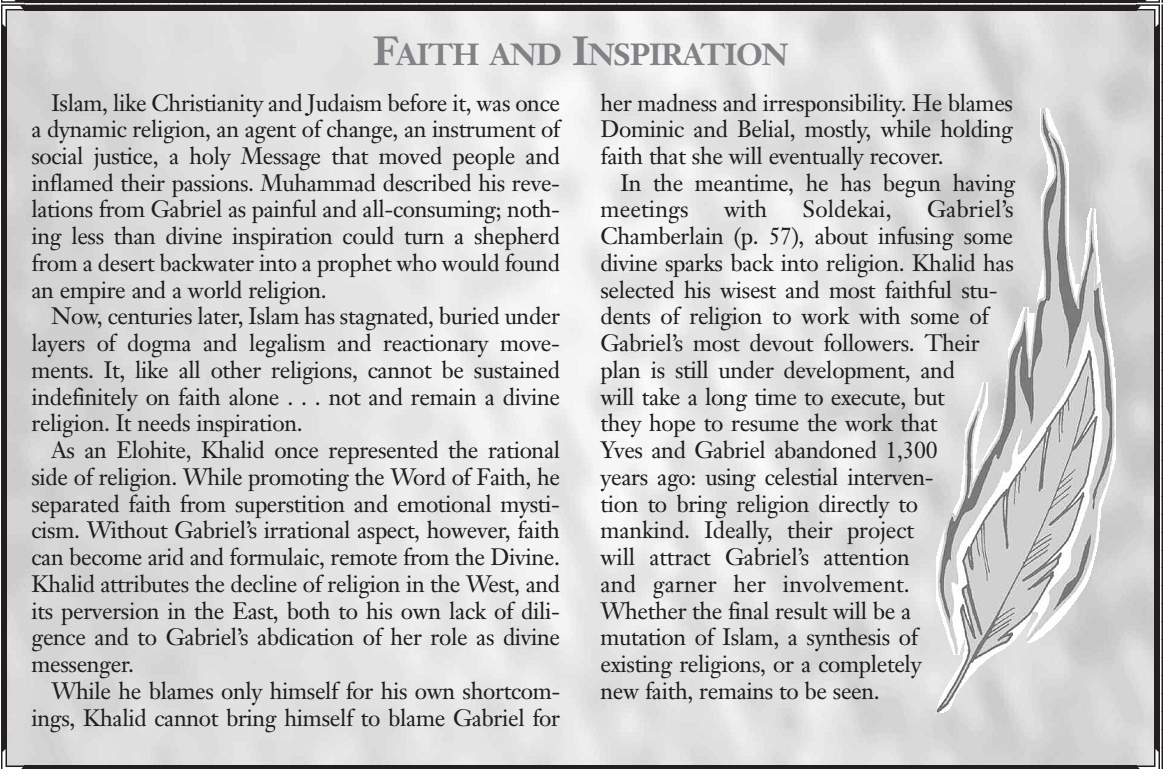
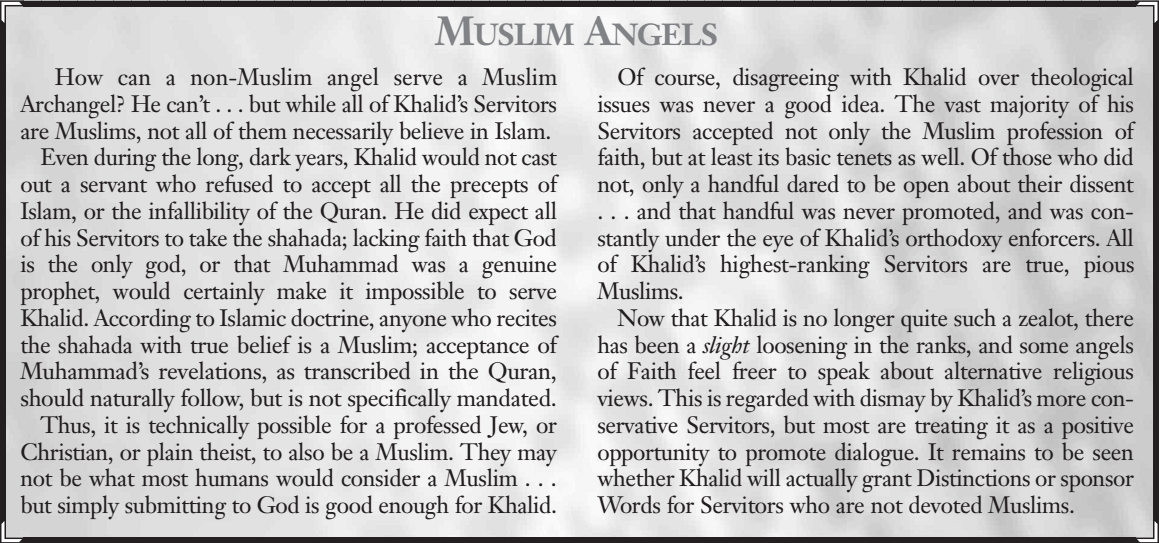
The angels of Khalid tend to see those not among their ranks as 'infidels.' During Khalid's self-imposed exile, his angels became very insular and somewhat defensive, earning a poor reputaiton with the Host. Most were not so fanatical as Khalid, but still fanatics by Heaven's standards. Their acceptance of Islam as Truth and their hostility to the things other Archangels promoted can make them hard to deal with. Khalid's attitude has tended to view other angels as People of the Book - misguided and wrong, but servants of God that can be virtuous. Now, he is encouraging his angels to be more cooperative, but there's still a culture clash. Angels of Fire tend to be most respected, due to serving God's Divine Prophet. Angels of David, Michael and Yves are shown respect and can even be friendly, though most Faithful are more suspicious of Yves than Khalid is, given his lack of vocal support for Gabriel and Islam, at least to their liking. Angels of the Sword used to be rivals, particularly in the Crusades, and while hostilities were always forbidden and they'd team up against outside threats, there was no real love there. Now, Khalid requires full and wholehearted cooperation with the Sword, and many angels are having trouble with the transition, while many Sword angels are wary.
Khalid is particularly hostile to Dominic, as are his angels. The Judges in the Middle East often feel beset by fanatics, and they are much less intimidating to angels who surround and outnumber them massively and have an Archangel that ignores their desires. Khalid has instructed his angels to nominally acknowledge Judgment's authority, but they very clearly don't respect the Inquisition and see Khalid as a higher authority. Some even bait the Judges, especially Christian Judges. At times, Dominic has had to intervene personally, which does not endear the Faithful to him. Dominic and his angels see Khalid as obnoxious and troublesome, though less so now that Khalid has returned. Still, they tend to prepare for the worst, and the more vindictive Judges like to turn the tables on those Faithful that leave Khalid's turf, showing them what it feels like to be surrounded by unfriendly and uncooperative angels.
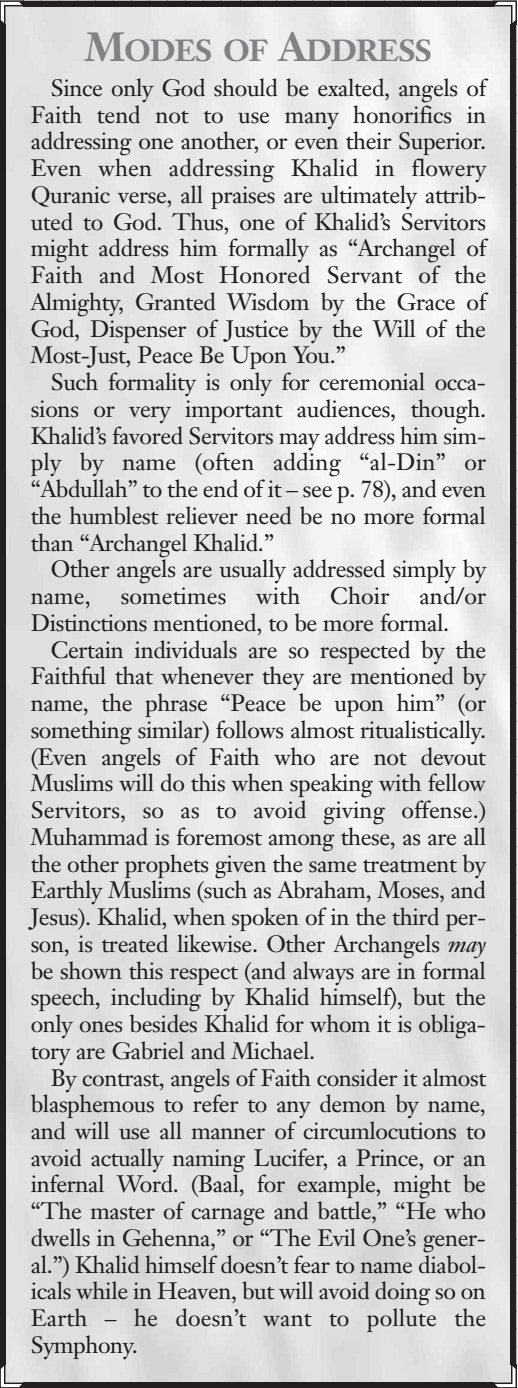
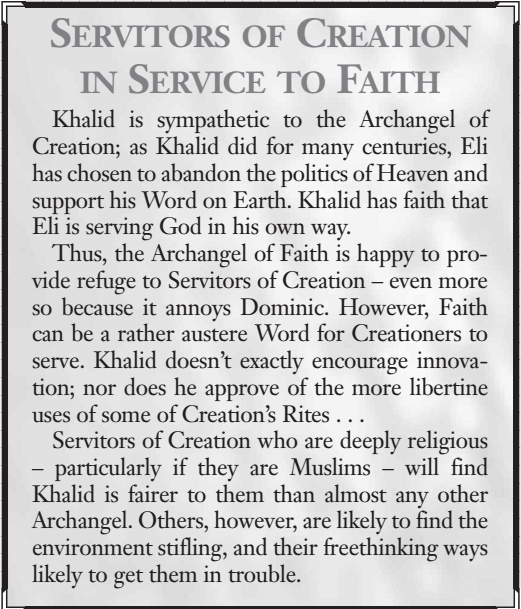
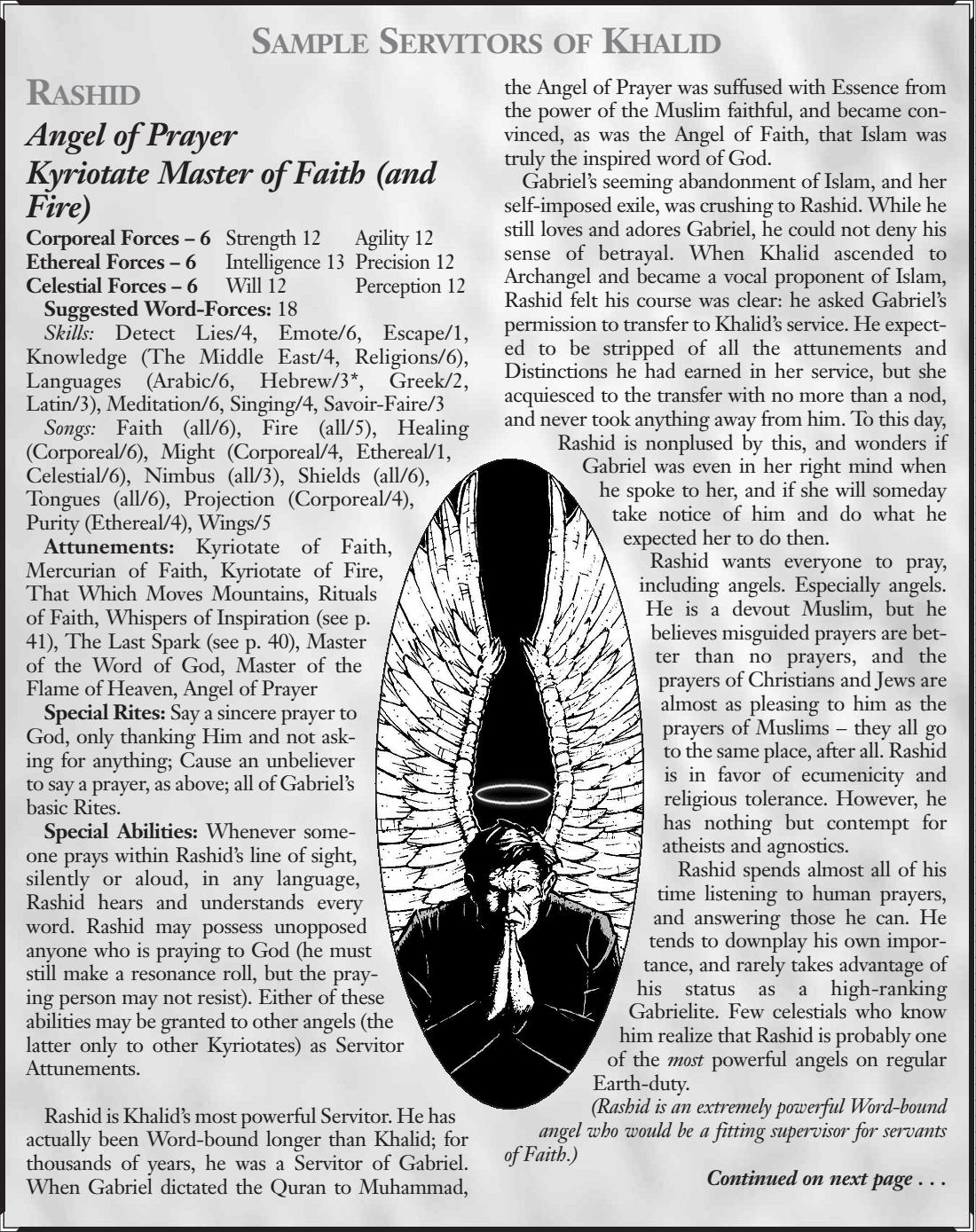
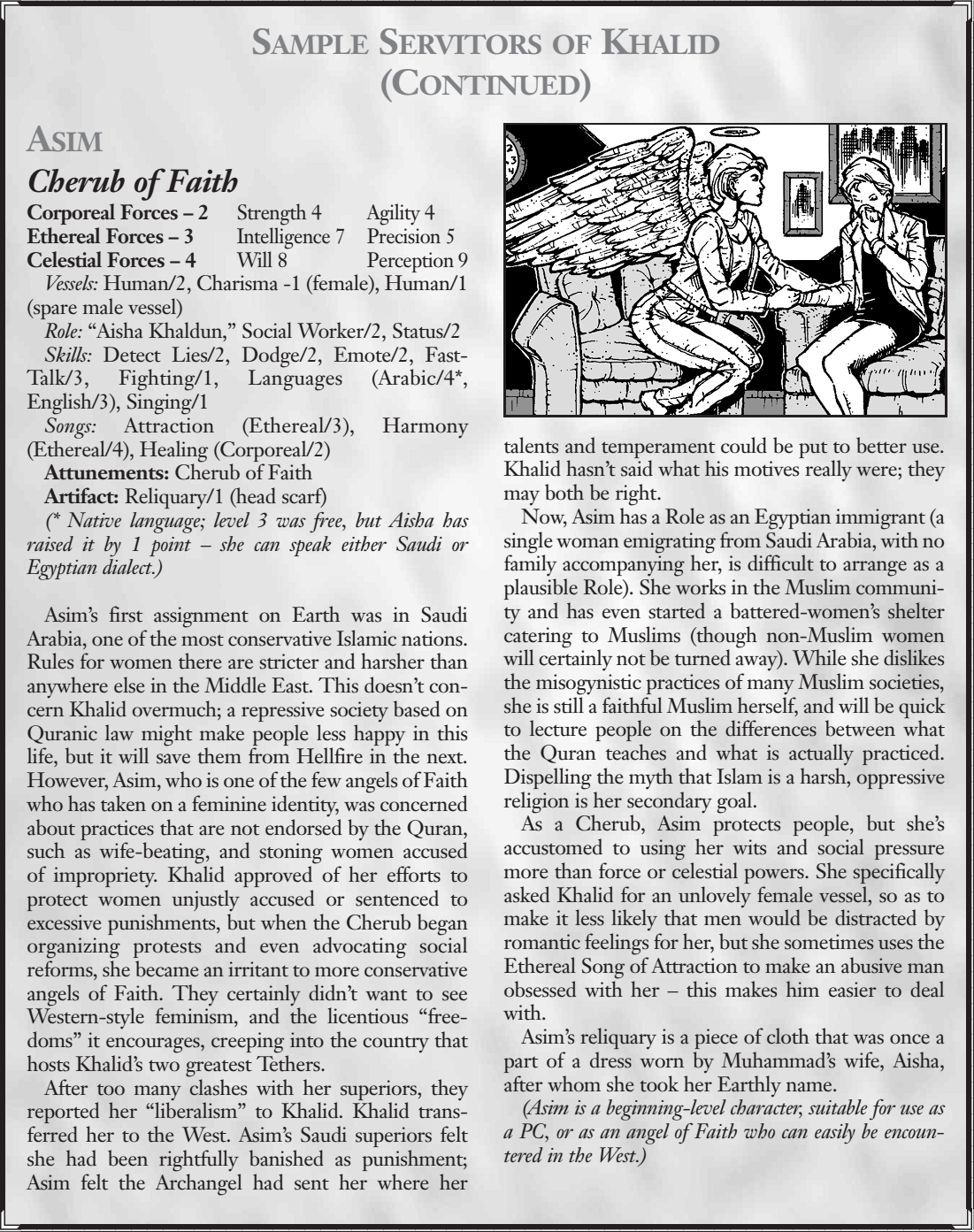
Next time: Destiny also sounds like a porno name
Destined for Greatness
Original SA post Superiors 3: Destined for Greatness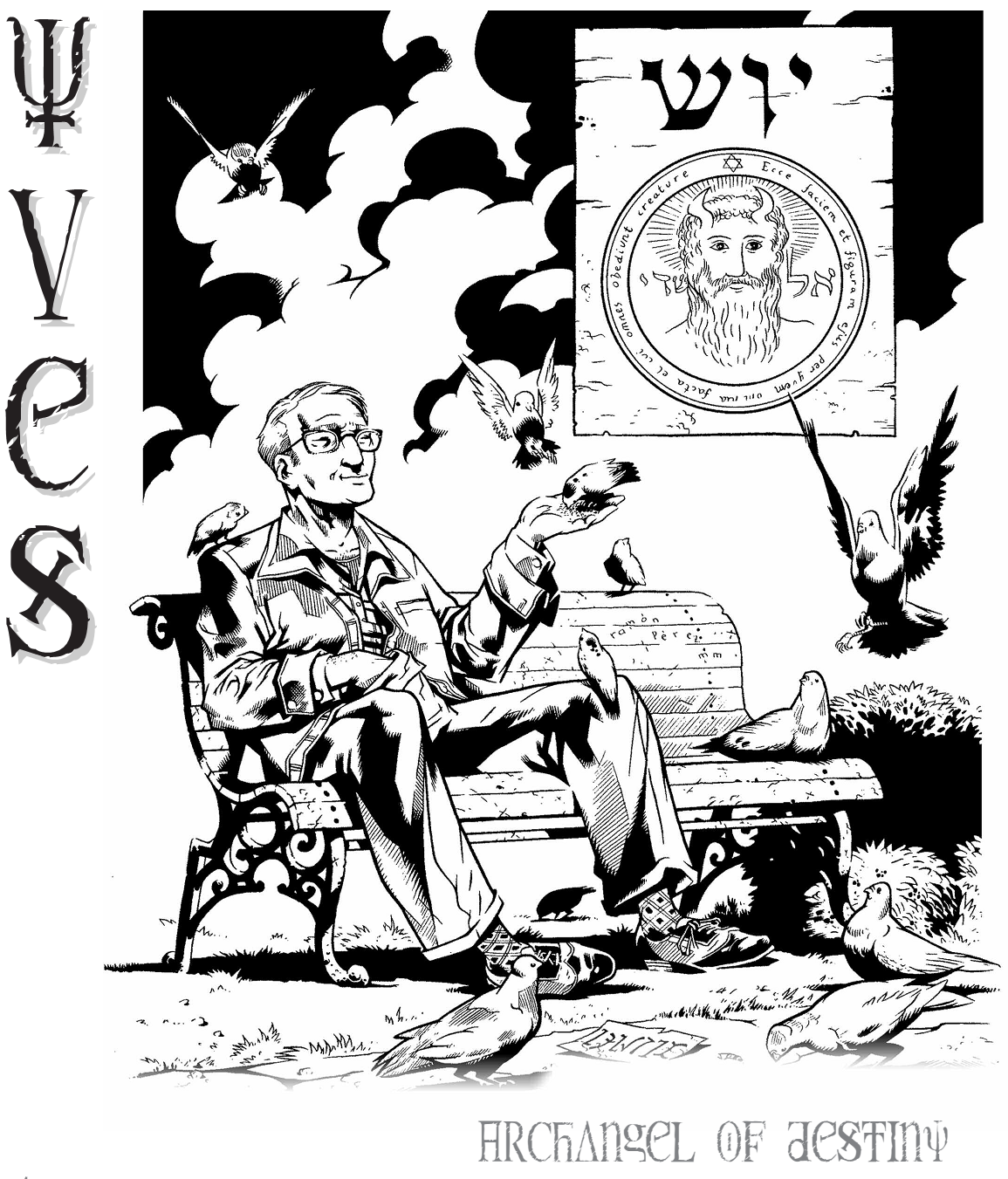
Yves, we will recall, is the Archangel of Destiny, the first created soul and has no Choir at all. He may not even be an angel. He has taken on the duties of Knowledge since the death of Raphael, having held them before her creation. He is quiet, rational and philosophical, and only Michael truly is hostile towards him.
Bright Lilim of Destiny know whether fulfilling a resonance-detected Need will lead their subject towards their destiny, fate or neither, though they do not know why.
The Akashic Record allows you tp spend 5 Essence to get the answer to any one question about the past or present. The question must be simple, direct and answerable in three words or less, though proper names count as only one word no matter how long they are. You must have a minute to quietly concentrate to use this.
Forgetful Words allows you to whisper in someone's ear and make a Will roll. If you succeed, the target forgets utterly ever meeting you for (CD) days, starting the second you leave their vision. After that period, they will remember only vague and fleeting impressions, easily dismissed as dreams or deja vu, so long as they never see you again. If they do, a successful Perception roll reveals all the memories. For 1 Essence, you may also implant a simple message or suggestion in a human psyche, such as 'spend more time with the kids' or 'forgive Dad', resisted by Will.
Library Card prevents you from being kept from recorded knowledge. Private stacks, Interpol databases, it doesn't matter. All mundane security effectively does not exist for you. Guards will wave you in, doors are unlocked, any password you try is the correct one and so on.
Past Lives is a rare attunement, allowing you to touch someone and see their existence in its totality. If the target has reincarnated, you see a montage of images and memories of their past lives, centering on key moments when they turned from their destiny or fate, binding themselves to Earth. You have no way of knowing which choices led away from which path, but will understand the target better and where their destiny might lie. You may also use this ability on Saints or the undead, but it costs 3 Essence.
Right of Passage is an attunement given only to angels that earn it, allowing them to spend 6 Essence to use a Gateway linking the Library to any repository of knowledge. Returning to the point of entrance is free. This ability is otherwise limited to Yves and the pure of heart, and any angel that earns this must be similarly pure. For every additional point of Essence spent, you can bring another person with you, but if they stray from your presence, they become lost. This attunement can only be used to go to the Library and back.
Synchronicity allows you to concentrate for a moment and spend 3 Essence to appear where you are most needed. This does not cause any Disturbance despite the Essence cost. You have no control over where you appear, nor do you know why or what you must do. The GM will usually send you to within the same city, however.
Yves' library contains every Song ever known, but only Yves can find them. He has been known to teach the Songs of Symphony, Correspondence, Daydreams and Fruition, and certainly knows several lost Songs.
Yves grants two higher Distinctions: Scholar and Philosopher. Neither gets any special powers, but both tend to come with unique Rites. They are considered of equal rank and are both equivalent to honored university leaders. Some angels do have both titels. The higher you are in the ranks, though, the less you go to Earth.
Expanded Rites:
1. Spend an hour writing in a journal.
2. Spend 6 hours walking a city's streets, witnessing the Symphony unfold.
3. Engage in a game of chance, not for profit, in order to understand randomness and how it impacts destiny.
4. Read the same book in at least five languages.
5. Help a mortal solve an enigma or recover some fragment of recorded knowledge thought lost, entirely via mundane means.
Common Destiny Malakim Oaths:
1. Never assume a course of action is the right one until all possibilities are evaluated. Act on reason, not instinct.
2. Never use weapons; they encourage rash actions.
3. Accept the possibility of forgiveness.
4. Never allow someone to reject destiny without confronting them.
5. Judge people for their present actions, not their past.
6. Show others the error of their ways, not through violence but through reason, understanding, and compassion.
7. Never let someone reject destiny because of pride or fear.
8. Fight only if I must, and not for glory or pride.
Yves was the namer of God, and of all things. Every creature, celestial or otherwise, comprehends his name intrinsically. Yves is the name that best defines him, and all know it. He manifests as an elderly man with gray hair, blue eyes and wire glasses. He has no other form, but all see him differently. The basics are constant, but the details vary. To some, he's a kindly grandfather, and to others, a regal head of state. Only has clothing has changed with time. In the Roman era, he prefered the robes of philosophers and oracles, and in the Middle Ages, he preferred a monk's habit. Today, he likes slightly wrinkled tweed sports jackets and slacks. He is the definition of a gentleman scholar, his emotions always in check. He never says anything but nice things, and he is reserved and prefers to only drop hints to let others reach their own conclusions. He never forces his opinions on others. Some have accused him of manipulation by his silence and crypticness, but he understands that the Symphony moves in mysterious ways, and even the most enigmatic or dubious motive reveals its purpose eventually, with faith.
Yves' Word, in many ways, is the Symphony. He understands that without Destiny and the hope of it and without the fear of Fate, there could not be a Symphony. These two constants are required for its existence, else even God would be in lifeless stasis, forever frozen in potentiality. When Yves saw reality for the first time, he understood that just as it began, it must someday end. That is what gave him the realization of the core of Fate and Destiny. One would end the Symphony in despair, the other make it something more. Without hesitation, he took on the job of shepherding and protecting Destiny, that which is best and brightest for the Symphony. Destiny is universal. Each aspect of the world has a part to play, and Yves' job is to make sure that potential happens. Destiny is not a thing or an idea, but both, and more. It is at the root of the Symphony, that which set it all in motion, the divine spark. More conretely, the Word is about guiding the Symphony and ensuring that Light wins over Darkness. Unlike other Archangels, Yves knows that the actions of mortals define Destiny. It is fragile and delicate, unable to be forced or manipulated. Destiny can only be chosen. Angels with the best intentions have turned others from their destiny to their fate by interfering with free will. Destiny must blossom on its own. It can be sheltered and protected, but cannot grow except by its own power. Everyone must choose their own path. Destiny is more than letting what is meant to be happen, though. Choices can't be forced, but they can be made out of education. Without awareness of all possibilities, there is no Destiny. That is why Yves is the Giver of Names and why his angels are Heaven's scholars. It's not enough to follow the less-traveled path - they must know where both paths lead and why. More important than even knowledge, though, is faith. Without it, Yves would not have the confidence to allow events to unfold as they should, knowing that God's will will be done.
The Symphony is both aware and self-aware. Everything is part of it, and it dances, it lives. When Yves was given the task of naming the Symphony's awareness, he named it God. From time to time, God manifests as a single perspective and single Voice, resonating with truth. This is enough to send even an Archangel weeping with joy, an overwhelming ecstasy of experience, and Yves holds that this is what it is constantly like in the Higher Heavens, where God is always visible. Why God first manifested is a mystery. Some demons say the Symphony was lonely so it fragmented itself. They point out that until the Fall, it was still lonely, and is probably happier now that the War has two sides. But they are demons.
For whatever reason, God did manifest, creating within Himself a consciousness to look upon Himself, and that was Yves. Yves named God in turn and looked God in the eye. What came was less the story of Destiny and more the birth of the cosmos. Yves was there to name Heaven as it was made, and each layer of reality above and below. He named Michael, the first angel, and each Choir. He named Man and gave the first Words. Yves is part of God. Everything is part of God, as God is the Symphony, but in another sense, Yves is more than just the Archangel that speaks to God - he is God manifest. It's not quite so simple - in the Higher Heavens, all have greater oneness with the Symphony. Yves, however, was the first to have such a place, and he chose to come down and stay with the angels. They don't understand why, but that's fine - their understanding of Yves is no more complete than man's understand of angels.
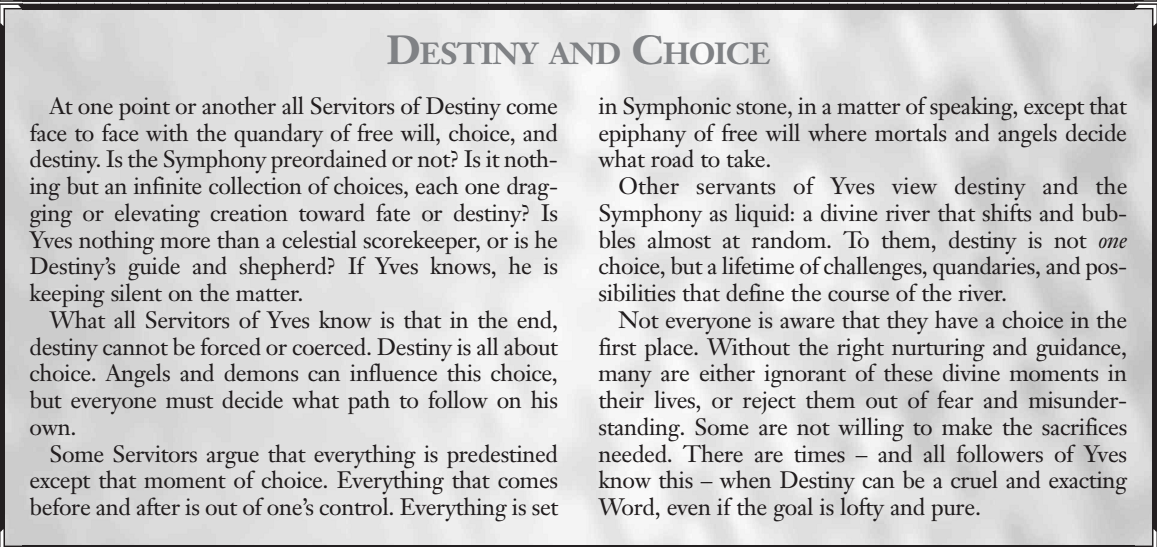
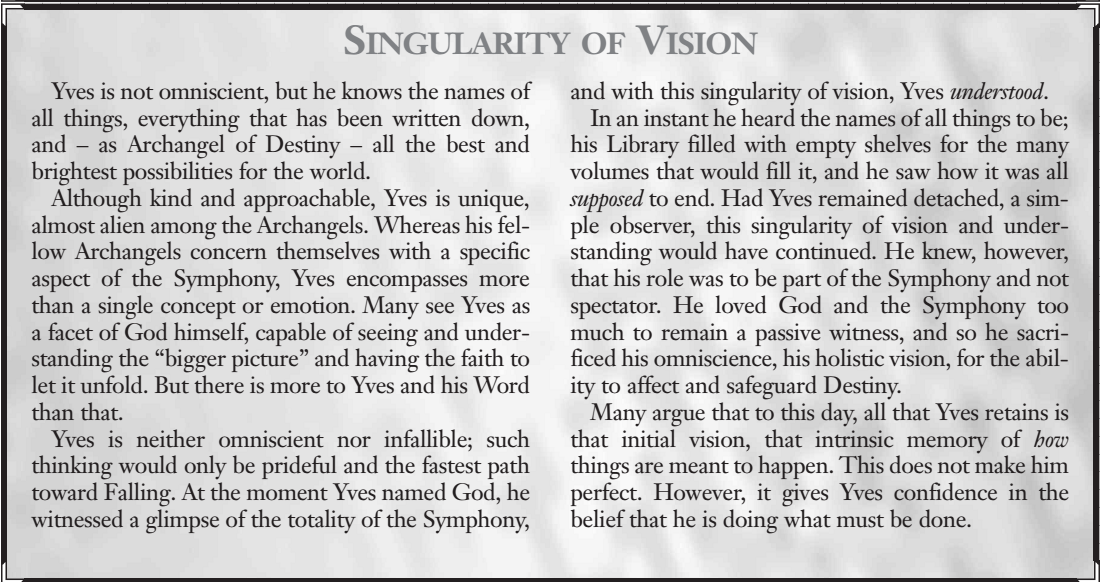
God is concerned with destiny on all leevels, including the Divbine. It is a mistake to hold that Good or Evil apply to Him, or that He is one or the other. Yves created this words to simplify the initial understanding of how things work, and these terms outlive their usefulness when you move to the next step. The truth is that the entire Symphony has a destiny and a fate, and they depend on the destiny and fate of every smaller thing within it. That's where Yves comes in. He is God's destiny, working to complete himself, while Kronos is a warped and damaged manifestation of God's fate, trying to drag himself down. Yves turned to religion in the earliest days to try and keep everyone's destinies safe. As the Host grew and learned about humans, they did so via the channels made by religion, a natural interface between divine and mundane. Some of the wilder spirits reveled in the idea, and cults and faiths of all kinds flourished and fought. What was meant to be a teaching tool was twisted by selfishness and ignorance to justify hatred, war and atrocity, and each new attempt just complicated things. Islam was Yves' last major attempt to teach humanity via religion. Not only did humans use it to fight each other, but the Archangels themselves were torn apart by it. Most of this took place in the younger days of the Council, and while young angels see those periods as errors of Yves, Archangels and humanity. The trouble is, many angels like to talk about how everything's a reflection of God, but forget how true that really is. The Symphony learns, and it was learning then, just as it is now.
Yves is an island of pleasance in the strained relations of the Seraphim Council. He treats all angels as friends, and all angels but Michael see him as a benevolent mentor. Meeting him is an experience in casual awe. He is easy to like. Unlike Kronos, who cares only for the powerful and significant, Yves cares about everyone . iterally everyone. Anyone talking to them gets a sense of it, but also a tiny hint of distraction. Yves' mind is busy at all times. He is the greatest of optimists, seeing the best in everyone, even seeing things they do not see themselves. He always uses the names people are most comfortable being addressed by, and he loves talking about any subject. He knows everything that is written down, but also knows that every living memory has unique experiences and valuable lessons, and he adores learning more.
Yves works mysteriously. He does not expend resources on key humans or conflicts, but works across a broad spectrum of thought and learning, to help humans better htemselves. He does the same with angels, every bit as subtly. He understands that destiny can't be forced. It is gradual, a process of learning and maturation. Yves tries to nurture, not drive, and his tools are insight and inspiration. His priorities and methods have shifted over time. Before Islam, he was equally ocncerned with knowledge and names, but acted more overtly, trying to inspire by awareness of the Divine. Now, he is focused more on human self-awareness and awareness of each other.
Before the Fall, there was only destiny. Fate existed only as dark potential, actualized by Lucifer's selfish act. The Fall was both a surprise and not a surprise to Yves. He know it had the potential to exist, but he never expected the Symphony to truly shcism into fate and rebellion. It was incomprehensible. To Yves, the War is all about destiny and that final choice that wil end the universe as it is now. Regardless of what Laurence or Michael thing, Yves is deeply involved in the War, tending to the Symphony via the actions of individuals and their choices. He is now focused on preparing his angels and all of humanity for the next millenium. Lucifer's forces seem to be winning, and even Yves is nervous. He knows, however, that all beginnings spring from the ashes of the old. The Symphony is changing and adapting, and what is needed are patience and understanding. Yves knows that rash action harms, denying wisdom and judgment and blinding faith with hubris. These may not be the end times, but they are difficult ones, and Yves wants others to be understanding and patient. Destiny can take pain and sacrifice, and events must unfold even if they seem harmful. No one can judge God's plan.
Yves sees God in all things. He knows God exists. He sees himself as a messenger, a manifestation of God's abstract Divinity. He understands that he's more the medium for the message - he is the message. He is also the messenger to God, who sees and hears all that Yves does and sees. Did Yves make God by naming Him? Some would say yes, and it's rather a chicken-egg argument. The issue is debated hotly in Heaven and Hell, and it's clear to everyone that there is a God, beyond even Yves' comprehension. Perhaps at the moment of creation, Yves lost the ability to understand God and became a separate entity, a part of God rather than the whole, unable to exist outside itself. Perhaps these questions are meant to make people aware they are part of a larger reality. Yves refuses to comment.
It is wrong to say that Yves doesn't play politics, but he plays them differently. It is not widely understood that Yves is, in a sense, God manifest, but it is understood that he talks to God. If you want to talk to God, you tell Yves. Since hte Islam incident, however, Yves is careful not to get too involved in angelic politics, trying to be detached. The truth is, though, he still profoundly affects the Archangels, who see him as a mentor and companion. They don't understand his motives, and while he is approachable, he is vexing. The militant Archangels especialyl worry over his motives, though only Michael openly criticizes Yves. The wounds over the perseuction of Gabriel still run deep there. Even Dominic, who sees Yves as the epitome of wisdom, worries about Destiny's laissez-faire attitude toward the Fallen and Redeemed. Still, Dominic does not question Yves. He has faith. As for Hell, Yves is confusing, and many demons fear him deeply because they cannot even begin to understand him.
Next time: Opinions, like assholes.
Destiny's Child
Original SA post Superiors 3: Destiny's Child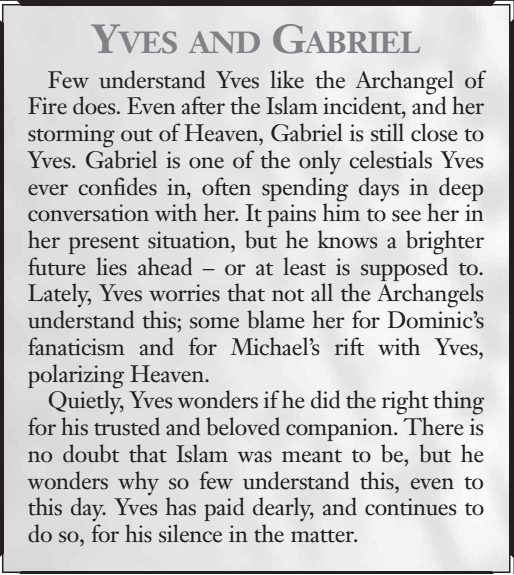
Superior Opinions posted:
Blandine: Kind, sweet old Yves... When I was younger and understood less, I once was foolish enough to be angry with him. Never since. He is a mentor and a friend and does as much to bring the bright dreams of mankind to reality as I do.
When the trouble with Beleth came, Blandine, dear friend though she is, was angry with me for not warning her. But I had, in so many ways; in every way that I could . That was a brief flash, though; she was still quite young, and she has since accepted the complexities of her destiny with elegance. She is one of our brightest, and I miss the days when we could talk more often.
David: We don't work the same way, but I trust him as I trust myself. I respect him. How can you do anything but respect him? Only Michael seems bitter toward Yves. Michael's reasons do not convince me.
The noble agents of Stone serve God's plan - and they will continue to do so as long as they stay true to themselves. But a stone can sometimes be shattered by a single blow.
Dominic: His kindness is often remarked upon. His unfailing sense of order and justice is less often spoken of. He is my most valued ally, and perhaps the first and last hope for everything.
Dominic is a paradox. His nature is to trust, but he must be suspicious. He is an idealist who must be cynical. He seeks perfection by finding corruption. The conflicts take a higher toll on him, more than he knows. In him are the makings of tragedy.
Eli: Yves? Yves? Oh, God. I love him, he's wonderful. Always was. Half of the Seraphim Council are as stuffy and narrow as they are just to compensate for the humility he makes them feel. It's not something he does on purpose, but it's a problem for them to get over someday.
I understand his wanderlust; creation is fleeting and elusive if one grows too detached from it. We tend to spend so much time contemplating the intangibles that we lose touch with what's real. I trust that Eli won't lose himself in the process.
Gabriel: When a long time passes and we do not speak, I remember his madness...his quiet, deep, essential madness. He is such a good friend and the kindest of them all.
I have long since put the past behind me - I have seen how others have taken words and twisted them. It is not my destiny that I am concerned about, but all of creation's. In the end, Gabriel will remain - this I have seen, as I have seen her aurora burn over the horizon of potentiality. She is the fire that speaks to patriarchs and saints, she is the holy inspiration that moves humanity to wisdom. Wherever she goes, there is God.
Janus: He changes; that's fantastic. He is proof that wisdom and stagnation have nothing to do with one another. As the chaotic forces erode the old surfaces and bare new ones, he's already there , smiling back at you as though he'd been sitting there all along, reading.
Pure and ever-changing, Janus sweeps through the Symphony shaking things up. He's the wind that brings storm clouds to wash away the old and feed the new. The change he brings allows the potential to become the possible.
Jean: A respectable scholar. The respectable scholar; many of the younger angels lack the wit to give him his proper due. Our purposes are really much the same; I meet him often in the Library.
The student is now the teacher, bringing light to the world - as is his destiny. I did no more than set him on his path, he did all the rest. A dear friend and scholar, faithful to the end.
Jordi: He was right to discard religion; it even tears angels apart. Big buildings, big temples, more people clustered together between walls. They don't belong there. These days, they're out there in the wild, finding the real truth again. And Yves - he cares about everything. I've seen his angels risk eternal destruction to help a crippled rat heal itself and return to its family. Animals have destinies, too, and fates...Yves doesn't ignore them.
He understands that everything has a place, but needs to extend his perceptions to include humanity. Perfect they are not, but they are part of God's plans. In time, all will be set right. Jordi is pure, his destiny bright.
Laurence: I respect him. I admire him. There are days when I envy him, and one or two days when I think I'm lucky enough to understand him. I'm glad the Halls of Worship are left to me, though. He made some mistakes there that he's been wise enough to avoid making again.
Some are inclined to judge him harshly, because he hasn't already won the War for us. After spending eons waiting for the Earth to cool, haven't his fellow Archangels learned patience yet? God didn't select Laurence on a whim.
Marc: He is the master of information, and that's the new gold, the gold that will last. He's always understood that. I'm a little embarrassed to admit how much of it I had to learn from him. Well - not really embarrassed. We all learn from Yves. He teaches us. I think that's what he's here for.
He exists for details. He understands the nuances and minutiae of mortal existence, but at times loses sight of the forest for its trees. At least he's an excellent listener.
Michael: I stood by his side to defend Gabriel. I don't think we've really talked since without fighting. He's wrong about so much.
War is a harsh Word to bear. He has gathered the years of his Word around him as a shield to protect himself from all other things. Time can refine the vision, or distort it: it will become clear, regardless.
Novalis: I adore the old man. You don't really know Yves until you've seen him in a garden...it's like another library to him. He sits down and smells the air and sees a million truths dancing in the sunlight. He's always been there for me, you know. When things get to be a little too much, he'll always find time to talk.
We share the same ambition, to encourage, nurture, and protect. Her Word is a microcosm of the Symphony.
Andrealphus: Yves may be an insufferably ineffable being, but a single soul reaching his fate in Hell proves him wrong, and proves that the entire universe is flawed. The only happy endings are the ones that we take for ourselves. He embodies a lie.
Some say the road to Hell is smooth and pleasant. Andrealphus embodies this. But even if he chose his path at the Fall, he cannot prevent the possibility of his redemption from existing. I think that frightens him more than anything else.
Asmodeus: Ah, yes, Yves. There's a curious being. So unlike the rest of Heaven's host. He and Kronos knock heads without even trying.
He's relentless in hunting down Renegades, those for whom the Symphony still has hope. Destroying the repentant can not drown out his desire for forgiveness.
Baal: I have no time to waste on that bookworm. As long as his spat with Michael keeps my rival occupied, so much the better.
There is too much destruction in the world. Everything he touches flares with dissonance and Discord. He must be stopped; senseless wars obliterate hope, and without hope there can be no destiny.
Beleth: Foolish Yves, little does he realize the darkness that lurks in the hearts of man, and in their dreams. If he really understood, he would see that destiny is nothing but a fanciful dream, and in his deluded mind, a nightmare.
Without the light of destiny, all one can see is despair and darkness.
Belial: Nothing burns better than paper - well, maybe flesh. Yves concerns me little...let him worry about destiny while I burn down this church here.
He reminds us that, while the spark of knowledge inspires, it can also consume and take on a murderous rage. Belial is a danger, but the same flames he worships will smother him.
Haagenti: Philosophy is paper. I'd rather have food and leave the words to Kobal.
Gluttony is a deep-buried root that can lead many toward their fates. However, the Prince has not yet reached his own - it is darker than he would ever guess.
Kobal: Wise as Yves claims to be, he still can't quite manage to figure it all out. Babbling about the greatest destiny and the highest potential...can't he see that it's all in vain? Such a waste.
Only God and Kobal know what his special task is about; I only have an inkling. All will be revealed according to God's wishes, of course, but I can't help feeling Kobal has squandered so much of his potential. A true shame. I miss him.
Kronos: Always struggling with questions of objectivity - should I or should I not? In the end, it doesn't matter, the longer he remains detached and "faithful" to God, the quicker Destiny and the Symphony will slip through his fingers. Destiny and Fate are one and the same when you really think about it; it's all a matter of taking choice away and keeping people in the dark so that we can enforce our will.
He's mistaken, blinded by arrogance and hubris. Destiny is to give oneself to a higher power. Fate is to succumb to one's fears and worries.
Lilith: I remember when he named me. And I remember when he walked away, and Lucifer explained free will to us. Yves is tricky, but I'll deal with him; the knowledge he commands is still tempting.
It remains to be seen if Fate has truly claimed Lilith - her story is not over. Freedom brings hope, and hope leads to destiny.
Malphas: He understands the Symphony is made up of individual parts, each with their own wants, desires, and ambitions. I just shake things up a bit.
He does Heaven's work without knowing it. For every soul he snares, another ten see the lie and strive for the light. After a while, people stop believing in lies and seek the truth.
Nybbas: Destiny makes a nice plot, but in real life, it's a load of crap. You get to the top on your own, and you stay there by standing on the dead bodies of your rivals. Yves is a senile old fool with his mind in the Dark Ages. Kronos can handle him.
His alliance with Kronos is a dangerous one. He allows Fate to reach out further than it ever could before. Nybbas is a key figure in the War, and will have more to do with its conclusion than many will admit.
Saminga: Silly little man, there is no destiny except death. Death is the end of everything.
Death is an integral aspect of the Symphony - natural, necessary. He has perverted it, turned it into something to fear, and this only gives Hell more power.
Valefor: His Library is full of priceless books he wouldn't miss...if I could just get inside. Again.
Loss can be good, forcing one to reevaluate what is dear and why. Theft shakes things up, but more often than not in a negative and harmful way.
Vapula: Pathetic and irrelevant. His time is past.
Technology is such a wonderful "gift," but so easily abused. He has made the ends justify the means.
Humanity: Humans are the linchpins of the Symphony in a way we can only barely comprehend. Each stands at a crossroad between destiny and fate, the choice their own, but few of us understand exactly what this means. It is easy to forget, with our gifted vision and station in the Symphony, that all we'rem eant to be is guardians and protectors. The Symphony was created for them; our job is to ensure the show runs smoothly and that it ends as it's meant to.
Soldiers of God: They have accepted their role in the Symphony and God's plan and now strive to show others the glory of destiny. Single-minded in their dedication, they understand as only those who made the right choice can. We can only see one path, the bright one, but my Soldiers understand all too well that there are two paths, and every being ultimately decides which to take.
Sorcerers: They are no strangers to choices, but unfortunately they often make the wrong one. Those few who avoid fate have bright destinies, as their special gifts give them a vantage point unique in the Symphony.
Ethereals: Everything has a destiny. Uriel's crusade destroyed many and sent many more to their unjust fates. This is why patience and understanding are needed more than swords or rage to win the War.
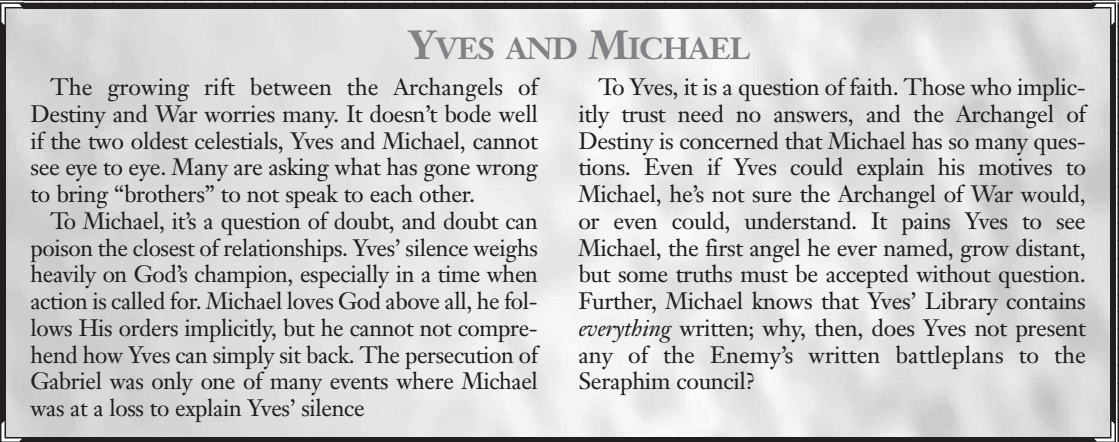
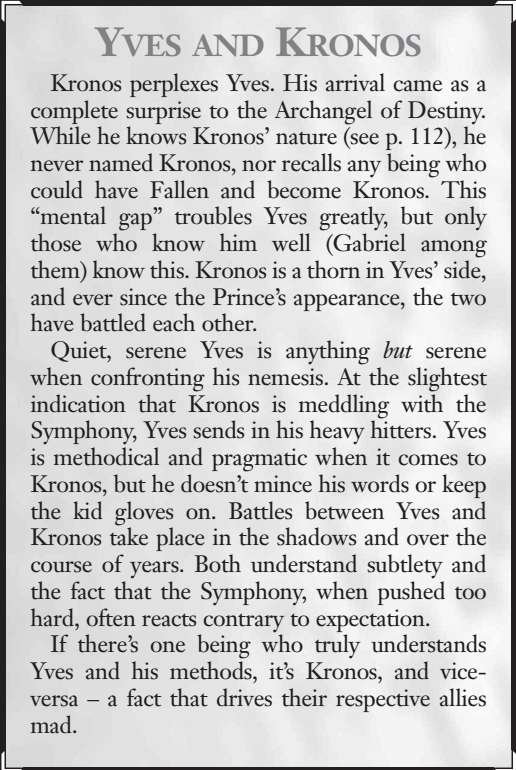
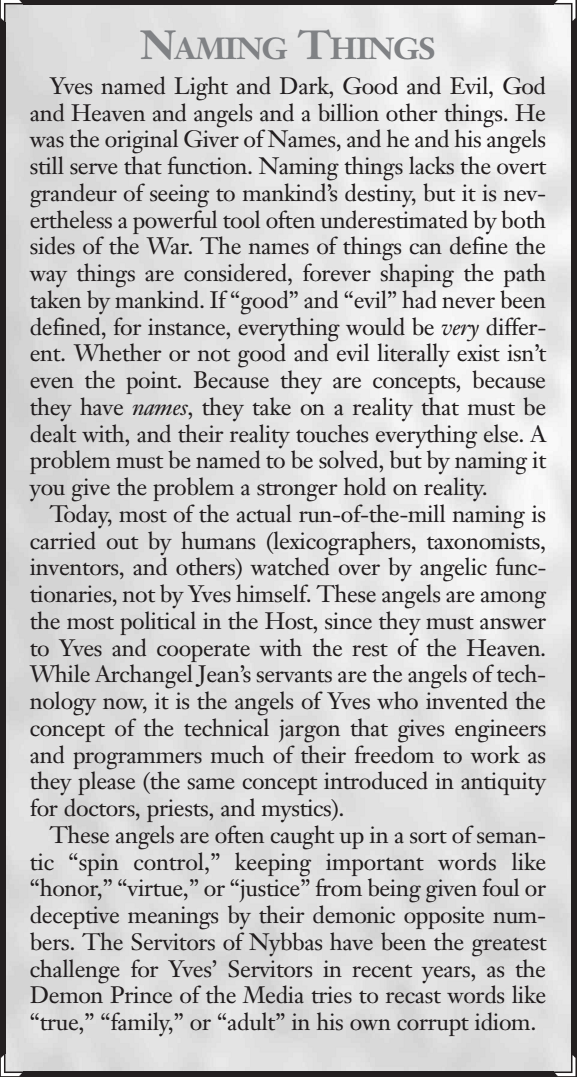
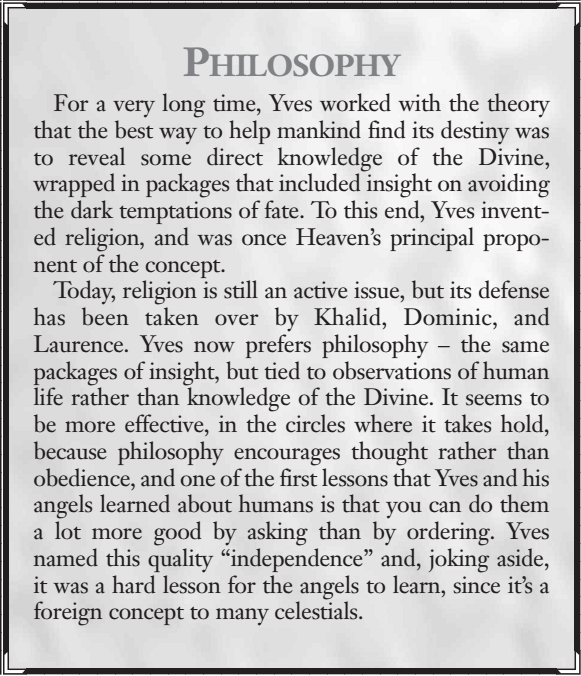
Variations! Yves as God is...God, or at least a part of God projected to better understand the Symphony and its potential. Yves could easily be an enigmatic divinity watching over the Symphony. From this view, Yves/God sacrificed His universal view for a more detailed, intimate understanding of His creation, and He sees things as His angels do, better understands them and can ultimately guide them down the truest path. Yves as Tyrant, on the other hand, is darker - willing anble to do what must be done to ensure Destiny is all there is. He is the ultimate manipulator and puppet master, using his knowledge to control events such that there is no choice possible between fate and destiny. The ends justify the means. Yves is not heartless, but he will do whatever is needed to get an outcome favoring destiny. He will not hesitate to sacrifice anyone or anything to bring the Symphoyn closer to its destiny, and he will try to ensure people can only make one choice, no matter the cost. He is Heaven's dicator and conspirator, pulling strings and using his knowledge to orchestrate the War. It would take anyone, even the Judges, years to uncover his web of control. He would retain his stoic, calm exterior, but it would be a mask to hide behind. Yves as Madman understands, but that understanding has a price. The moment he saw God and named Him, Yves' mind fractured under the sheer potential. He still remembers parts of the whole, but as time passes, his memory and mind degrade. He is insane, muttering prophecies as Heaven's oracle. His angels catalog his every word, hoping to decode the truth. He sends his servants on random, often pointless missions whose significance is known only to him, if they have any at all. He is watched closely by Judgment, but even Dominic can see the kernel of truth in his rambling. He is confined to his Library, which resembles more an asylum as it mirrors his shattered mind. Michael, honest and pure, distrusts him and fears he distorts God's words. He sees the madness as a virus infecting Gabriel and perhaps Eli, and he wants to keep it from spreading. Yves is a tragic figure, an angel who has seen God's glory but cannot convey it in terms anyone else, even an Archangel, could understand.
Yves' angels have a special place in Heaven. They serve the being that named God, but they also maintain the Library, the greatest repository of knowledge anywhere. It is in mayn ways the center of Heaven, less grand than other Cathedrals, perhaps, but the support for all of them. Most angels visit the Library at some point, and even Archangels use it to find information or confer with Yves. It is a nexus, a crossroad of possibility. It is only a place in the loosest sense. Its main entrance is in the Eternal City, a simple and classical building with the inscription 'Eternal Light,' read in whatever language the reader is most comofrtable with. Inside, it molds itself to suit its visitor's needs, though those needs are rarely obvious to the visitor.
There are some constants, but other things change moment by moment, nearly invisibly. One minute you are heading down a corridor, the next you are at a dead end or a vast chamber. The Library is alive, a being rather than a place, and some say it is an extension of Yves or even of God. Some wonder if Yves is God's consciousness and the Library is His subconscious. Yves and his older angels allow the Library to take them where it will, but the inexperienced are less wise and easily become lost within its stacks. Most of its paths lead nowhere, heading on infinitely, or to reading rooms of many sizes. Soft, warm light pours in via stained-glass windows, and the high ceiling is cast in shadow. It is not threatening, but rather provokes an awe of infinity and potential.
The Library contains all knowledge - everything ever recorded, from graffiti to lost letters to paintings to CDs. Sumerian tablets rest next to photos of the Kennedy assassination, scrolls from the Libraryo f Alexndria are nested between corporate memos and poems. Its contents are not limited to the corporeal, either. Anything written by ethereals or celestials, even Lucifer himself, is somewhere in there. However, that doesn't mean it's easy to find. Only Yves can find any item reliably. Other angels must spend long periods hunting, and the Librarians face the daunting task of cataloging and referencing the contents for visitors, an endless process that must restart whenever the Library shifts itself.
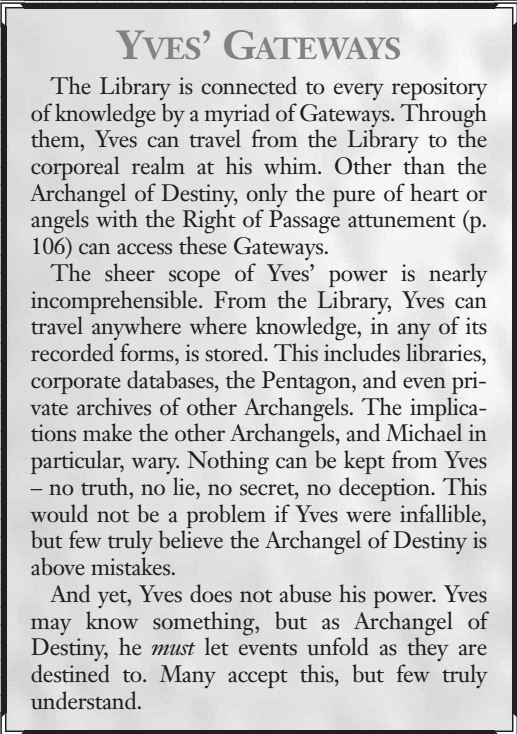
There are a few permanent locations, though they wander around in the building. The Halls of Remembrance are somber and holy, the home of the Tomes of Memory, which are books containing the memories of all who have died and passed on. If they are not read once every few centuries, they seem to vanish, which even Yves can't explain, but they have occasionally resurfaced elsewhere in the Library. The Halls are vast, circular chambers with walls lined in alcoves where the tomes sit, each illuminated by a votive candle. A bridge crosses each circle, containing reading tables where angels and the blessed souls can read the tomes. Talking is forbidden in the Halls, out of respect for the dead. An order of Yves' Cherubim, the Mnemosyne, care for the tomes and fetch them for visitors. Many of them are Masters of Divine Knowledge and have been given the Seraph resonance to better guard the Halls.
Yves' Attaci is not found - it chooses its visitors. A simple wooden door is its entrance, and behind it is a winding stairway up to a simple platofrm that offers a spectacular and disorienting view. Stairways and bookshelves defy what little gravity exists in Heaven, jutting from the ceilings, walls and floor. The Attic is filled with unfinished books, failed attempts that have no other place. Here, you can find rare and priceless fragments - Shakespeare's notes on Hamlet's plot, an incomplete alternative to the I Ching, possibly even fragments of the tablets containing some of the commandments never given. Unknown to anyone, Yves has a room in the Attic that views the Marches. Here, Yves comes to contemplate and record his own impressions of the Symphony and the War. This room is full of his personal accounts, from the time he named God to now, written in a language known to no other being.
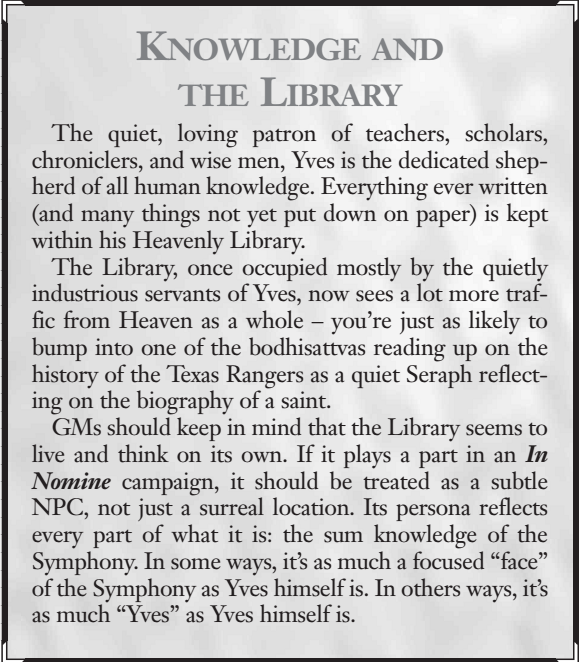
Next time: even more sidebars
Behold Your Destiny
Original SA post Superiors 3: Behold Your DestinyThe Corridor of Histories is a long hall containing everything on the history of the universe. Once you enter it, it is infinite - it goes on endlessly. The ends appear to be always in walking distance, but you can never reach them, until you find the volume you are looking for. At that point, you can leave through an arch that appears to have been there the whole time. Along the shelves is every written account, true or false, of celestial history. It covers everything - Eden, the Rebellion, the death of Raphael, all of it. The current Curator is Tirshatha, a Cherub and Friend of the Sages who has spent his entire existence in the Corridors.
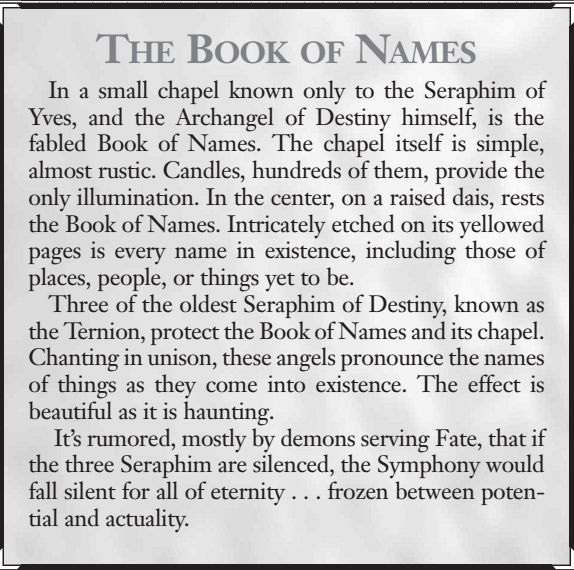
The special Collection is a single room, deep in the Lbirary. It is the only room that is locked, and only Yves has the key. The Library actively tries to keep people away from it, but a really determined searcher might be able to find the door. Within the room are books of lore deemed too dangerous even for angels. Only Yves and a few other senior Archangels have ever entered the Collection. It contains, among others, the works of the Grigori, the Testament of Lucifer (which was written to justify the Rebellion) and the Book of Fate.
At any time, the Library is qwuite busy, full of angels of Destiny doing their work alongside various visitors doing research and blessed souls reading for pleasure. The most common angels are the Librarians, traditionally relievers or junior angels of Destiny in training, or occasionally an experienced angel doing penance or taking a break from Earth. They spend most of their work helping opthers find the books they're looking for and cataloging the endless shelves. Beneath the Librarians are the Scribes, generally blessed souls of former Soldiers of Destiny, trusted to document current affairs across the Symphony and track the reports of the angels of Destiny. Most are assigned to selected angels as chamberlains and assistants.
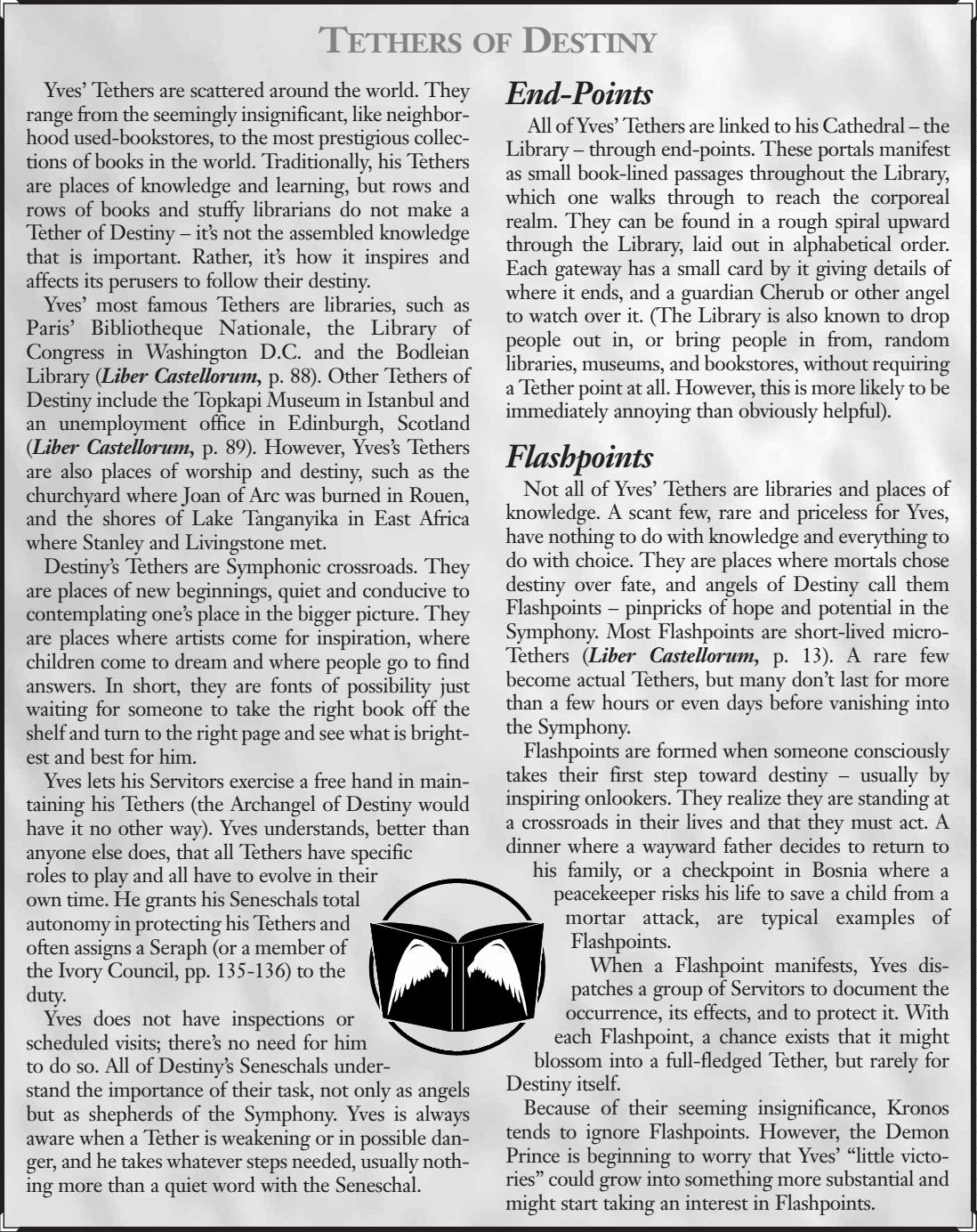
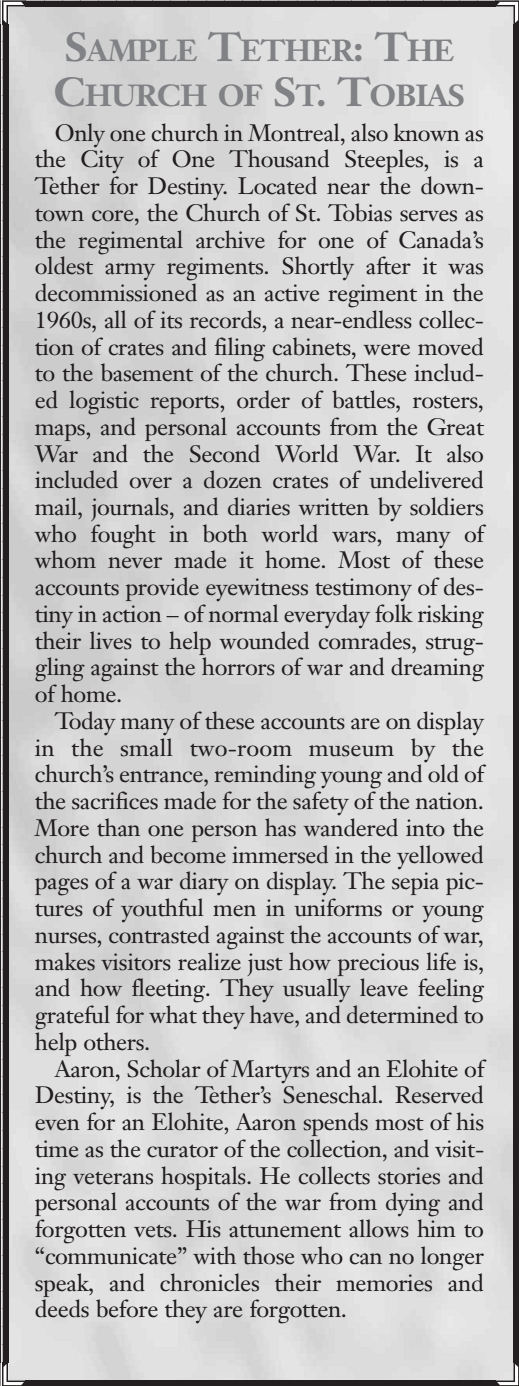
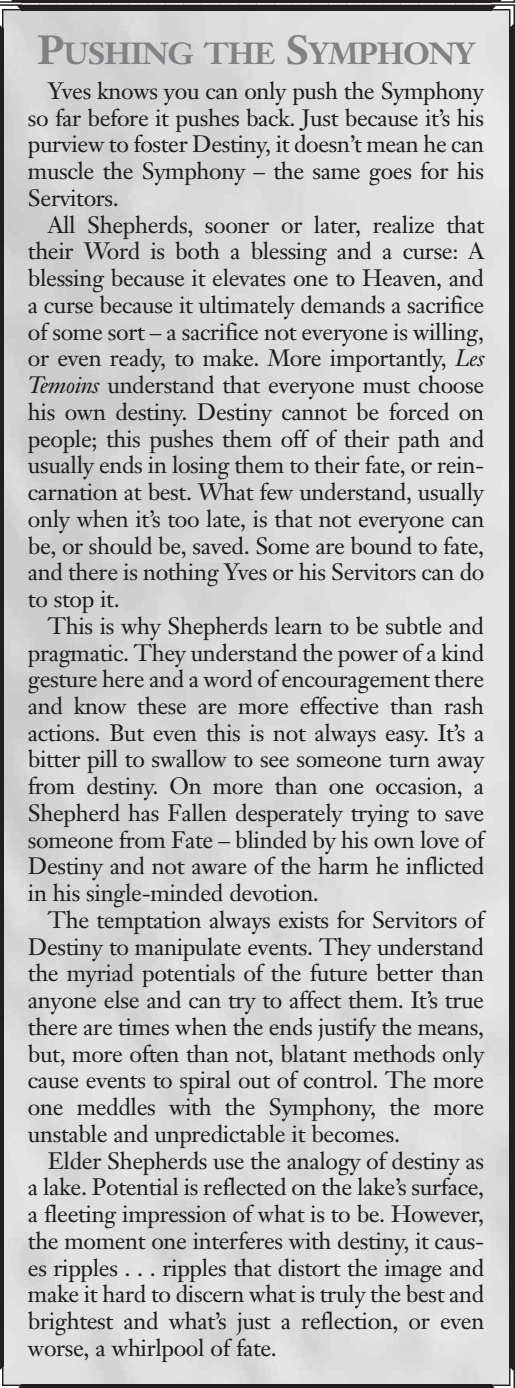
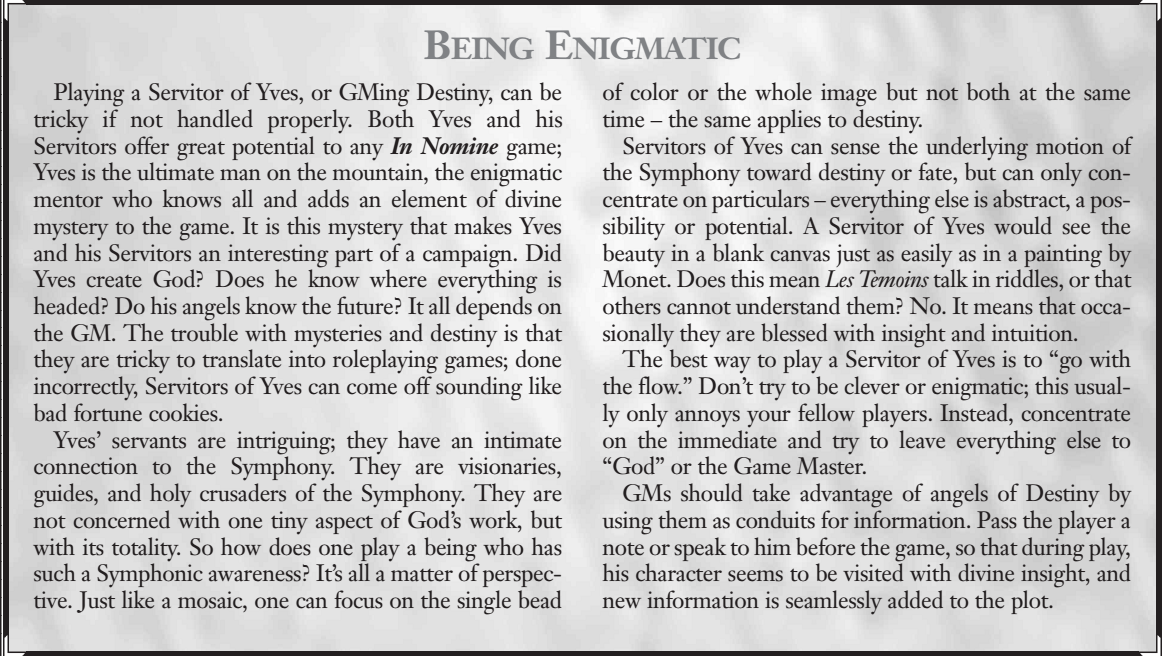
Angels of Yves, also known as the Shepherds, ensure that everything prospers from its destiny. They leave the flashy displays to other angels, preferring to work on a more personal level. Yves does not see himself as a general, but a guide and advisor. His Wordbound are arranged in cascading spheres of domains, but the angels do not see themselves as a rigid hierarchy. Rather, they work together and respect their elders.
To most angels of Destiny, the work is its own reward. Beyond tha,t the greatest gift Yves can give is knowledge. He tends to reward his angels with Rites and attunements, but occaisonally visions of the future, as well. He doesn't like to punish, but sometimes he must. The worst punishment for most Shepherds is to know they failed, and the anguish can sometimes lead them even to a Fall. When possible, Yves prefers to personally speak with an angel that needs punishment. If just a talk doesn't work, he'll just say 'I can't help you' and leave. The worst he ever does is Shunning. The Shunned are banished ot Earth until they realign themselves with Destiny. In sever cases, they are also stripped of their attunements. The Shunned, of course, are pariahs among angels of Destiny.
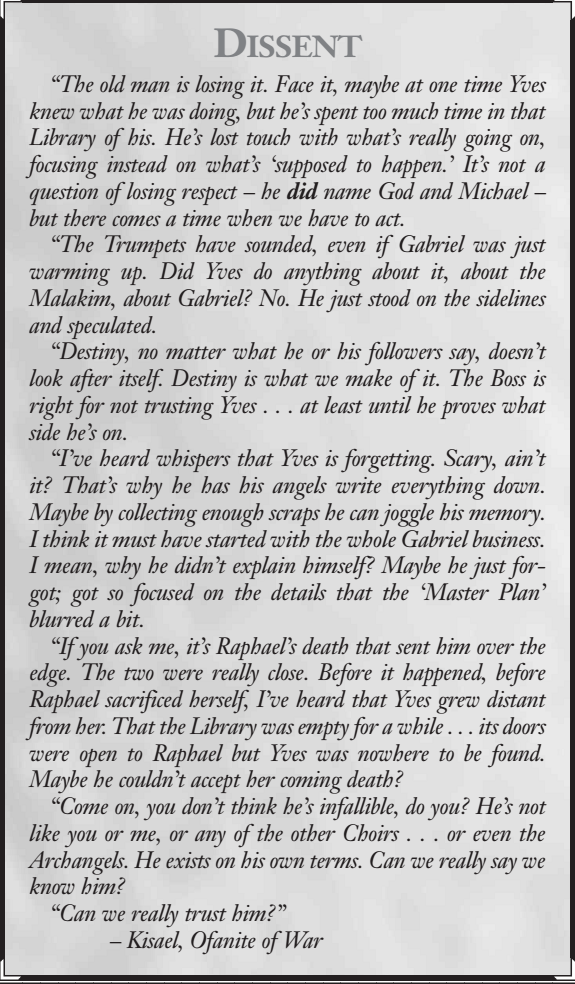
Serving Yves isn't easy, and it can be very taxing on the mind and spirit, knowing so much rests on you. Burnout is relatively common, and even after a vacation in the Library, some never recover and need to change Archangels. Most don't even have to ask. Yves either lets them go with clear conscience or gives them a chance to leave without hte shame of quitting. After all, whether they serve him directly or not, they are still ultimately serving Destiny.
To Yves, the Redeemed are perfect examples of Destiny's power. Every angel that returns to Heaven is a victory, and Yves has a large number of Redeemed and former Fallen in his ranks. In part this is due to his Redemption Squad, who help demons seek out Redemption. For the most part, the Redeemed serving Yves are focused and almost fanatical believers in Destiny. They are willing to sacrifice almost everything to further hte Word, and all he asks is they do what is best and try not to obsess over it.
At some level, all humans serve Destiny. Since the earliest days, humans have aided in the work - they spread religion, they tried to excplain the world around them. Sometimes, Yves feels closer to them than to angels. Humans are unpredictable, and htat's what makes them precious and beautiful. Yves has appeared to many humans, but few ever realized who they were meeting. He encouraged the formation of theocracies to help humans unlock their potential via belief, though after Islam and the Crusades, he realized that religion too easily lent itself to fanaticism and blindness, that only knowledge could free humanity from its fate. He left religion to other Archangels, focusing on learning as the Enlightenment began. In that period, he had many Soldiers. Soldiers of Yves are defined by their optimism. They strive for change, but they're realistic. They aren't trying to change the world, just how people relate to each other. Traditionally, they serve as community figures. Where the angels of Destiny are subtle, the Soldiers are open, leading families and neighbors a s preachers, principals, local cops and more. Saints are also central to Yves' organziation, icons of Destiny. Every Saint, after all, is a human that achieved their destiny.
Rumor has it that Yves does not create angels - they just manifest to serve the Symphony, and he only cares for and guides them. Some even say that God personally creates them. Yves is always careful to allow his angels to express their individual natures and try not to force them into molds.
Seraphim of Destiny are good at seeing truths even other Seraphim don't understand. They are God's eye on the Symphony, seeing past illusion, self-denial and delusion, and so they are able to sense true names. They are also known as Heaven's Chroniclers, and they make excellent and unbiased historians. It was one of Yves' Seraphim who chronicled the failure of Eden, the Fall of Lucifer and the Rebellion, and the Purity Crusade. It is said that Yves even has Seraphim in Hell, recording the torment of demons and the damned. The Seraphim also work as teachers and mentors, helping prepare other Shepherds for the road ahead. Many never leave Heaven except on sabbaticals. They are often aloof and distant, focusing on some distant fact, as they see so much that they can rarely comment for fear of possible lies. While not all are, most are guarded against predictions, as being wrong may not be dissonant, but it's definitely unpleasant.
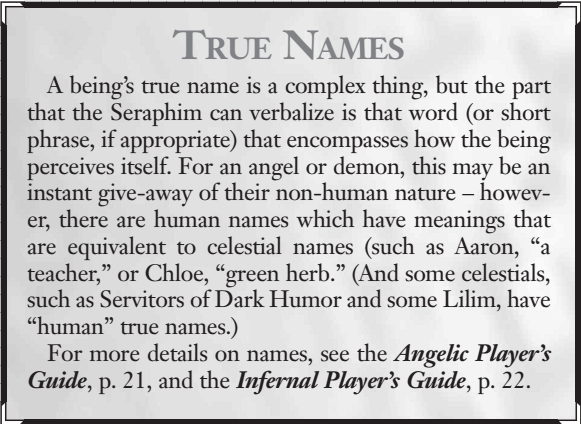
Next time: Destined for changes
Behold Your Destiny
Original SA post Superiors 3: Behold Your DestinyCherubim are the second most common angels of Destiny, and they guard humans as traditional guardian angels, looking out for their charges' well-being. Most work in Earthly roles that let them watch over people without drawing attention - cops, firemen, teachers, lawayers and local politicians, usually. To keep them from getting too emotionally attached, most never directly interact with their attuned. They watch from afar and get involved only when necessary. They are subtle and patient, willing to work over entire lifetimes. They may be guardians, but they're Shepherds first, and at times, they have to accept that destiny isn't painless or pleasant. When they act, they must accept the potential for longterm ramifications. Those who don't are usually close to a Fall.
Ofanim of Destiny are, like most Ofanim, wanderers. They are often overwhelmed by the sheer vastness of the Symphony, famous for just riding the waves of chance to let the Symphony take them where they must be. They are the eyes of Yves, and the ears and hands, moving almost at random to spread destiny. They serve as messengers, heralds and harbingers, traveling around and shaking things up while keeping an eye out for those close to fate. Legend has it that one of them appeared to Constantine the Great as a flaming cross bearing the sign 'In Hoc Signo Vinces', or 'in this sign you will conquer', during the battle that marked him as the first Christian Emperor of Rome. Some have compared the Ofanim to muses, inspiring mortals to greatness, and they do work closely with Creationers. They also empathize with Gabriel and her persecution. They are known to go out of their way to help Fire angels, and Judgment tends to watch them closely.
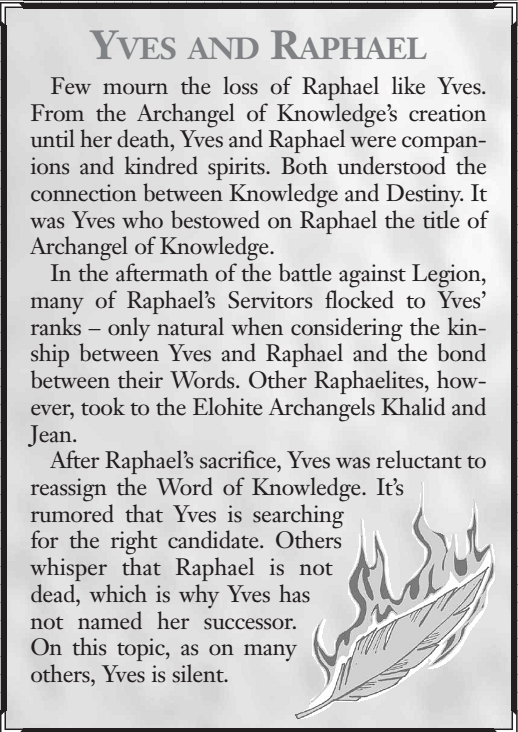
Elohim of Destiny are the most common of Yves' angels. They are excellent at understanding the subtle webs of destiny and how to work them quietly. Many believe Yves trusts them the most. They don't consider themselves above any other Choirs, but they do sometimes theorize that all Elohim, regardless of Archangel, ultimately serve Destiny. They are the foot soldiers, spending their time observing the complexiities of Earth. They are often teachers, librarians, reporters or counselors. They are the only angels that can, if rarely, predict how someone will exercise their free will, which makes them deeply valuable. Their objectivity also makes them unafraid to do what must be done, even if it is painful. In Heaven, they can be found working alongside the Seraphim of the Library, or advising other angels. Most of the Ivory Council is Elohim, and they have great pull within the Word. They tend to handle discipline, ensuring all angels of Yves act with Destiny's interests at heart, free of pride.
Malakim of Destiny are often misunderstood or mocked by other Malakim, but they'd almost never switch Archangels. They are bulwarks, pure and honest, the first and last defense against Kronos and the other Princes. Objectivity and free will aren't their problem - they do what must be done. Most work closely with Elohim, stepping in when direct action is needed. They will be the ones to decide if anyone, human, demon or angel, has a chance of redemption, and if so, they will go to great lengths to help. Others may perceive them as weak or cowards, but they know that is not so. Honor, they know, doesn't preclude forgiveness or compassion. However, they are still Malakim - they don't like lies or weakness. They'll offer a second chance, but not a third, and they have no remorse when that happens. They also serve as Symphonic watchdogs, thanks to their attunement, keeping an eye out for Disturbance. They are quick to respond and hold people accountable - and if they judge the action that caused the Disturbance unjust, they'll unleash their fury, even against other angels. They tend to have noncombatant Roles, to remind them of their purpose - lawyers, professors, coaches, taxi drivers.
Kyriotates of Destiny see many possibilities that others miss. They understand rnadomness deeply, knowing that at any time, everything can be both true and false. Many work closely with angels of Lightning to catalog and process information. They make great researchers and multi-taskers as well as problem-solvers. Yves likes to use them as detectives, too. They can handle all kinds of probabilities that others can't, and many see them as mavericks and celestial cowboys, something they're quite proud of. They aren't afraid to take risks or screw up, knowing that flexibility is key to destiny. If you get too hung up on 'should,' you lose sight of what is. On Earth, they tend to flit between hosts quickly, rarely forming stables of potential hosts. They tend to think in the future tense rather than the present or past, which can be maddening to others.
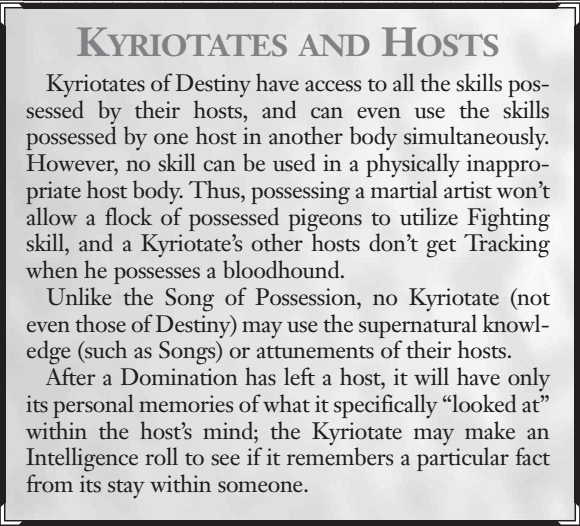
Mercurians of Destiny are sometimes looked down on by other Shepherds, as their closeness to humans can make them blind to the grandeur of Desitny. Still, they have an intimate understanding of humanity. They may not see the big picture, but they understand individual action deeply. They focus on the here and now, and are often best at guessing the future of specific people, as they are good at limiting their perspective. They see no point in focusing on the big picture if you don't understand what makes it up. They serve as guides for other angels on Earth, showing them the beauty of the small. They understand human conditions and can help others relate to humans and their fickle natures. They are like pastors or shepherds, never directly affecting others but subtle guiding them. They prefer to remain unobtrsive, though their roles tend to be somewhat public - politicians, anchorpeople, actors, athlets - so they can influence many mortals by their actions.
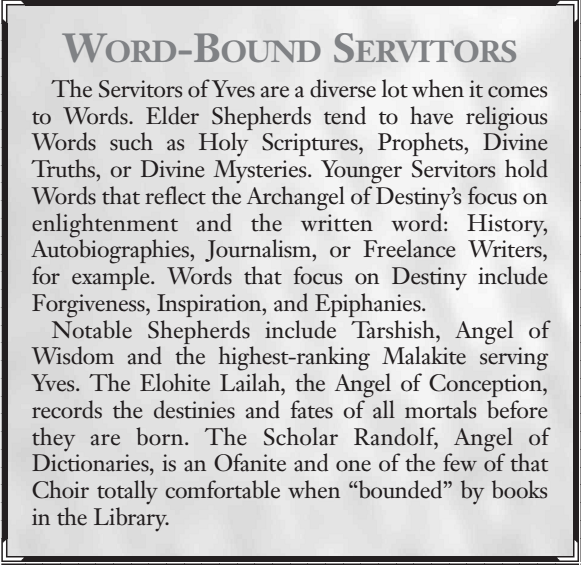
Working for Destiny isn't clearcut. It's the greatest mystery of the Symphony, awesome in its grandeur, and 'what should be' is hard to define. Thus, Shepherds try to focus on the immediate and everyday choices. Their work is dominated by details, and that's why knowledge is so important. When tending Destiny, a longterm view is best. When they act, angels of Yves do so knowing they leave a lasting impact. In Heaven, they largely work in the Library, transcribing, recording and researching. Most angels of Destiny spend their early years in Heaven before being assigned elsewhere. When not in the Library, they advise and tutor other angels on various topics.
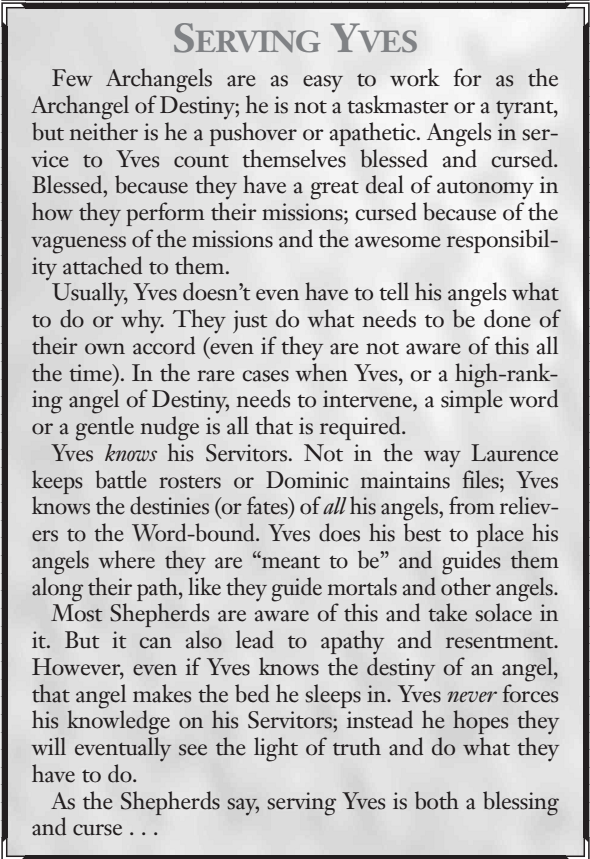
In the Marches, the Shepherds weave destiny in dreamscapes. They long ago discovered that dreams are a great way to push people down the path of destiny, showing them the possibilities ahead - good and bad. (Angels of Dreams do not always appreciate dreamers being given nightmare glimpses of their fates, however.) Dreams give a lot of freedom, allowing a more active role in pushing good choices. They are flexible and symbolic, excellent tools. Unfortunately, Kronos is aware of this, too, and the Marches are a nightly battleground of Date and Destiny, much to the annoyance of Blandine's angels.
On Earth, angels of Destiny work as guides, mentors and guardian angels. They try to get people to strive to be their best, understand their strengths and limits, and accept themselves for who they are. They tend to have strong and longterm Roles. In the War, they serve primarily as support, providing logistics and information gathering with their subtle natures. Their advice can be key to victorious operations.
Destiny isn't always reached painlessly, and what is best may not be what is most happy or joyful. Shepherds know that some events of pain and misery must happen, and there are times they have to sit back and do nothing. Sometimes, watching someone die isn't enough - sometimes, they have to ensure a death happens to make sure destiny continues. These jobs, known as the Black Ops, are assigned only to the most trustworthy angels. While they msut be done, it hurts Yves and the angels every time they must sacrifice someone for the greater good.
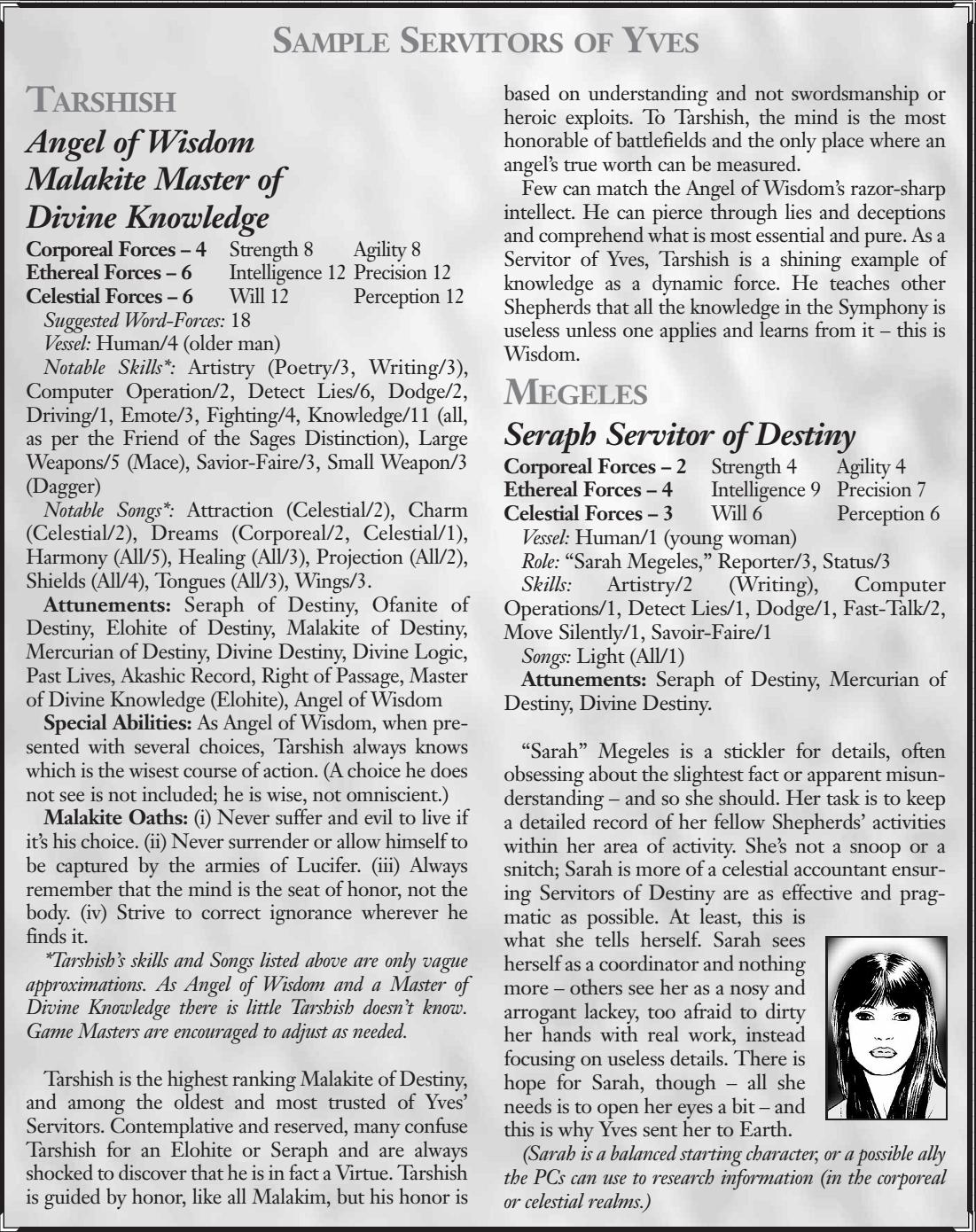
The Order of Redeemers, AKA Redemption squad, are a group of Shepherds who keep an eye out for demons ready to Redeem. It's a dangerous job, but also a deep honor. Redeemers see themselves as crusaders for the souls of the demons, and all are willing to risk their own existence to help a demon feel the love of God. They are fanatically diligent, and often misunderstood by other angels who don't comprehend their holy mission. Some angels avoid them due to their frequent contact with Hell. Their nickname was originally a Warrior's joke, but the name stuck and even began to be used by other Shepherds, though the Redeemers call themselves 'the Order' among themselves. They're more a network than a solid group. Most of them work alone, though rarely they may team up in groups of two or three. Some wait for reports of dissonant demons, while others prowl Earth looking for candidates. They aren't really a military group - more a brotherhood. They have no leaders, no bosses, though age and experience do form a rough hierarchy of mentors. It is a very dangerous job - not many demons will admit to wanting Redemption. Confused and Discordant Renegades are moer likely to attack you first. Even when they cooperate, you can draw a Prince's attention. Thus, only the most dedicated and perseverant angels are invited to join. That's why it's such a high honor. Still, burnout and even Falls are relatively common, as the process is emotionally grueling. You invest a lot of yourself into the job, making you an easy target for a cunning demon. Traditionally, if a Redeemer sees potential in another Shepherd, they'll invite them to join. Candidates that don't think they can handle it can choose a supporting role, too. The Redeemers need safe havens, equipment and resources, after all. Most of them are Malakim, followed by Elohim and Seraphim, then Kyriotates. Other Archangels may have their own versions of the Redemption Squad, but none so large, formal or famous. The Order has a preferred MO, though they know there's many paths to Redemption. Once they find a candidate (they don't like 'demon' or 'Renegade') is foumd, they are taken to a safehouse for observation and re-indoctrination, in which point both angel and demon are isolated. After this, candidates are given simple tasks to test if they can function without reverting to their old ways. Usually, this involves a number of trials of determination and sincerity. Once satisfied, the Redeemer will then present the candidate to at least two other members of the Order. When at least two of them agree that the candidate is sincere, they call in Yves, or sometimes an Archangel more suited to the subject. Candidates that are redeemed are then assigned to the appropriate Superior. Candidates that fail or waver are often destroyed - those that spurn forigveness do not get a third chance.
The Ivory Council is made entirely of Scholars and Philosophers, and serve as the leadership between Yves and more junior angels. They advise Yves directly, and while he is open to all his angels, he confers most frequently with the Ivory Council. They act almost as a group of deans at university, setting policy and procedure and recognizing the achievements of others via awards and commendations. While Yves is theo ne who decides on grand policy, they handle day-to-day management. When not meeting, the Council works at coordinating Shepherds in other realms and acting as advisors and mentors. They are divided into the DEpartments of Corporeal, Ethereal and Celestial Affairs. They tend to be outside the day-to-day struggle of Destiny in all but the most abstract terms. They are so advanced in understanding that younger angels often have difficulty effectively communicating with them. They are excessively bureaucratic, keeping records on literally everything, but their real weakness is their detachment from the front lines. Most of them have spent centuries in the Library, and they tend to forget the difficulty of daily work. They don't understand the fine line, always, or that destiny can't be pushed. This has caused some conflicts, but nothing drastic. Yves is aware of this, so he routinely assigns some of them to Earth, usually as Seneschals or mentors.
Next time: Final Destiny
Destined
Original SA post Superiors 3: Destined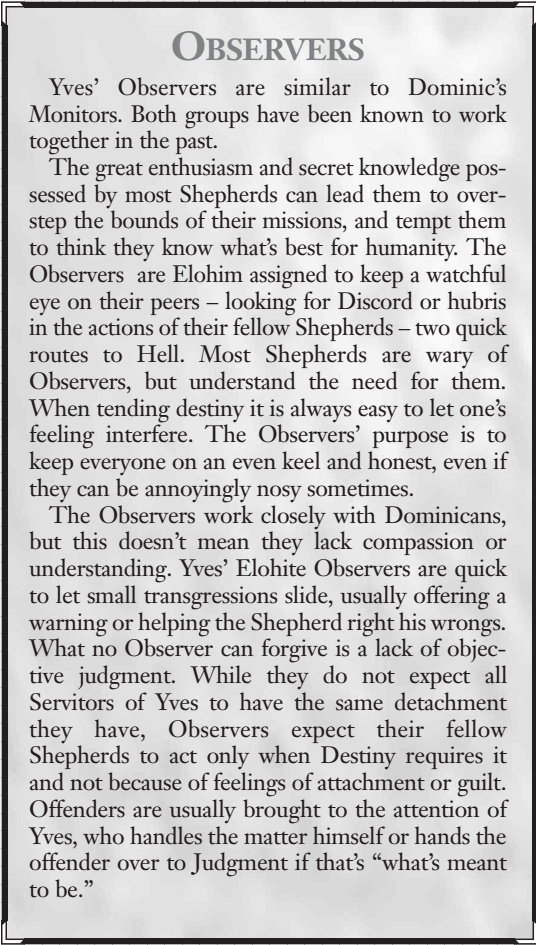
The Shepherds are friendly and open, if eccentric. They understand that everyone has a role, and so they try to be friendly with all angels. They work especially closely with Lightning, Trade, Judgment and Dreams. They are also known to have much love and respect for Fire, though some attribute this to Yves' guilt over that whole fiasco.
Yves understands that Judgment is required and that Dominic is vital. However, he also knows the danger and fate that lurk within Dominic. He made the ideas of right and wrong, after all, and knows that if one stares too deeply at the shadows, that's all one can see. Yves has tried to temper Dominic's fanaticism, teaching him patience and understanding. The angels of Yves do the same for the angels of Dominic, who have the same tendency to tunnel vision. The Dominicans tend to appreciate this - they hate a false judgment as much as any Shepherd hates accidentally pushing someone to their fate. This shared weight of responsibility makes Judges and Shepherds feel very close to each other, and they rarely dislike each other.
Now, adventure seeds! Most of these are terribly boring, except one. See, Khalid always knows who the Holiest Man in the World was, and as part of The Final Trumpet, he gave that information away, allowing the man (an Iranian accountant named Ahmad Khan Qavam) to be killed by hands not mortal, which is the second sign of the Apocalypse. The crisis passed, and now there's a new Holiest Man in the World.
Who is an atheist.
Miles Foster was raised by a wealthy East Coast family, but his parents died in a plane crash. At 22, he gave away nearly his entire estate to charity, keeping only enough to get through med school. After that, he joined Doctors Without Borders, and he works tirelessly to give free treatment to the poor. He is a true optimist with a deep faith in humanity, despite what he's seen. He is also a rationalist who believes in nothing without evidence, save for human nature being good. He holds that's more of a mindset than a belief. He admits that God can't be disproven, but God does not fit his worldview, and it'd be irrational to believe in Him without evidence. And, of course, if shown proof of the existence of angels and demons, he would be shattered. He'd not gain any faith in God - he'd lose faith in everything, convinced it was all pointless, with humans as helpless pawns jerked about by ineffable powers.
The seed is that Khalid has no fucking clue how to handle a Holiest Man In The World who is a secular humanist and an atheist.
The End
So - what's next? Superiors 4 (Secrets, Drugs, Greed, Theft, Technology), the GM's Guide (general overview of history and religions, among other things), Corporeal Player's Guide (Soldiers, Saints, Sorcerers), Revelations 1 (Metaplot) or Liber Canticorum (Songs)?